This is Essential Politics, our daily look at California political and government news. Here’s what we’re watching right now:
- Gov. Jerry Brown and Democratic legislators went to Concord Thursday to tout their transportation package, which they unveiled Wednesday at the state Capitol.
- Senate President pro Tem Kevin de León amended his “sanctuary state” bill Thursday morning to allow law enforcement to notify federal immigration officials about the release of violent felons.
- Sacramento County Sheriff Scott Jones hosted a community forum on immigration Tuesday, where the guest speaker was the acting director of U.S. Immigration and Customs Enforcement.
Be sure to follow us on Twitter for more, or subscribe to our free daily newsletter and the California Politics Podcast.
- Share via
New York Mayor Bill de Blasio visits the state Capitol after seeking some California gold -- at a political fundraiser
- Share via
Congressional candidate Arturo Carmona denies allegations of sexism leveled at him by former Sanders campaign staffers
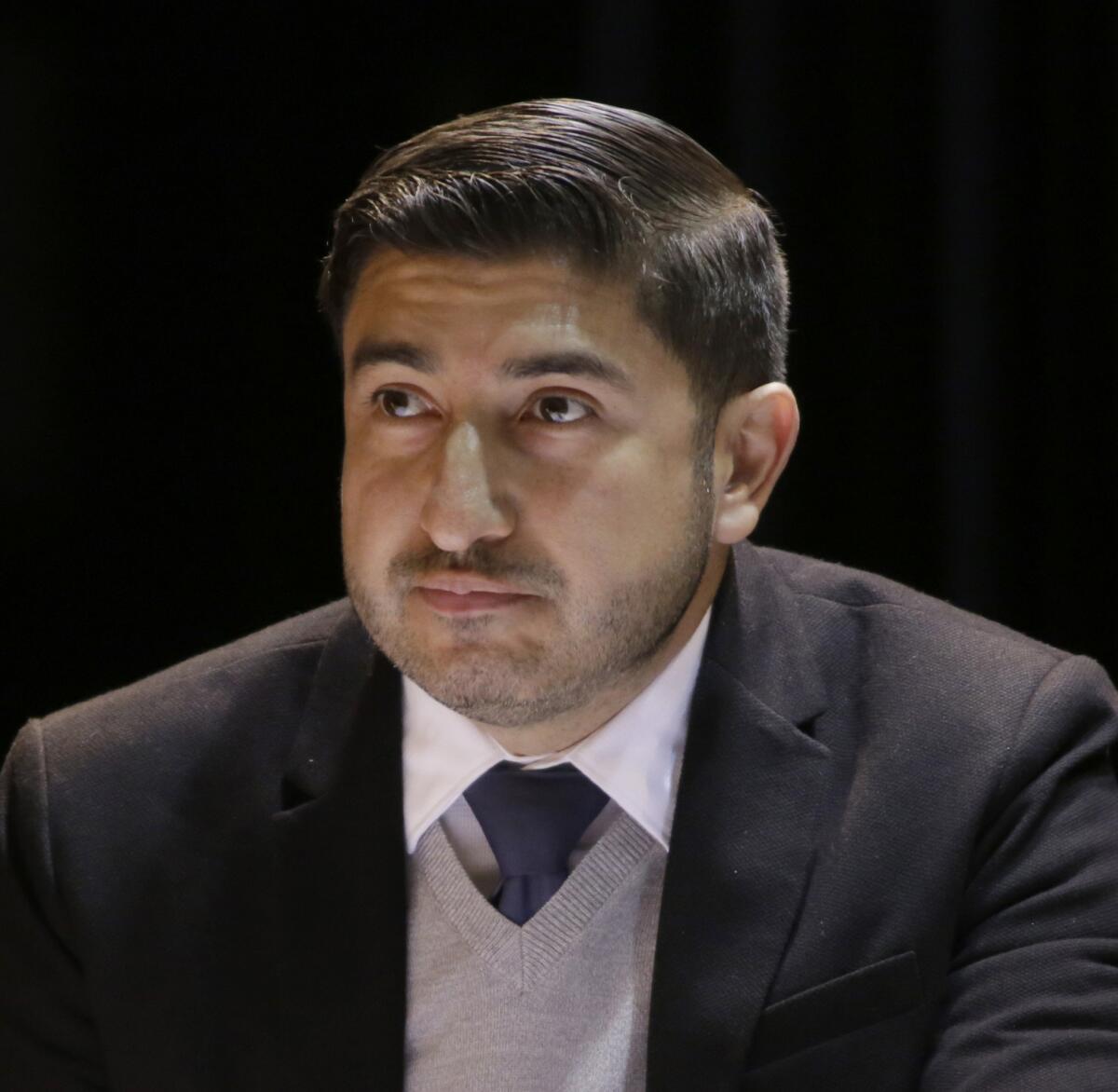
Congressional candidate and former Bernie Sanders campaign staffer Arturo Carmona denied accusations of sexism leveled at him Friday by a former staffer and backed up by two prominent Sanders surrogates.
Masha Mendieta, a former Latino outreach strategist for the Sanders presidential campaign, made multiple allegations against Carmona in a Medium post Friday, saying Carmona didn’t adequately address a complaint of sexual harassment, treated female staffers unfairly and was a poor manager who used campaign funds inappropriately.
Mendieta wrote that though working on the Sanders presidential campaign “gave me genuine hope that good souls were out there who respected and valued women equally ... Arturo Carmona was not one of them.”
In a statement to The Times late Friday, Carmona said, “I categorically deny any accusations of sexual harassment or fiscal mismanagement made against me. I do not take this lightly.”
Carmona, who is running in Tuesday’s 34th Congressional District election, added that he managed a “large and diverse staff” on the Sanders campaign and dealt with questions and criticism as they emerged.
“I’ve never shied away from hiring, working with or working under strong and capable women,” the statement continued. “I have always taken issues of harassment and equity in the workplace with the seriousness and sensitivity that they deserve.”
Carmona, who ran the Sanders campaign’s Latino outreach division before becoming its deputy political director last year, is one of two dozen candidates running in the special election. Sanders has not endorsed anyone in the race, but Carmona often references the “Bernie family” he worked with during the presidential primary.
It now appears some members of that family are turning against him.
After Mendieta published the allegations, two of Sanders’ most visible supporters — former Nevada state legislator and Sanders surrogate Lucy Flores and prominent immigration rights activist and former Sanders campaign staffer Erika Andiola — backed up Mendieta’s claims. (At least one other former campaign staffer, Giulianna Di Lauro, also affirmed Mendieta’s allegation about Carmona’s handling of a sexual harassment complaint.)
In a Facebook post, Andiola said Mendieta’s stories “are true” and added that a “huge” culture of sexism existed in his division, but she did not elaborate. Flores, who said she worked only tangentially with Carmona during the Sanders campaign, said she experienced his “demeaning and sexist ways” after she worked with him at another organization.
“I didn’t stop to think of the misery he had already caused for so many other women and the misery he would cause in the future. I didn’t stop to think that it wasn’t enough to just speak privately, but to also speak openly,” wrote Flores, who serves on the board of Our Revolution, the political group that Sanders helped start and Andiola now works for.
Mendieta, who says she is a voter in the district, has endorsed Sara Hernandez in the race, while Flores is backing Wendy Carrillo.
Carmona chalked up the accusations to a last-minute “smear campaign” by people supporting his opponents.
“It is very unfortunate that such important issues are currently being subject to political maneuvering,” he said in a statement.
Javier Gonzalez, Carmona’s campaign manager and another former Sanders campaign staffer, said he had heard about some of the allegations Mendieta raised and has “great respect” for Andiola, but he wishes she hadn’t aired her feelings so close to the election.
He called the accusations “serious” but said, “I don’t know what Arturo’s role was in any of that.”
“If you’re brothers and sisters, you deal with it in a friendly fashion, and you do it with honey,” Gonzalez said. “To smear someone at the last minute with a little bit of ‘he said, she said’ is not the way to do it.”
UPDATES
10:53 p.m.: This post was updated with additional details from Mendieta’s Medium post.
This post was originally published at 9:30 p.m.
- Share via
TV ads target lawmakers on the fence over Gov. Jerry Brown’s plan to raise gas taxes to repair roads
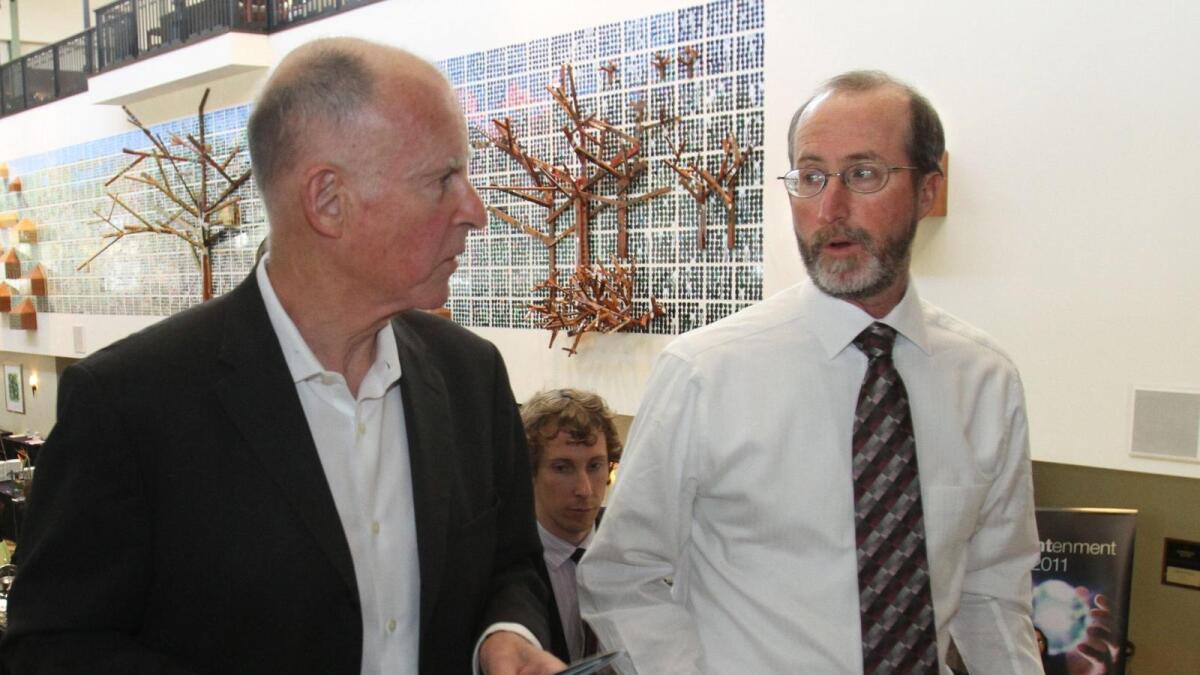
With supporters of a road repair bill still counting votes, a coalition of business and labor leaders on Friday began running television and radio ads that target eight legislators who have not yet committed to vote for the measure.
The Fix Our Roads Coalition is spending $1 million on a statewide, week-long ad blitz that urges legislators to vote next week for Senate Bill 1. The bill would raise gas taxes and vehicle fees to generate $52 billion the first 10 years to repair crumbling roads, highways and bridges, and expand mass transit.
“We are closer than ever to finally passing a transportation funding package to fix our long-neglected and crumbling roads,” said Michael Quigley, executive director of the California Alliance for Jobs, which is co-funding the commercials. “These new ads are part of an all-out grassroots, earned media, advertising and social media campaign to support passage of this bill by next week.”
In addition to ads that call on legislators to support the bill, eight advertisements call on legislators by name to support the plan.
Those targeted include Sens. Steve Glazer (D-Concord) and Anthony Cannella (R-Ceres), and moderate Democratic Assembly members Adam Gray of Merced, Rudy Salas of Bakersfield, Sabrina Cervantes of Corona, Sharon Quirk-Silva of Buena Park and Al Muratsuchi of Torrance, as well as Republican Catharine Baker of San Ramon.
The bill needs a two-thirds vote in both houses, which would require all of the Democrats to support the measure. Cannella and Baker are being wooed by Gov. Jerry Brown and legislative leaders to step in if one of the Democrats gets cold feet.
Representatives of Cannella and Glazer said earlier this week that they were still weighing the issue.
Brown and legislative leaders have called for the Legislature to act by Thursday, after which time the lawmakers head out on spring break.
- Share via
Former Assembly Speaker John A. Pérez’s views on the L.A. congressional race he dropped out of
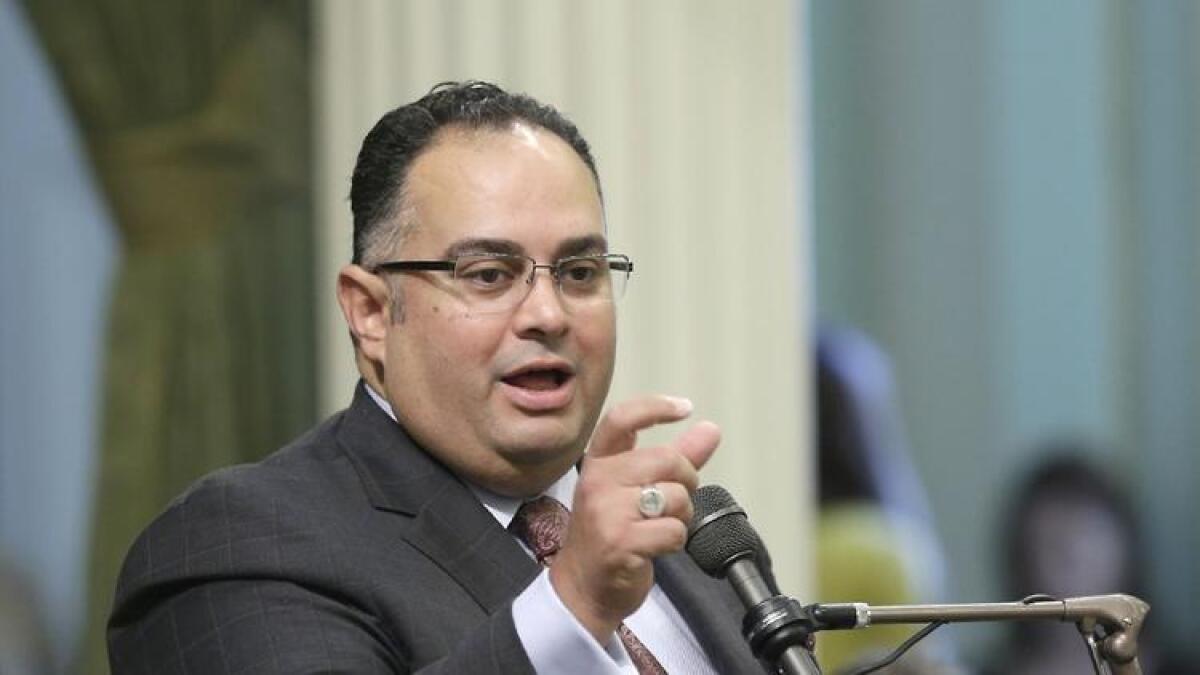
Before he suddenly dropped out of the running citing health reasons, former Assembly Speaker John A. Pérez was widely considered the favorite to replace Xavier Becerra in the 34th Congressional District.
With Pérez out, the race is wide open and isn’t likely to be decided Tuesday, when 24 candidates compete in the primary. Instead, the top two vote-getters regardless of party are expected to advance to a June 6 election. (If any one candidate receives more than 50% of the vote Tuesday, it’s all over).
Pérez offered his thoughts on the race in an interview published Friday by Politico. Some of his major points:
- Pérez said he thinks state Assemblyman Jimmy Gomez is “significantly ahead of the pack” and will make the runoff.
- A “cluster” of candidates, including Alejandra Campoverdi, Wendy Carrillo, Arturo Carmona, Maria Cabildo and Robert Lee Ahn, are in a close enough race that “any one of them” could advance.
- If Carrillo were to move forward, Perez says, the narrative in the runoff would be about which candidate is more progressive and who’s an insider versus an outsider.
- Perez says if he were the front runner, Campoverdi is “the one I’d be most concerned about running against” due to her connections in Washington and her national profile, which could create a “new level of viability.”
- Share via
To fight against human trafficking, this state senator wants to train motel employees to spot signs of abuse
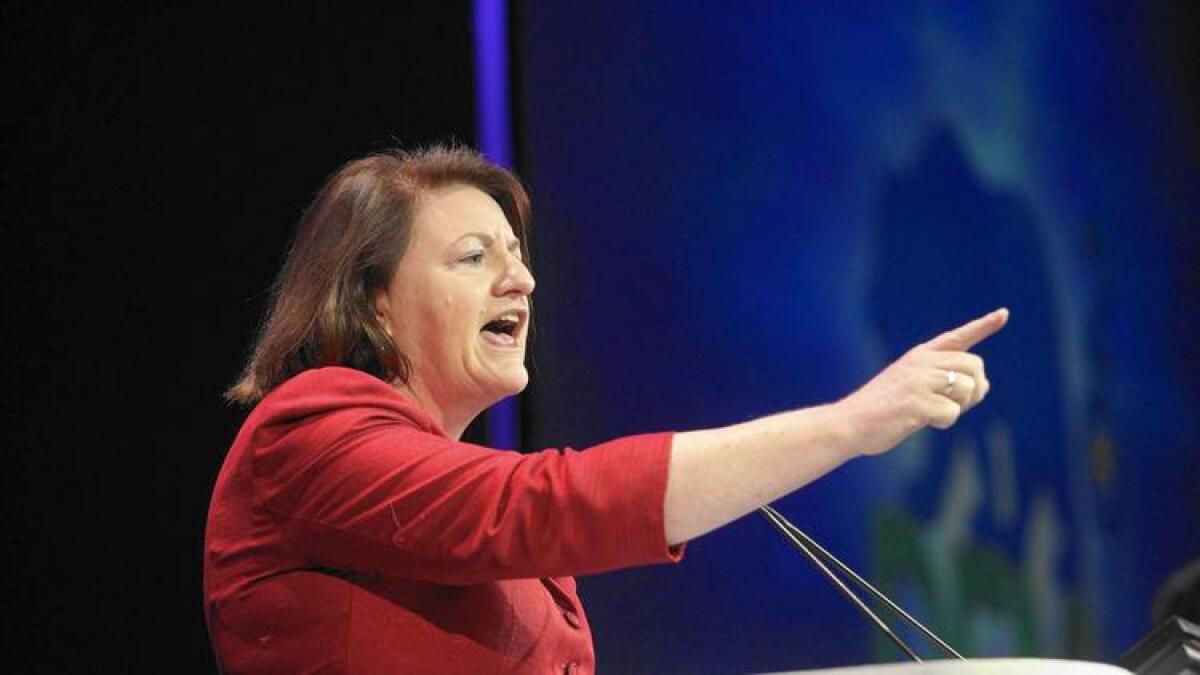
State Sen. Toni Atkins (D-San Diego) wants to increase services for human trafficking survivors and make it easier in court to put away their abusers.
Flanked by prosecutors and hotel industry officials at a news conference Friday in San Diego, the former Assembly speaker announced new housing and mental health assistance for victims and introduced legislation that would require hotels and motels to train their employees to spot signs of human trafficking.
Another of her proposals would expand the character evidence that prosecutors can bring forth at trial against defendants charged with selling victims for sex or labor.
The bills are meant to attack a multibillion-dollar trade that has a wide sweep in California, home to three cities on the FBI’s list of 13 top human trafficking destinations: San Diego, San Francisco and Los Angeles. National human trafficking hotline calls across California generated 1,323 cases in 2016 — nearly twice as many as any other state.
Atkins is among lawmakers pushing the issue at the Capitol, where legislation has focused on targeting traffickers, protecting victims and addressing what advocates say is a law enforcement culture in which child survivors sometimes are treated like criminals.
But funding for victims’ services and programs has been an obstacle. A bill by Atkins to develop pilot projects in three counties to address the commercial sexual exploitation of youth sailed through the Legislature without opposition last year only to be vetoed by the governor. Her second bill for a statewide task force died in the Senate appropriations committee.
Atkins’ latest proposal to provide training for motel employees follows a similar bill by Assemblywoman Cristina Garcia (D-Bell Gardens). It failed in the last legislative session amid opposition over costs to businesses.
That hasn’t stopped Atkins from trying again.
“Hotels are ground zero for sex trafficking in this state,” she said in a statement. “Sex traffickers are exploiting some of the most vulnerable people in our society, including children. These victims are often hiding in plain sight, and traffickers take advantage of the fact that many hotel employees don’t recognize the signs.”
- Share via
In L.A. congressional race, 75% of the money went to 5 candidates
The latest fundraising figures for the 34th Congressional District race are in, and they give a fuller picture of where the money has been flowing in the April 4 special election.
While there are 24 candidates in the crowded field, three-quarters of the campaign contributions have gone to just five candidates: Assemblyman Jimmy Gomez, Sara Hernandez, Robert Ahn, Alejandra Campoverdi and Yolie Flores.
And with so many hopefuls vying for donors in a district with a median household income of $35,181, a lot of the campaign cash came from outside the 34th District. More than 80% of contributions where a ZIP code was disclosed came from areas outside the district, which includes Koreatown, downtown Los Angeles, Chinatown, Highland Park, Eagle Rock and Boyle Heights.
- Share via
State Controller Betty Yee says California’s tax collection agency has been mismanaged and needs a complete overhaul
Citing a review that found widespread mismanagement at the state Board of Equalization, State Controller Betty T. Yee on Friday called for stripping the panel of responsibilities for tax administration and audit and compliance functions so it can focus on handling taxpayer appeals.
Yee’s proposal came in response to an evaluation by the state Department of Finance that found board officials were improperly redirecting resources and employees to pet projects in their districts.
“In order to rebuild taxpayer trust, meaningful reform is essential,” said Yee, who serves as an ex-officio member of the board. “I urge the Legislature and the governor to strip the board members of all statutory functions and permanently move these duties and assigned staff to a separate new department under the governor.”
The Department of Finance review found the board “had difficulty providing complete and accurate documentation” in response to inquiries, and “various levels of management were not aware of and could not speak to” certain actions, including the informal establishment of a call center, creating an unofficial office location and inconsistent use of community liaisons.
The evaluation said personnel records showed workers assigned to administrative jobs that they were not doing, having been transferred to help board members in their districts.
Even though each elected board member has a $1.5-million budget to cover office costs, some members borrowed workers from the head office, taking them from jobs that involved bringing in tax money and having them instead reach out to board members’ constituents, the review found.
The redirection of workers violated state budget rules.
In addition, the reviewers said the board “provided 11 different versions of its proposed sales and use tax allocation adjustment” and the Department of Finance found errors and omissions throughout.
- Share via
Sen. Kamala Harris has opened a gubernatorial fundraising account — but she has no plans to run for governor, aide says
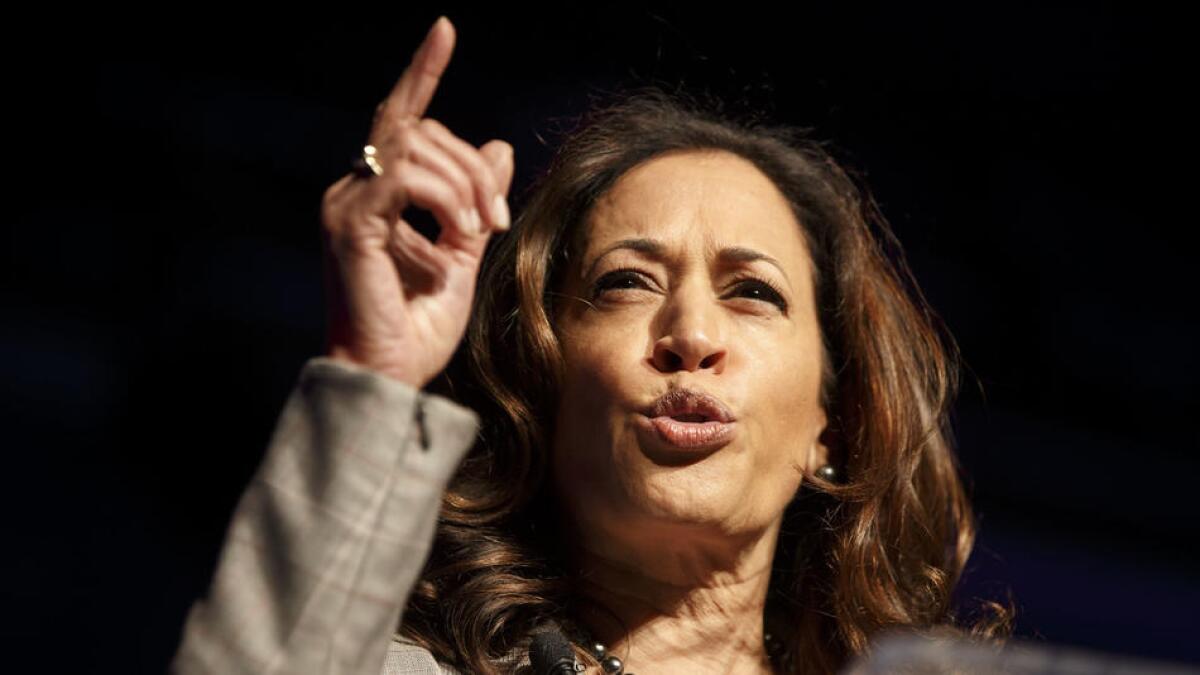
Sen. Kamala Harris opened a campaign fundraising account to run for governor in 2026, but that does not mean California’s newest U.S. senator has any plans to seek the office.
Harris plans to use the account to store the $1 million in leftover funds from her successful 2014 reelection campaign for attorney general, said Sean Clegg, Harris’ political spokesman.
Harris left her post as state attorney general mid-term when she was elected in November to the Senate seat opening created by the retirement of Barbara Boxer.
She faced a March 31 deadline to shutter the attorney general account, and under election law cannot mingle money raised for state campaigns with funds raised to run for federal office.
“It’s purely political bookkeeping,” Clegg said.
The 2026 date could raise eyebrows because after the 2018 gubernatorial election, that will likely be the next time the governor’s office is open because its occupant is termed out.
But Clegg said Harris did not open an account for a lower office like lieutenant governor — as politicians in similar situations typically do — because, he said, “we weren’t interested in being cute about it.”
“So we designated the only potential future office one could conceivably contemplate, although we’re not contemplating it,” he said. “We’re focused on the job we’re doing.”
- Share via
This California lawmaker wants to crack down on toys and electronics that pick up conversations and personal information
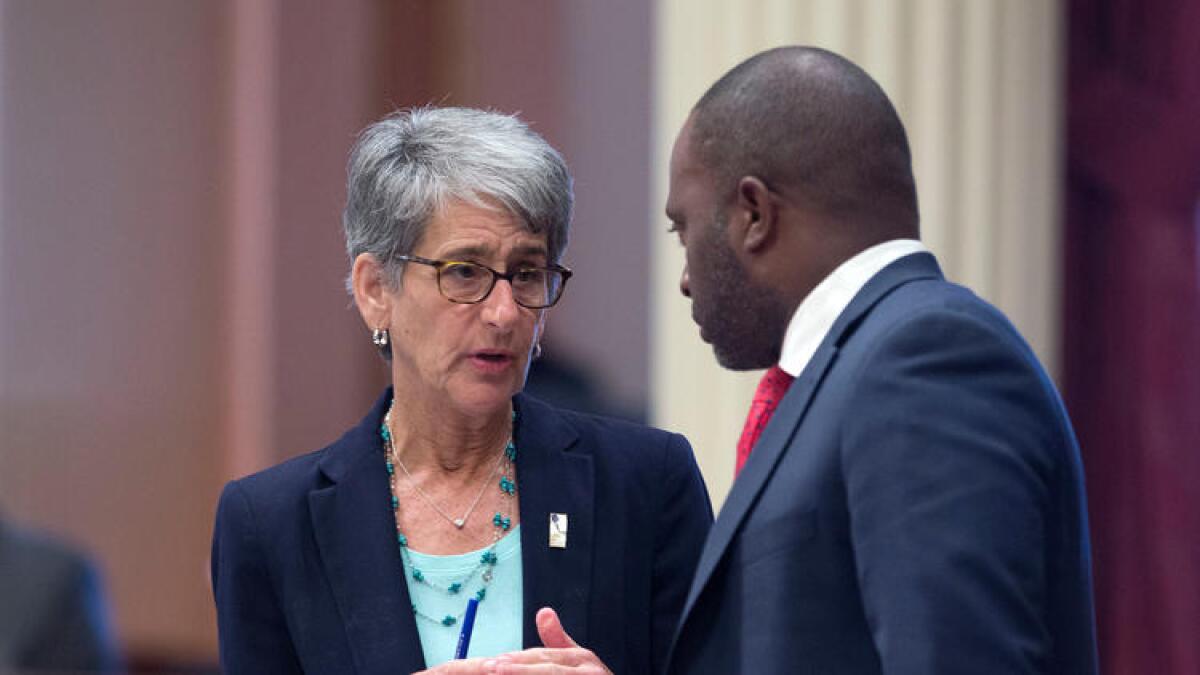
A California state senator wants to prevent companies from selling products that can listen in on conversations and collect personal information from unknowing consumers.
Sen. Hannah-Beth Jackson (D-Santa Barbara) has filed legislation that would require manufacturers to equip their Internet-connected devices, including toys, clocks, kitchenware and electronics, with certain security and privacy features.
Dubbed the Teddy Bear and Toaster Act, Senate Bill 327 takes aim at the so-called “Internet of Things,” the inter-networking of everyday devices that some tech and privacy experts say amounts to a growing industry with little oversight.
“The more we know and the more we learn about the Internet connection of all sorts of devices, many are realizing that we don’t know the extent to which these devices are invading our lives,” Jackson said.
Under her proposal, companies would have to design their products so that they alert consumers — through visual, auditory or other cues — when they are gathering data. They would have to obtain user consent when they intend to transfer the information. And they would have to disclose at point of sale whether the devices are capable of sweeping up sensitive data, so that customers can take that into account while shopping.
Most states, including California, have privacy breach laws to protect personal information. The proposal, which would extend those provisions to consumer devices, could be the first of its kind nationwide. But it is expected to garner wide opposition from retailers and manufacturers.

Still, supporters point to growing privacy concerns. Some toys, like the My Friend Cayla doll banned in Germany, prompt children to give personal information, such as their parents’ names and their addresses, and their manufacturers reserve the right to target young buyers in direct marketing campaigns. Other “smart” devices lack the most basic security features that make them vulnerable to a hack or coordinated cyberattack.
In a statement, James P. Steyer, CEO of Common Sense Kids Action, which is sponsoring the bill, said such toys and electronics can put consumers at risk.
“These products get rushed out to the market without the privacy issues being addressed in advance, and then consumers end up paying the price,” he said.
- Share via
President Jerry Brown? ‘Don’t rule it out,’ governor quips
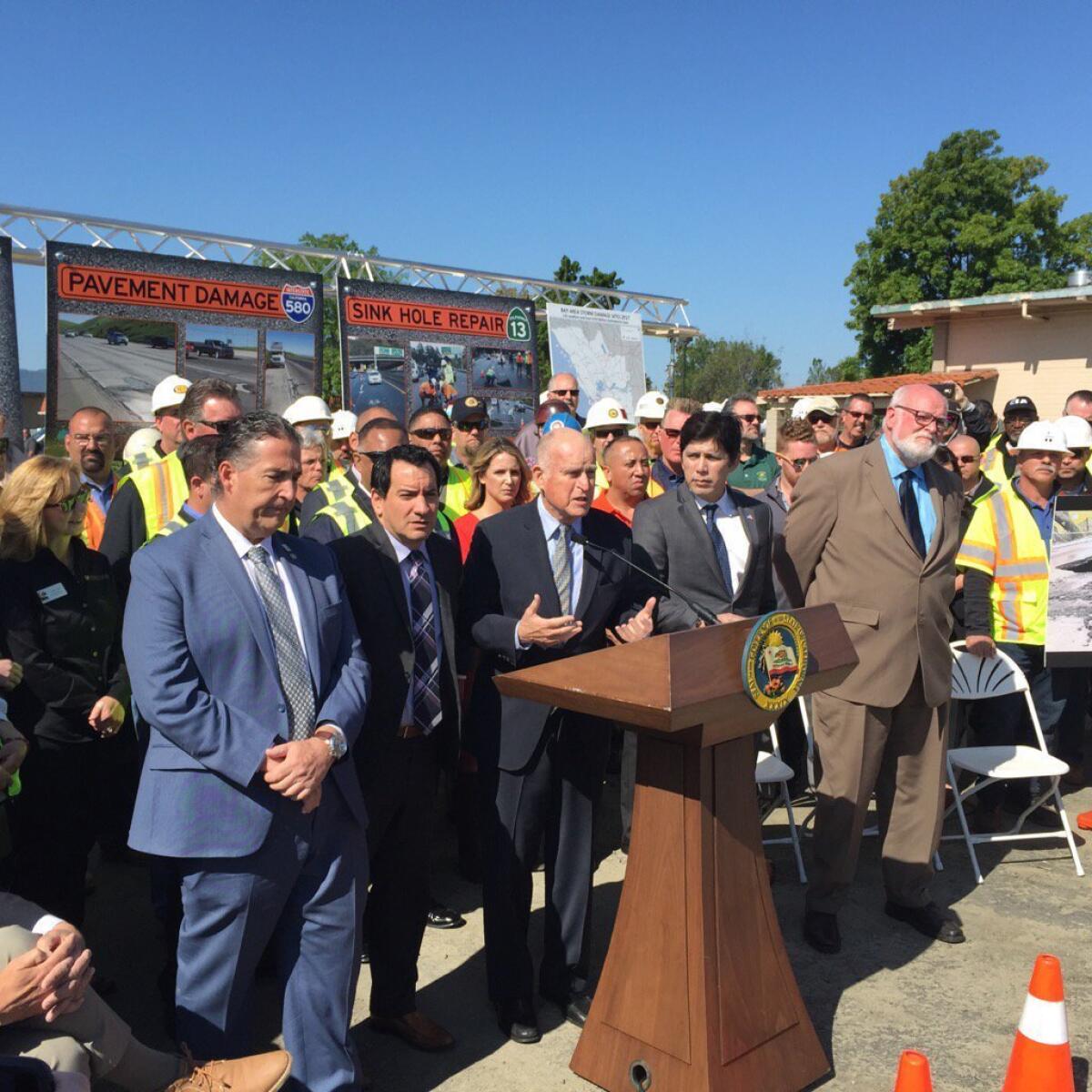
In arguing for approval of a new transportation package on Thursday, Gov. Jerry Brown appeared to enjoy himself in refusing to shoot down a supporter’s suggestion that he run for president — even as he noted his 79th birthday is next week.
Standing next to other elected officials and construction workers at the rally in in Concord, Brown argued that gas tax and vehicle fee increases are needed to address a backlog of much-needed repairs to California’s crumbling system of roads, highways and bridges.
“I’m telling you the truth because why would I lie to you?” Brown said. “I don’t think I’m running for office. All I’ve got left is lieutenant governor, treasurer and controller.”
“Or president,” someone in the crowd shouted.
Brown responded that he would be 82 when the next presidential election comes around.
“But you know, don’t rule it out,” he quipped, drawing laughter and applause.
Lest the comment turn into a national story, an aide later clarified the governor’s intentions: “He was joking.”
- Share via
Rep. Jerry McNerney endorses Tracy Van Houten in 34th District
- Share via
Gov. Jerry Brown is making appeals to legislators for votes on his new transportation plan — one district at a time
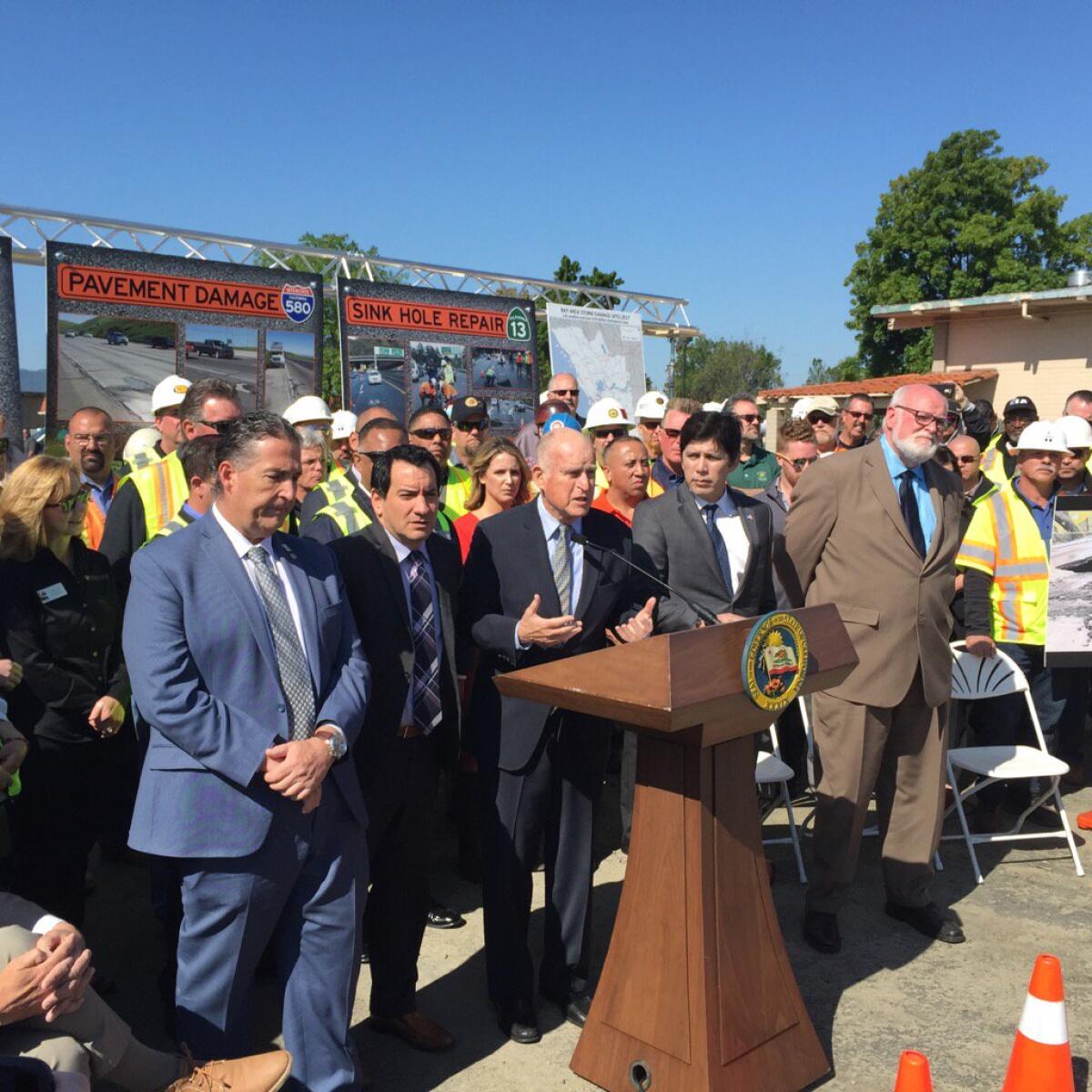
Gov. Jerry Brown and legislative leaders on Thursday took their campaign for higher transportation taxes and fees to the Bay Area district of state Sen. Steve Glazer (D-Concord), one of the holdouts in the state Senate who has not yet committed to vote for the package.
Surrounded by dozens of construction workers, Brown warned that if the transportation bill unveiled on Wednesday isn’t approved this year, it may not happen in the foreseeable future.
“There is nothing more fundamental in the business of government than making sure the roads and bridges don’t fall apart, and they are falling apart,” Brown said.
Glazer recently withheld his vote from a bill proposing a similar plan for repairing state bridges, roads and highways, and on Wednesday, a spokesman said he had still not committed to any plan but wanted to review the detailed proposal before taking a position.
Construction workers at the rally held signs that pictured crumbling roads and said, “Senator Glazer Fix This Now. Vote for SB 1.”
Brown said Glazer, his former senior advisor, does not disagree with the intent of the bill.
“He loves this plan, but he has another idea on his mind and he wants to marry the two and see if he can get some outcomes that I don’t want to get into at this particular place,” Brown told reporters.
Sen. Jim Beall, chairman of the Senate Transportation Committee, said Glazer wants the transportation funding bill to include a clause barring employees of Bay Area Rapid Transit from going on strike.
Beall said that is a labor-relations issue that cannot be included in the bill raising taxes.
“You can’t do that,” Beall said.
A spokesman for Glazer said the senator is still undecided on the bill. “The senator is continuing to have conversations with the principals,” said Steve Harmon, a spokesman for Glazer. He declined to comment on Beall’s statement.
Assembly Speaker Anthony Rendon (D-Paramount) said there may be similar rallies in Los Angeles and Riverside in the coming days. Two other Democrats who have not yet committed to the plan are Riverside Sen. Richard Roth and Woodland Hills Sen. Henry Stern.
Brown acknowledged that there is work to do to secure the two-thirds vote needed in both houses of the Legislature to raise the base excise tax on gasoline by 12 cents per gallon, to a total of 30 cents per gallon, and to create a new annual vehicle fee that would average $51 based on the value of the car or truck.
Rendon said approval of the transportation bill would cost the average California motorist an extra $10 per month, which he said is a deal compared to the current cost of $720 in annual vehicle repair costs required because of running over potholes and other rough road conditions.
Hoping to force a Senate vote on the package early next week, Brown was accompanied to the Concord news conference by Rendon and Senate President Pro Tem Kevin de León (D-Los Angeles). They urged lawmakers to support the bill, which would generate $5.2 billion annually for the first 10 years for road and bridge repairs, mass transit improvements and other projects to reduce congestion.
Glazer, known as a maverick in the Legislature, was Brown’s campaign manager during the 2010 gubernatorial election and remained a senior advisor to the governor before running for the state Senate in a special election in 2015.
----
1:23 p.m.: This article was updated with a statement from a representative for state Sen. Steve Glazer.
This article was originally published at 12:42 p.m.
- Share via
Who will be California’s next governor? New poll shows Newsom leads with 1 in 3 voters undecided
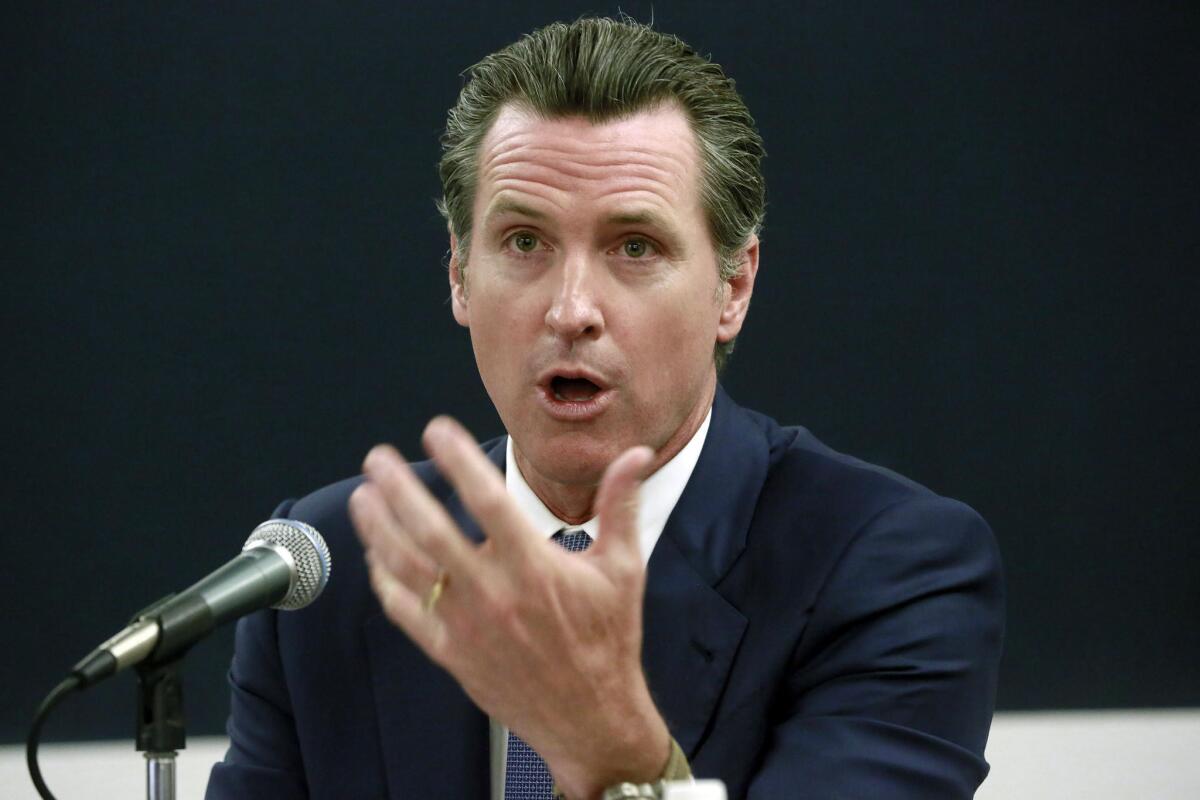
In the race to replace termed-out Gov. Jerry Brown, the largest number of voters in a new statewide poll does not favor a candidate in the race. About 1 in 3 voters said they were undecided, according to the survey by the UC Berkeley Institute of Governmental Studies.
Among candidates who have entered the race, Lt. Gov. Gavin Newsom holds a strong lead with 28% of the vote, followed by Republican businessman John Cox with 18%, according to the poll, which was released Wednesday. Former Los Angeles Mayor Antonio Villaraigosa clocks in at 11%, state Treasurer John Chiang at 8% and former state schools chief Delaine Eastin at 3%.
Because the race is far away and public campaigning has not yet started in earnest, the poll could primarily be an indicator of name recognition. The field of candidates is also likely to grow.
Newsom has several natural advantages: He was the first person to enter the race in 2015 and has a large fundraising edge. He has perhaps been the candidate most in the spotlight among the Democrats running, notably for his support of the marijuana legalization measure on the November ballot.
Cox may have benefited from being the lone Republican in that version of the poll.
Pollsters conducted a second version of the poll with five additional potential candidates, none of whom have announced a run for governor in 2018 — San Diego Mayor Kevin Faulconer, Los Angeles Mayor Eric Garcetti, billionaire environmentalist Tom Steyer, California Senate President Pro Tem Kevin de León and former state Controller Steve Westly.
Newsom still led the pack to come in at 24%. The two Republicans, Faulconer and Cox, tied at 11% each. Faulconer has said he does not plan to run for governor.
Garcetti, Villaraigosa, Chiang, Steyer, De León, Westly and Eastin all placed in the single digits.
Steyer and Westly have the personal wealth to self-fund a campaign, giving them time to decide whether to enter the race. Westly unsuccessfully ran for governor in 2006, losing in the Democratic primary to state Treasurer Phil Angelides.
In the 2018 contest, the two candidates who receive the most votes in the June primary will move onto the November general election.
The poll of 1,000 registered voters in California was conducted online in English and Spanish between March 13 and 20, and has a margin of error in either direction of 3.6%.
- Share via
California legislators team up to expand John Muir National Historic Site
California’s senators and Rep. Mark DeSaulnier (D-Concord) filed legislation Thursday to add 44 acres to the John Muir National Historic Site.
The John Muir Heritage Land Trust has offered to donate the additional land to the National Park Service, which operates the site, and the bill would authorize the agency to accept the parcel.
“The time John Muir spent with his daughters at their scenic home and its neighboring property played a major role in launching the national parks movement. Expanding the existing park to preserve more of this history and beauty is a fitting tribute to Muir’s legacy of protecting land for all to enjoy,” Sen. Dianne Feinstein (D-Calif.) said in a statement.
Located about 30 miles east of San Francisco, the John Muir National Historic Site consists of Muir’s Alhambra Valley home and 325 acres outside of Martinez.
DeSaulnier said in a statement that expanding the property is a “fitting celebration of his legacy, and will offer nature-goers greater access to enjoy the beauty of the East Bay.”
DeSaulnier sponsored the same bill last year, which passed the House unanimously but was not considered by the Senate. Feinstein and former Sen. Barbara Boxer (D-Calif.) carried the Senate version, which died after a committee hearing. Such bills often take a few attempts to pass, even without major opposition.
Muir’s writings helped inspire the creation of the National Park Service, starting with his lobbying of Congress to protect the Yosemite Valley from dams. He also was a founding member of the Sierra Club.
“Californians owe him a debt of gratitude,” Sen. Kamala Harris (D-Calif.) said in a statement.
- Share via
California’s attorney general could investigate local police shootings under new legislation
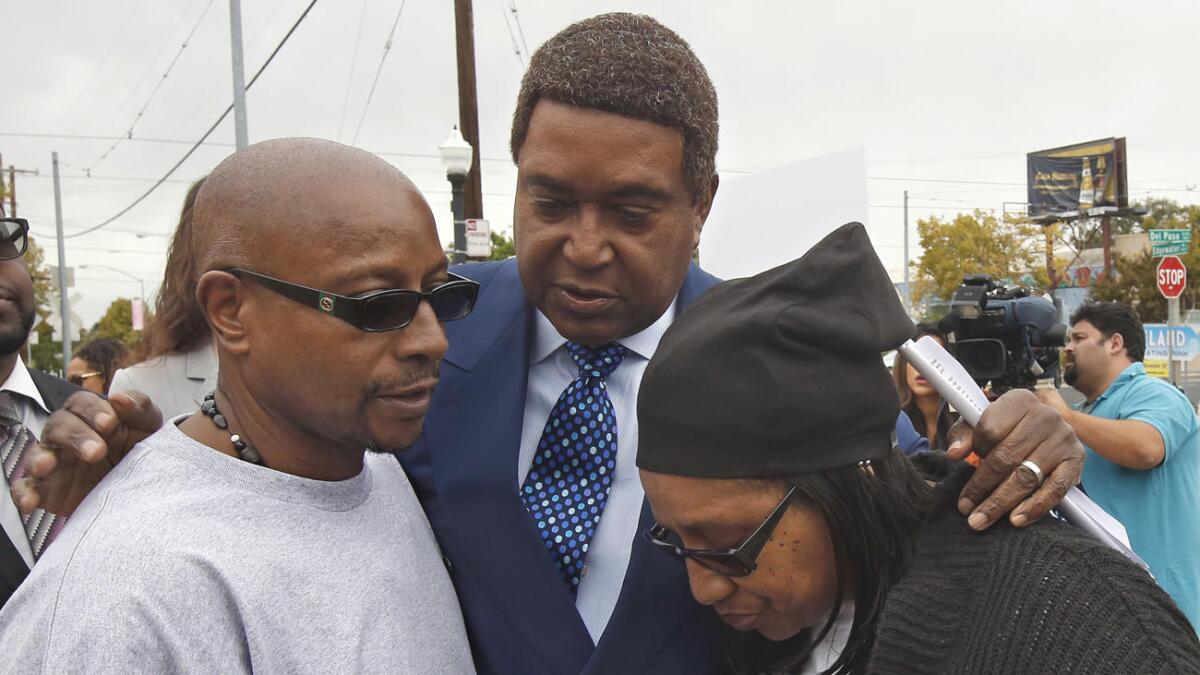
California’s attorney general could investigate local police shootings under a new bill authored by a Sacramento lawmaker.
Democratic Assemblyman Kevin McCarty’s Assembly Bill 284 would allow local police departments or district attorneys to ask Atty. Gen. Xavier Beccera’s office to independently investigate police shootings of civilians.
The legislation was prompted by high-profile police killings of Michael Brown in Ferguson, Mo., Eric Garner in New York City and last summer’s police shooting of Joseph Mann, a mentally ill homeless man, in Sacramento, according to McCarty’s office. In all three cases, local prosecutors declined to charge the officers.
“There is a growing skepticism and a perceived conflict of interest, of the current process of local district attorneys investigating local police,” said a fact sheet on the bill provided by McCarty’s office. “Given that they work so closely, it is a valid question of whether this is the most transparent process for the public. There is a growing appetite, both at the national and local level, to create a better and more transparent system for [police shootings] that is fair to police, families, and the community in order to restore public trust.”
McCarty’s bill would make state investigations voluntary in these cases and would be implemented only if lawmakers also give Beccera’s office money to pay for the effort.
In 2015, McCarty tried to pass legislation that would have made state investigations of local police shootings mandatory, but that bill failed to make it out of legislative committees. This year, lawmakers have generally scaled back prior efforts to change the state’s rules governing police discipline and transparency.
- Share via
Former offenders will help award millions in Proposition 47 grants to rehabilitate inmates

California officials will begin the process this spring of awarding $103 million in grants to programs for inmates centered on rehabilitation, substance abuse and reentry into society.
The efforts will be funded with dollars saved from prison spending under Proposition 47, the sweeping 2014 ballot measure that downgraded six drug and theft crimes to misdemeanors and allowed defendants to renegotiate their punishments.
For the large coalition of criminal justice advocates that poured millions into getting the proposition passed and that has closely tracked its implementation, this is a long-awaited step. Other states have passed similar laws, but California is the only state to invest those savings into services meant to help people stay out of prison.
On the executive committee helping award the grants are formerly incarcerated people who know the system from the inside.
- Share via
What would single-payer healthcare look like in California? Lawmakers release new details
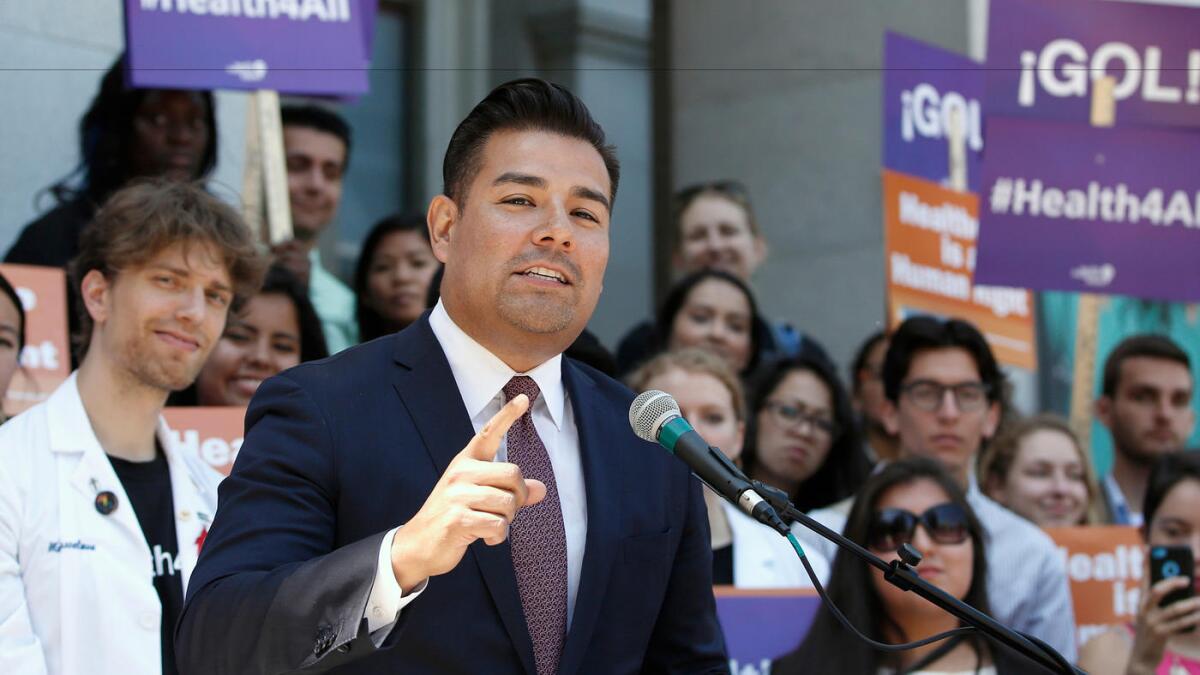
A proposal in California for a single-payer healthcare system would dramatically expand the state government’s presence in medical care and slash the role of insurance companies.
New amendments released Thursday fill in some key details on the universal healthcare measure proposed by state Sens. Ricardo Lara (D-Bell Gardens) and Toni Atkins (D-San Diego), although the biggest political question — how it would be paid for — remains unanswered.
Under the proposal, which was announced in February, the state would cover all medical expenses for every resident regardless of their income or immigration status, including inpatient, outpatient, emergency services, dental, vision, mental health and nursing home care.
Insurers would be prohibited from offering benefits that cover the same services as the state.
The program would eliminate co-pays and deductibles, and patients would not need to get referrals to see eligible providers. The system would be administered by an unpaid nine-person board appointed by the governor and the Legislature.
A universal healthcare system run by the government has long been a dream of liberals, with many rallying behind insurgent Democratic presidential candidate Bernie Sanders’ proposal for “Medicare for all” in the 2016 race.
After a GOP effort to replace Obamacare stalled last week, Sanders said he intends to introduce a nationwide single-payer bill in the U.S. Senate.
Proponents in California, who are no longer playing defense to preserve the Affordable Care Act, also touted a broader healthcare plan.
“With Republicans’ failure to repeal the Affordable Care Act, Californians really get what is at stake with their healthcare,” Lara said in a statement. “We have the chance to make universal healthcare a reality now. It’s time to talk about how we get to healthcare for all that covers more and costs less.”
The cost — sure to be the biggest hurdle for the measure — so far remains unknown. The authors say they intend to pay for the program through “broad-based revenue,” but details of a funding proposal have not been hashed out.
Gov. Jerry Brown sounded wary of a sprawling single-payer plan while speaking to reporters last week on his trip to Washington D.C.
“Where do you get the extra money? This is the whole question,” Brown said.
The bill is sponsored by the California Nurses Assn., which already has been rallying its members in support of the bill, SB 562.
“There has been a seismic shift in our political system through grassroots activism; we have an inspired, motivated base that will make its voice heard,” RoseAnn DeMoro, the labor group’s president, said in a statement.
- Share via
New amendments to ‘sanctuary state’ bill will allow police and sheriffs to contact ICE about violent felons
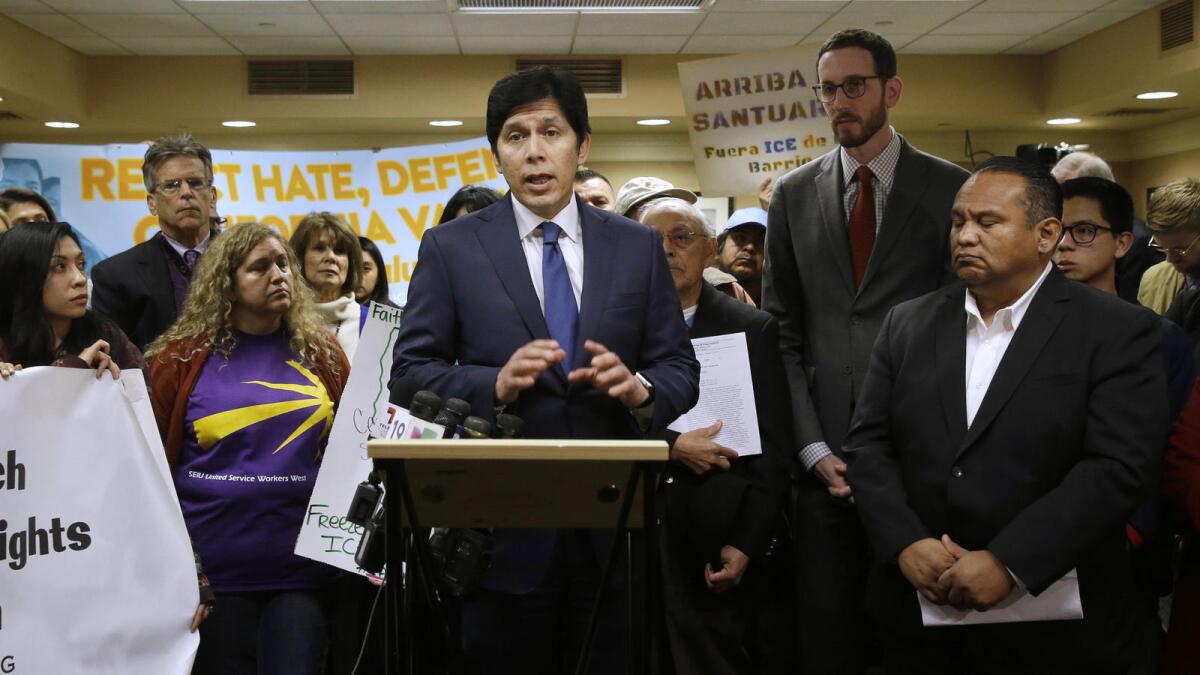
California Senate leader Kevin de León has amended his “sanctuary state” bill to provide greater flexibility for law enforcement to notify and work with federal immigration officials on cases involving serious and violent felons.
The move, amid national debate over “sanctuary city” policies, comes days after a rowdy welcome in Sacramento for the acting director of Immigration and Customs Enforcement at a forum meant to address the role of police officers and sheriff’s deputies in immigration enforcement.
Senate Bill 54 is at the center of a legislative package that Democratic lawmakers say is meant to extend protections for immigrants under the expanded deportation priorities of the Trump administration. It would prohibit state and local law enforcement agencies — including school police and security — from using resources to investigate, detain, report or arrest people for immigration enforcement.
New amendments to the bill added Thursday would allow sheriff’s deputies to report the release dates of serious and violent felons to ICE. The changes also clarified the language of the bill to allow state and local law enforcement agencies to participate in task forces, even when immigration enforcement becomes an element of the investigation.
And under the amended bill, law enforcement officers would be able to notify ICE if they come into contact with a person who previously has been deported and has a violent felony record.
De León previously had kept from making distinctions for immigrants charged or convicted of felonies, urging Republican lawmakers to move away from Trump’s rhetoric, which he said stereotyped immigrants as criminals.
But tensions over the bill have flared as some sheriff’s officials across the state have denounced it, and as local law enforcement officials say its provisions could hinder their participation in task forces involving federal immigration agencies.
11:30 a.m.: This article was updated to correct the time the amendments were published. They were printed early Thursday.
This article was originally published at 8:18 a.m.
.
- Share via
Should California have a state dinosaur? This Santa Monica assemblyman thinks so
Soon California might have what it’s lacked for millions of years: an official state dinosaur.
Assemblyman Richard Bloom (D-Santa Monica) has introduced a bill to make the Augustynolophus morissi — a duck-billed dinosaur that 66 million years ago roamed what is now California — the state’s official dinosaur.
- Share via
California backs San Francisco court challenge of Trump administration threat to withhold funds from ‘sanctuary cities’
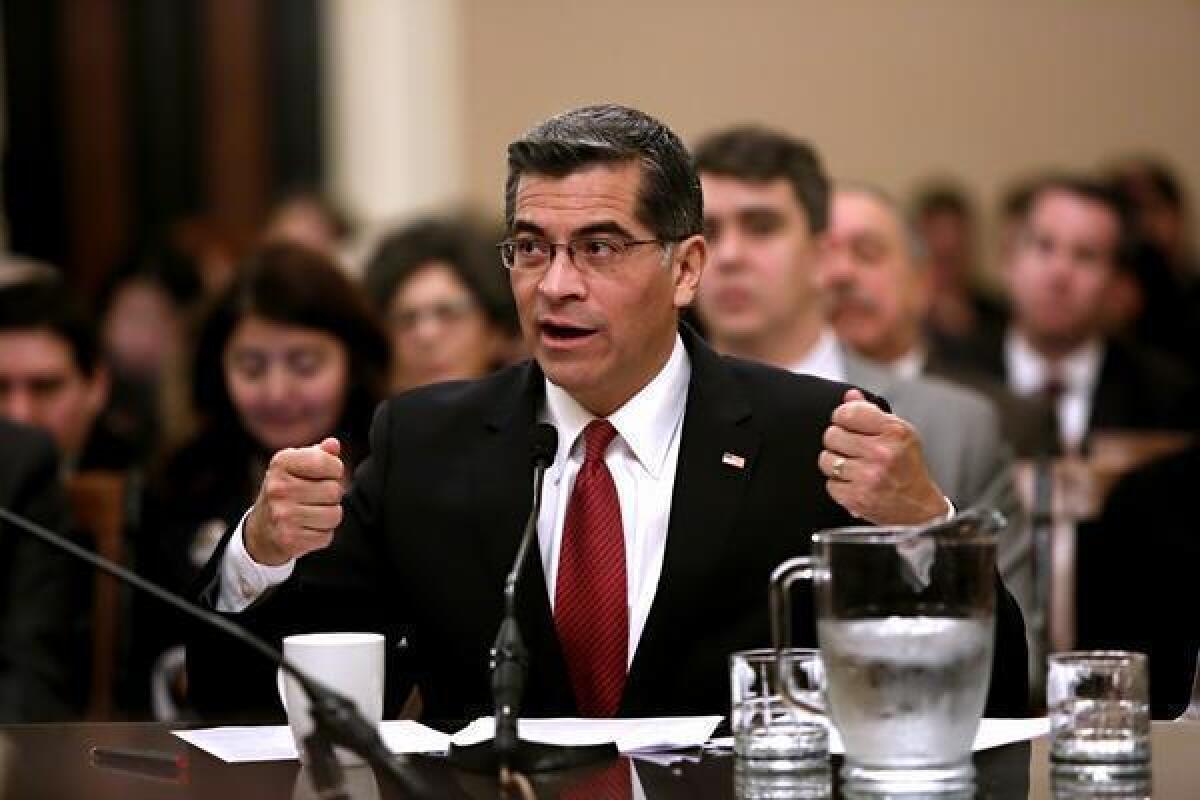
Atty. Gen. Xavier Becerra said Wednesday he has filed an amicus brief supporting San Francisco’s court challenge to President Trump’s order targeting so-called sanctuary cities and counties that refuse to enforce federal immigration laws.
The move marks a half-dozen times the state has filed briefs supporting legal challenges to various Trump orders. Last week, Becerra filed papers supporting a lawsuit by Santa Clara County.
That case and San Francisco’s challenge the legality of the Trump administration’s threats to withhold federal funds from states and local jurisdictions that the administration deems to be “sanctuary jurisdictions.”
Becerra’s brief cites California’s interest in protecting state laws and policies that ensure public safety and protect the constitutional rights of its residents.
“Threatening to take away resources from sheriffs and police officers in order to promote misguided views on federal immigration policy is reckless and puts public safety at risk,” Becerra said in a statement. “It is the right and responsibility of California and each state under the Constitution to determine how it will provide for the safety and general welfare of its residents and to safeguard their constitutional rights.”
- Share via
Los Angeles Mayor Eric Garcetti asks the federal government to define a ‘sanctuary city’
Amid a new call from the Trump administration to cut off federal funds to so-called sanctuary cities, Los Angeles Mayor Eric Garcetti and LAPD Chief Charlie Beck had a question for the head of Homeland Security on Wednesday: What exactly is a sanctuary city?
Garcetti and Beck joined a bipartisan handful of mayors and law enforcement leaders from across the country in Washington to air their concerns about President Trump’s recent executive orders on immigration to Homeland Security Secretary John F. Kelly.
Los Angeles is among the jurisdictions — often called sanctuary cities — that don’t assist with federal immigration enforcement. State and local leaders in California have said they will continue to protect people in the country illegally despite the Trump administration’s threats.
After the closed-door meeting, mayors and police chiefs said their main request for Kelly was for a firm definition of what the federal government considers a sanctuary city.
“We think that as long as we’re complying with federal law then we shouldn’t be labeled with whatever label intimates that we’re not,” Beck said. “We’re looking for clarification; we are looking to be involved in the conversation so that decisions aren’t made that affect us without our input.”
Homeland Security spokesman Dave Lapan said the department is working on a definition but does not have a timeline for when it would be finalized.
Although there is no legal definition of the term, the administration has seemed to define sanctuary jurisdictions as ones that don’t comply when Immigration and Customs Enforcement asks them to detain prisoners after they have served their sentences so they can be picked up for deportation.
Multiple federal courts have said the detainer orders differ from an official warrant and are not legal justification for holding someone who has served his or her sentence or is no longer under arrest.
Los Angeles is one of several cities in California that does not hold people for immigration officials without a warrant, and Garcetti said that is going to continue.
“We see it as abiding by the Constitution, because there is case law that says we can’t hold people for longer than permitted,” Garcetti said after the meeting.
Lapan said the Department of Homeland Security is working on ways to address concerns about the legality of holding someone for immigration officials, as well as the concerns of mayors of cities that have laws instructing law enforcement officers not to comply with immigration officials.
“Part of having this discussion is to find out, ‘How can we get around this?’” Lapan said. “If we are dealing with a criminal alien, somebody who is both in the country unlawfully and has committed crimes, the best place for us to take them into custody is in a jail or prison. That’s the safest for everyone, both our officers and the communities.”
Garcetti also disputes the administration’s assertion that it can withhold federal funds from cities that don’t comply with ICE orders. Garcetti pointed to a 2012 Supreme Court decision that said the government couldn’t withhold Medicaid funds if states chose not to expand access to the program under the Affordable Care Act.
“I think we all feel on very strong constitutional and legal footing that it was decided in the Obama administration you can’t put a legal gun to the head, a financial gun to the head of jurisdictions, whether it’s states or localities, and take their money if you don’t agree with what they are doing in a different area,” he said.
Garcetti invited Kelly to visit Los Angeles. “We need to make sure that we also are showing the perspectives of everyday people in cities like Los Angeles,” he said.
Garcetti also attended California congressional Democrats’ weekly lunch and met privately with House Minority Leader Nancy Pelosi (D-San Francisco) and House Majority Leader Kevin McCarthy (R-Bakersfield) before appearing on an immigration panel hosted by House Democrats.
- Share via
Anti-discrimination measure or blow to religious freedom? California bill sparks debate on employer codes of conduct
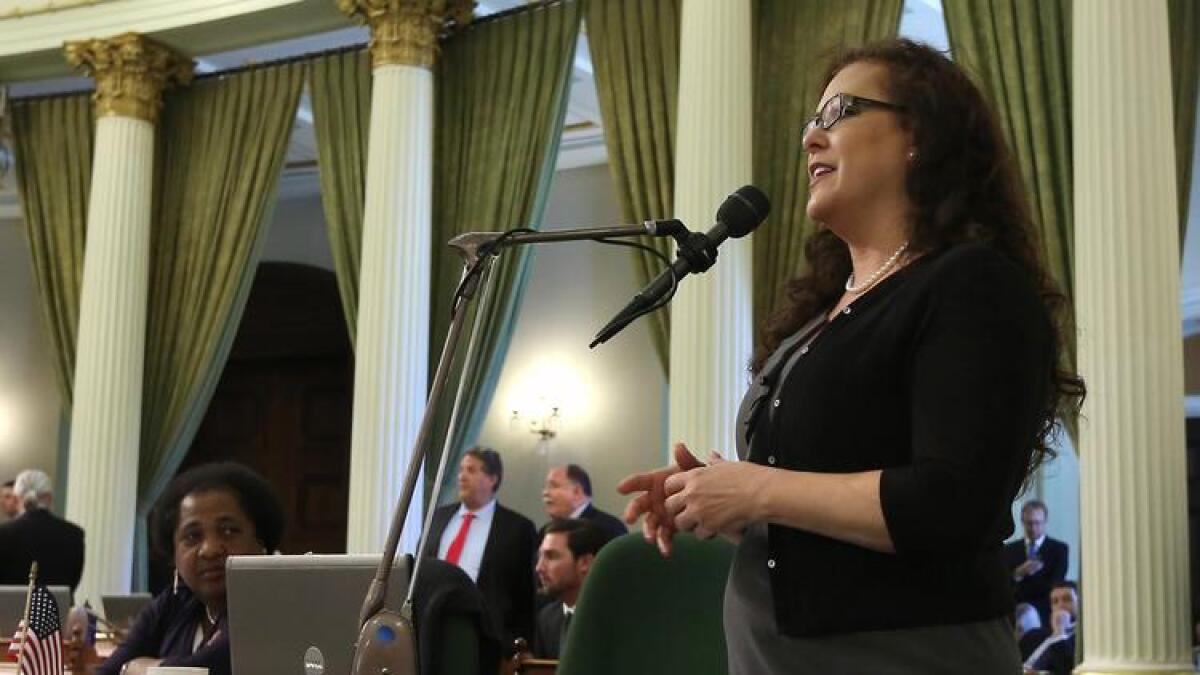
A measure that would bar employers from firing workers for having an abortion or giving birth to a child out of wedlock is getting pushback from religious groups who say such a bill would prevent them from requiring employees to act in accordance with their faith.
Under the bill by Assemblywoman Lorena Gonzalez Fletcher (D-San Diego), employers would not be able to discipline or fire workers for any reproductive health decision, such as pregnancy, in-vitro fertilization or abortion.
“What this bill does is make sure that people can make the best healthcare decisions for themselves and for their families without the fear that they’ll risk their livelihoods in doing so,” Rebecca Griffin of NARAL Pro-Choice California, a sponsor of the measure, said at a Wednesday afternoon hearing at the Capitol.
A teacher at a Christian college in San Diego was fired in 2012 for becoming pregnant while unmarried. The school said her pregnancy violated its employee code of conduct, which prohibited premarital sex. In 2015, San Francisco Archibishop Salvatore Cordileone sparked a backlash when he proposed a new morality clause in the faculty handbook and contract for local Catholic schools that opposed same-sex marriage and certain reproductive medical procedures.
With employees being fired for code of conduct violations in other states, proponents said California should set an example for the country,
“Right now, while we’re facing a federal government that is attacking reproductive freedom at every turn and condoning the type of discrimination that this bill prohibits, we feel like this is the time for California to take a stand for our values and make sure that our workers have the best protections possible,” Griffin said.
But the proposal faces opposition from religious groups, who argue such codes of conduct are integral to the relationship with their workers.
“The bill would specifically deny religious employers our 1st Amendment protections to infuse our codes of conduct with the tenets of our faith,” said Sandra Palacios of the California Catholic Conference.
The reaction from religious groups was not uniformly negative. The Rev. Rick Schlosser, executive director of the California Council of Churches, which represents mainline Protestant and Orthodox denominations, pointed to the diverse positions on reproductive issues among his group’s members to explain his support for the bill.
“Any legislation that limits people’s ability to make their own moral decisions is harmful to religious freedom,” said Schlosser.
But other religious groups said the measure threatened to undermine the very purpose of requiring their employees to abide by a code of conduct.
“An organization specifically chartered to support or oppose a specific set of beliefs or actions cannot fulfill its mission without requiring adherence to a code of conduct,” wrote Jonathan Keller, president of the conservative California Family Council, in an opposition letter.
Assemblyman Tony Thurmond (D-Richmond) asked why such codes of conduct should govern a personal decision an employee makes out of the workplace.
“Our community covenant does say that our employees are required to uphold our biblical values, and that certainly is a ‘round-the-clock priority for us,” responded Phillip Escamilla, the public policy chair of William Jessup University, a Sacramento-area evangelical Christian college
Gonzalez Fletcher, herself a practicing Catholic, said she was not trying to unfairly target religious institutions. But, she said, she was trying to combat an “inherent sexism” that comes with enforcing such codes of conduct.
A female employee’s reproductive decisions — such as entering an abortion clinic or being pregnant out of wedlock — can be seen by her employer, Gonzalez Fletcher said.
“A male’s decisions to whether or not they’re going to abide by a conduct never rise to that level,” she said. “So that inherent difference in how women and men are treated with these types of decisions just show how little privacy women are able to maintain.”
The bill, AB 569, cleared the Assembly Labor and Employment Committee, its first legislative threshold, on a 4-2 vote.
- Share via
Gov. Jerry Brown, legislative leaders propose raising $5.2 billion annually to repair California’s roads and bridges

Acknowledging that the state’s transportation system has been neglected, Gov. Jerry Brown and legislative leaders on Wednesday announced a proposal to raise gas taxes and vehicle fees to generate more than $5 billion annually for repairing California’s crumbling system of streets, highways and bridges, as well as to increase mass transit.
It remains uncertain whether Brown will be able to muster the two-thirds vote in both houses of the Legislature needed to approve the new revenue sources, which include a 12-cent-per-gallon increase in the existing 18-cent base excise tax on gasoline.
The package also includes a new, annual vehicle fee that would average about $48 based on the value of the car. The package was announced at a news conference on the Capitol steps attended by Brown, Assembly Speaker Anthony Rendon (D-Paramount) and Senate President Pro Tem Kevin de León (D-Los Angeles).
California has not approved an increase in the base excise tax on gas for 23 years, according to Brian Kelly, secretary of the California State Transportation Agency. As a result, the state faces a $130-billion backlog of repairs to state highways and bridges and local streets.
“There is sizable money here to make things better,” Kelly said. “People are going to get improved neighborhood streets. They are going to get improved highways and bridges, more faith that they are traveling on safe structures. And we are going to invest to improve the congestion into our trade corridors and congestion on their commute.”
Assembly and Senate Republicans released a joint statement opposing the plan.
“Californians already pay some of the highest gas taxes in the nation,” the statement said. “The transportation proposal announced by the Capitol Democrats is a costly and burdensome plan that forces ordinary Californians to bail out Sacramento for years of neglecting our roads.”
Brown has set a deadline of April 6, the day before the Legislature leaves on its spring break, to have the new package voted on by lawmakers.
Because Republicans have generally opposed the tax increases, the package may need the vote of every Democrat to get the two-thirds majority for passage. Three Democratic senators had been holding off their support before the new plan was released.
- Share via
Election officials say mistake on Korean language ballots substantially smaller than previously thought
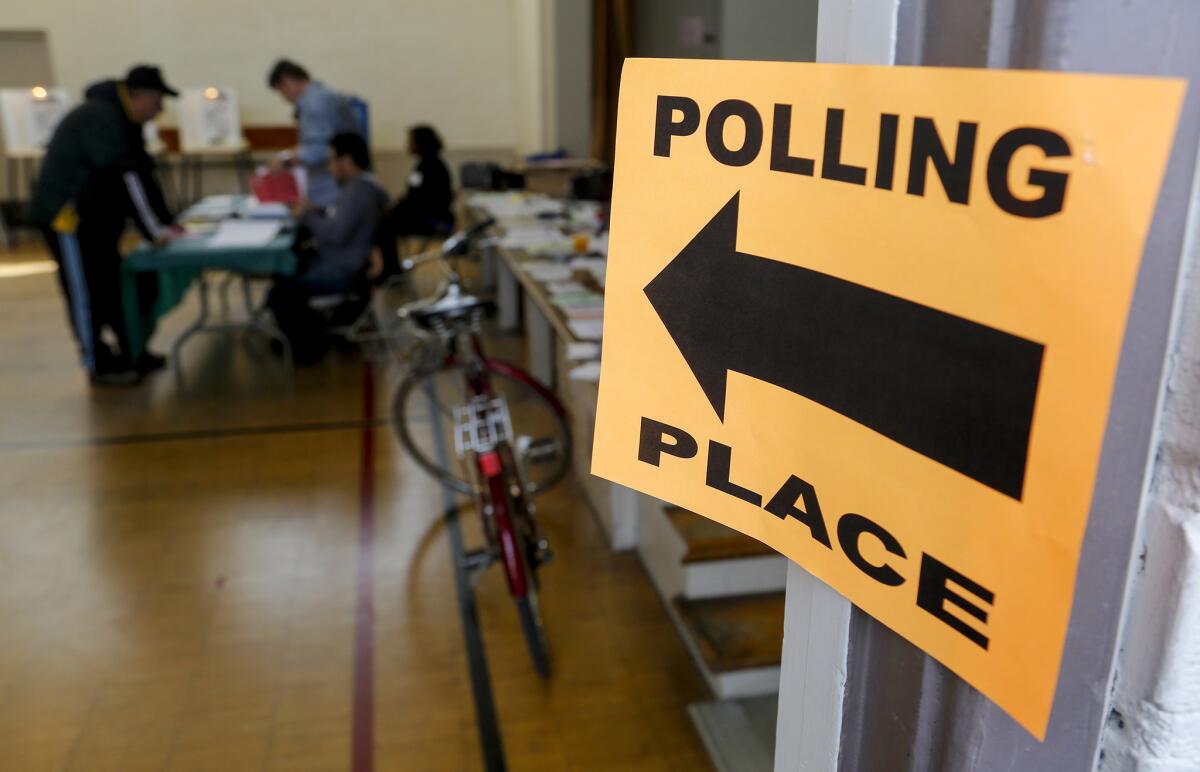
Los Angeles County election officials say a mistake made on Korean-language sample ballots in the upcoming 34th Congressional District race likely affected fewer than 780 voters.
The error, which listed the race’s 23 candidates in the wrong order on some Korean-language sample ballots, was discovered last week after Korean American voters pointed out their mail-in ballot materials looked different than English-language sample ballots sent to the same home or apartment building.
Initially, election officials said they didn’t know how widespread the problem was. As a precaution, they sent bilingual notices and corrected sample ballots to all 8,251 voters in the district who received Korean-language sample ballots. None of the sample ballots enclosed with actual mail-in ballots were affected, officials say.
In a letter to election officials and L.A. County supervisors Tuesday, the Korean American Coalition called it a violation of federally protected voting rights. The letter asked officials to host a 24-hour hotline for Korean-speaking voters until election day, provide more information on the scope of the error and extend the mail-in voting deadline for those who had received the misprinted ballots.
In a response sent Wednesday morning, County Registrar Dean Logan said the error was “limited to a small number of sample ballots in a single print run” of 777 sample ballots. Based on the agency’s review, Logan wrote, “it appears that substantially” fewer than the 777 voters were affected.
The registrar’s office says it is extending the hours of operation for its voter hotline and staffing it with Korean-speaking operators. Voters concerned that they may have been affected can call 1-800-815-2666 and select option 3 from 8 a.m. to 8 p.m. weekdays and 8 a.m. to 5 p.m. this weekend. Voters will also see additional signage at polls addressing the issue and Korean-speaking poll workers will be instructed to remind voters to check their ballots.
- Share via
San Francisco Mayor Ed Lee picks his candidate in the 2018 governor’s race
- Share via
Maxine Waters has some news for Bill O’Reilly: ‘I cannot be intimidated. I cannot be undermined.’
Rep. Maxine Waters appeared on MSNBC’s “All In With Chris Hayes” Tuesday night, and Hayes asked the California congresswoman if she had a response to Bill O’Reilly’s remarks that morning about her hair (or, as O’Reilly put it, her “James Brown wig.”) She did.
- Share via
L.A. doctor jumps into the race for California’s lieutenant governor
Los Angeles physician Asif Mahmood, a Democrat and supporter of a “Medicare for all” national healthcare plan, has announced he’ll run for California lieutenant governor.
Mahmood, who was raised in a small rural town in Pakistan before coming to the U.S., plans to officially declare his candidacy Wednesday and joins a 2018 race that includes at least one formidable Democrat, West Covina state Sen. Ed Hernandez. Hernandez has collected more than 100 endorsements from prominent California Democrats.
Senate President Kevin de León also has filed an intention to run for lieutenant governor and has been busy raising campaign contributions, though it’s unclear whether he’ll actually jump into the race.
Several Republicans also have declared interest.
Mahmood’s campaign was first reported by the New York Times.
On his campaign website, Mahmood describes himself as a “triple threat” to President Trump, a Republican, because he’s a “Muslim immigrant from this great blue state of CA.”
- Share via
Talks at Capitol focus on boosting California transportation funding by some $5.2 billion annually

With a deadline looming, Gov. Jerry Brown is winding up negotiations with legislators in hopes of reaching an agreement on a plan that would provide at least $5.2 billion annually for a transportation backlog that includes repairing California’s aging and crumbling system of streets, highways and bridges, officials said Tuesday.
Those close to the talks said an agreement on the package could be announced as early as Wednesday afternoon.
The question remains whether Brown and leaders can muster the two-thirds vote needed to approve a phased-in gas tax increase of up to 12 cents by the April 6 deadline set by the governor. Key senators remained uncommitted to any plan as of Tuesday.
And a new voter-approved rule requires a bill to be in print for 72 hours before it can be passed. The bill needs approval in both houses.
Assembly Democrats were briefed on the evolving plan behind closed doors on Tuesday and some officials, speaking on condition of anonymity because they were not authorized to comment, said talks are progressing on a plan that would provide the bulk of money to a “fix-it first” program of road repairs divided evenly between state projects and those of cities and counties.
Money would also be dedicated to mass transit, bicycle, pedestrian and trucking routs for ports.
The proposal also would include reforms proposed by lawmakers, including Republicans, that would hold officials accountable for proper use of the money, including a requirement for regular audits, creation of an inspector general position and a ballot measure requiring new money to be spent on transportation projects.
Sen. Josh Newman (D-Fullerton) authored a bill that would put a measure on the ballot, saying Tuesday such guarantees are required “given the urgency of the deferred maintenance backlog, and the additional burden we are asking California’s taxpayers to carry.”
John Myers contributed to this report.
- Share via
ICE director Thomas Homan: ‘We don’t get to pick and choose what we enforce’
- Share via
Crowd of protesters spills outside community forum on immigration in Sacramento
- Share via
Over loud boos, Sacramento County Sheriff Scott Jones orders removal of protester from immigration forum
- Share via
State Senate leader Kevin de León, Sacramento Mayor Darrell Steinberg speak outside immigration forum
- Share via
Watch: U.S. Immigration and Customs Enforcement director attends community meeting in Sacramento
- Share via
Protesters gather outside Sacramento community forum on immigration
- Share via
Gov. Jerry Brown calls for ‘countermovement’ against Trump’s ‘colossal mistake’ on climate change
California Gov. Jerry Brown warned that President Trump has just made a “colossal mistake” in gutting the federal government’s effort to combat climate change, which will ignite a response Trump is unprepared to handle.
“It defies science itself,” Brown said in a call to The Times shortly after Trump signed an executive order that aims to bring an abrupt halt to the United States’ leadership on global warming. “Erasing climate change may take place in Donald Trump’s mind, but nowhere else.
“Yes, there is going to be a countermovement,” Brown vowed, predicting Trump’s actions will mobilize environmentalists in a way President Obama never could. “I have met with many heads of state, ambassadors. This is a growing movement. President Trump’s outrageous move will galvanize the contrary force. Things have been a bit tepid [in climate activism]. But this conflict, this sharpening of the contradiction, will energize those who believe climate change is an existential threat.”
Brown and other big-state governors and mayors are moving swiftly to fill the global leadership vacuum Trump created with Tuesday’s directive, which stops short of officially pulling the U.S. out of the Paris climate accord of 2015.
“I see Washington declining in influence, but the momentum being maintained by California and other states aligned with China and those who are willing to do something,” said Brown, who will be traveling to China soon for meetings on climate. “There is a growing activism on the part of millions of people who will not stand by and let Donald Trump effectively tear up the Paris agreement and destroy America’s climate leadership and jeopardize the health and well-being of so many people.”
In the face of Trump’s retreat on climate change, Brown said California will step up its own efforts to push others toward clean energy. “We are not fully meeting the challenge of climate change yet,” he said. “We are doubling down on our commitment. We are reaching out to other states in America and throughout the world and other countries. … We have plenty of fuel to build this movement.
“This is real,” Brown said of the threat created by climate change. “The nations of the world have recognized it in Paris. … I will continue doing my best to work with and rouse the world community, whatever the politicians in Washington do or don’t do.”
- Share via
California and its allies hint at new legal battles over Clean Power Plan
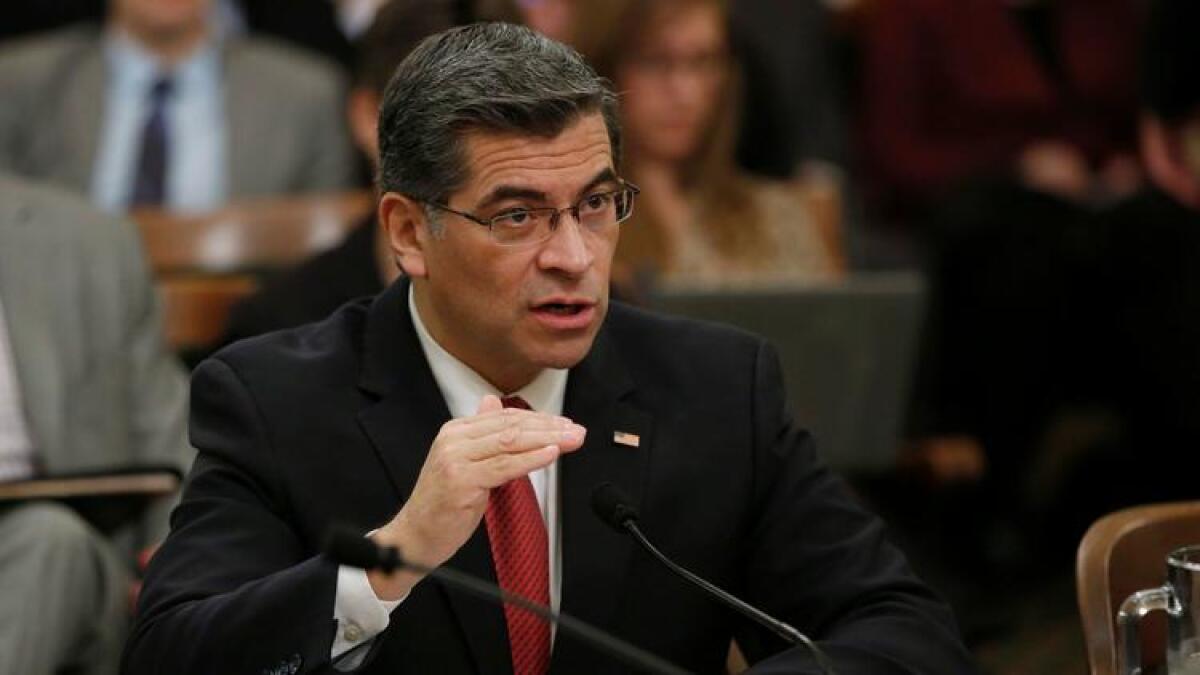
President Trump’s effort to roll back the Clean Power Plan could quickly run into legal challenges from California and its allies across the country.
State Atty. Gen. Xavier Becerra and his counterparts from states including New York, Massachusetts and Oregon said they “won’t hesitate to protect those we serve — including by aggressively opposing [Trump’s actions] in court.”
The joint statement was also issued by Chicago, Philadelphia, New York and other cities.
California’s stance isn’t surprising because the state joined Obama administration efforts to defend the Clean Power Plan in 2015.
Further legal action could underscore the determination of local and state governments to push forward with fighting climate change even as Trump withdraws federal regulations.
- Share via
Meeting climate change goals will require billions for transportation and housing improvements, reports say
A major push to get Californians out of their cars and onto their feet, bikes and public transit is essential if the state wants to meet its aggressive goals to cut greenhouse gas emissions 40% below 1990 levels by 2030, according to new reports from the state and UC Berkeley researchers.
Californians will have to drive an average of 1.6 miles less a day — and regional government agencies believe it will cost billions of dollars to make the mass transit and housing improvements needed for that to happen. UC Berkeley researchers argue in a new study that a boom in dense housing across the state will bring major greenhouse gas reductions and economic growth.
- Share via
California expects to be unscathed as Trump targets Clean Power Plan

Although California’s leaders may protest President Trump’s announcement Tuesday that he’s scrapping the Clean Power Plan, his decision is expected to have little effect on a state already marching toward renewable energy.
In fact, greenhouse gas emissions from electricity generation in the Golden State are already below what the federal government would have required by 2030, and they’re expected to drop even further.
“Rollback of the Clean Power Plan is pretty much irrelevant to California,” said Frank Wolak, a Stanford University economist who has advised state leaders on climate regulations.
The federal rules, enacted by former President Obama as part of his campaign against climate change, were intended to push states away from coal and toward cleaner energy sources. But that was already underway in California. Los Angeles, one of the last places in the state to rely on coal, was already planning to stop importing electricity from out-of-state coal plants by 2025.
In addition, state law requires California to generate half of its electricity from renewable sources such as solar and wind by 2030, and state Senate leader Kevin de León (D-Los Angeles) has suggested pushing even further.
When it comes to fighting pollution and climate change, there are some areas where California relies on the federal government. For example, they share authority on regulating vehicle emissions, and Trump’s preparation to roll back federal rules has caused alarm here. However, there’s less of a concern when it comes to generating electricity.
Trump’s moves have caused some anxiety among California companies that are developing clean energy technologies and looking for new markets to sell them.
Bob Keefe, executive director of Environmental Entrepreneurs, said the Clean Power Plan would have been “a huge economic catalyst.”
“President Trump is basically telling California’s more than 40,000 clean-energy businesses and the 500,000 workers they employ that they don’t matter to him,” he said.

It’s an open question how Trump could affect various efforts for California to integrate its electricity grid with neighboring states, an idea that has failed to gain traction so far. Advocates of the concept say regional cooperation could expand the market for renewable energy, but the lack of federal pressure to cut emissions could dampen enthusiasm in places such as Utah and Wyoming, which rely on coal.
“They don’t have the Clean Power Plan bearing down on them,” said Don Furman, who directs the Fix the Grid campaign that’s seeking closer relationships among West Coast states.
Ralph Cavanagh, an attorney at the Natural Resources Defense Council, said he doesn’t expect changes to the Clean Power Plan to harm efforts to create a regional electricity grid, because of the falling cost of renewable energy.
“The rationale is stronger today than it was yesterday,” he said.
- Share via
California GOP lawmakers introduce bills to boost healthcare and jobs for veterans
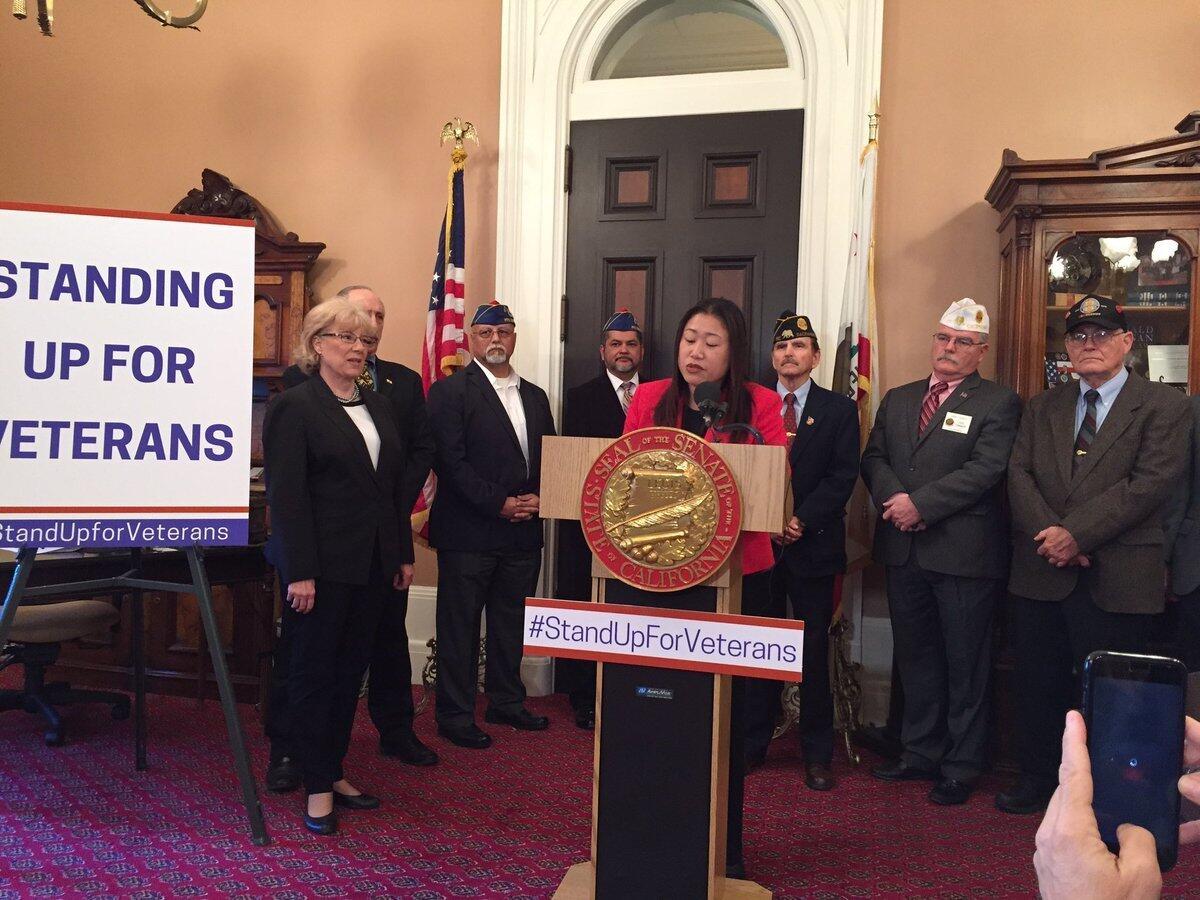
Republican state lawmakers unveiled a package of six bills Tuesday aimed at improving job training and healthcare services for California veterans.
“Our veterans have served this country bravely and it is only right for us to recognize their contribution and see that when they do come home they receive the care and assistance they deserve,” said state Sen. Janet Nguyen of Garden Grove, who authored three of the measures.
The six bills are:
- Senate Bill 410 from Nguyen and Assembly Bill 353 from Assemblyman Randy Voepel of Santee, which would expand hiring preferences. for veterans.
- SB 409 from Nguyen and SB 485 from state Sen. Jim Nielsen of Gerber, which would increase mental health services and oversight at state veterans’ homes.
- SB 411 from Nguyen, which would pay some military reservists $100 a month once they turn 50 if they’ve served for 10 years or more.
- SB 197 from Sen. Pat Bates of Laguna Niguel, which would waive state and local sales taxes for nonprofits that donate facilities to the U.S. Department of Defense — a measure aimed at helping construction of a mental health care facility at Camp Pendleton in San Diego County.
- Share via
These Los Angeles girls went to Capitol Hill to ask the Senate to fight new immigration enforcement efforts
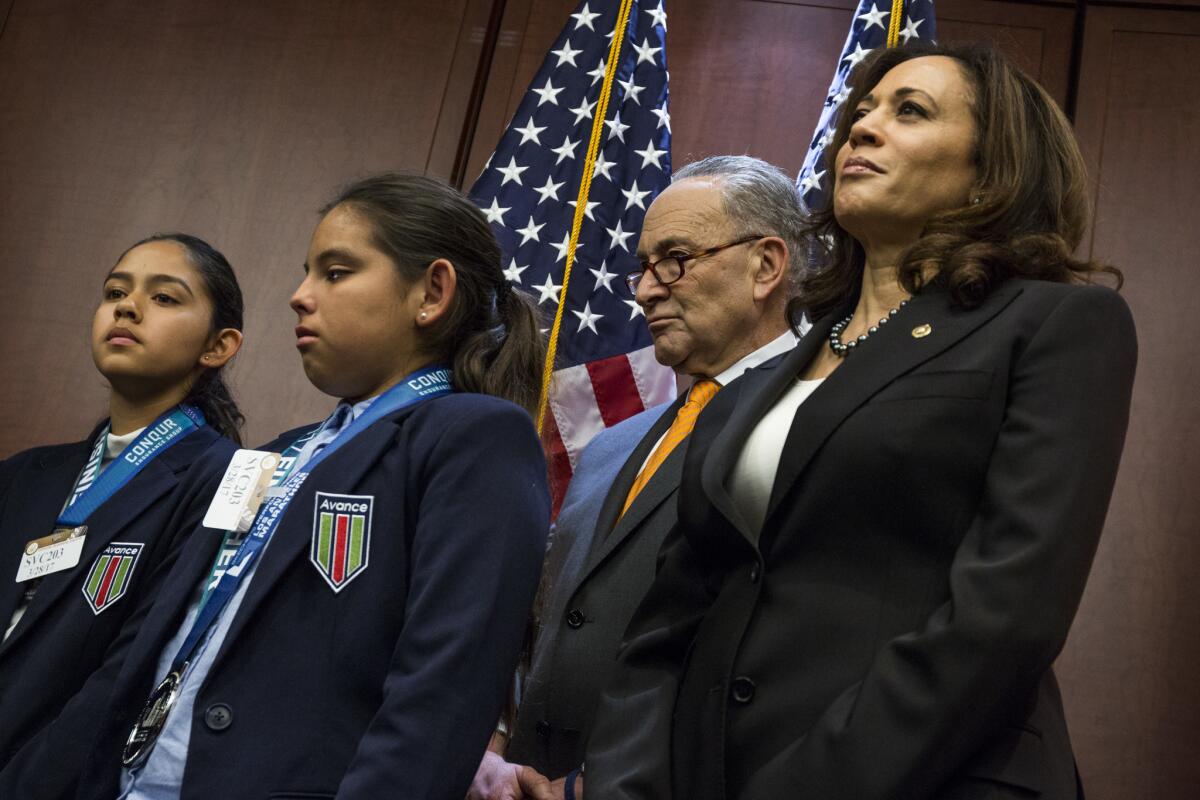
Fatima Avelica, 13, was training for the Los Angeles Marathon with her father before he was arrested by immigration agents last month after dropping Fatima’s sister off at her Lincoln Heights school.
Fatima had to pause repeatedly, pressing her fingers to her eyes, as she told the story to reporters at a news conference in the Capitol on Tuesday. Sen. Bob Menendez (D-N.J.) handed handkerchiefs to Fatima and her sister Yuleni Avelica, 12. The girls had medals from completing the marathon dangling around their necks.
Democratic senators held the news conference to urge their Senate colleagues to reject President Trump’s request for $3 billion to hire thousands of new immigration agents, expand detention facilities and build a wall among the southern border as part of his pledge to deport millions of people in the country illegally.
The White House has characterized the moves as necessary for public safety.
California’s Democratic Sen. Kamala Harris said Trump’s immigration enforcement orders are too broad, sweeping up nonviolent offenders or people accused of the civil offense of being in the country illegally. She called the executive orders, which vastly broadened who can be targeted for deportation and leaves a lot of discretion to local immigration officials “misguided and misinformed.”
“It’s irresponsible to paint a whole population of people as racists and murderers and ‘bad hombres,’” she said, referencing one of Trump’s own lines about immigrants. “It’s actually ignorant and we can’t afford to run our country that way.”
The girls’ father, Romulo Avelica-Gonzalez, a Mexican citizen, has lived in the U.S. for 25 years. ICE officials cited two misdemeanor convictions as the reason for his arrest. His four daughters were all born in the U.S. Fatima said the family is waiting for word every day on whether he will be deported.
Fatima said she now wants to become an immigration lawyer.
“It’s like a new marathon for me, and I know I can finish it,” Fatima said, tears welling up again. “But, I need my coach there. I need my dad.”
- Share via
Gov. Jerry Brown, New York Gov. Andrew Cuomo blast President Trump on climate change
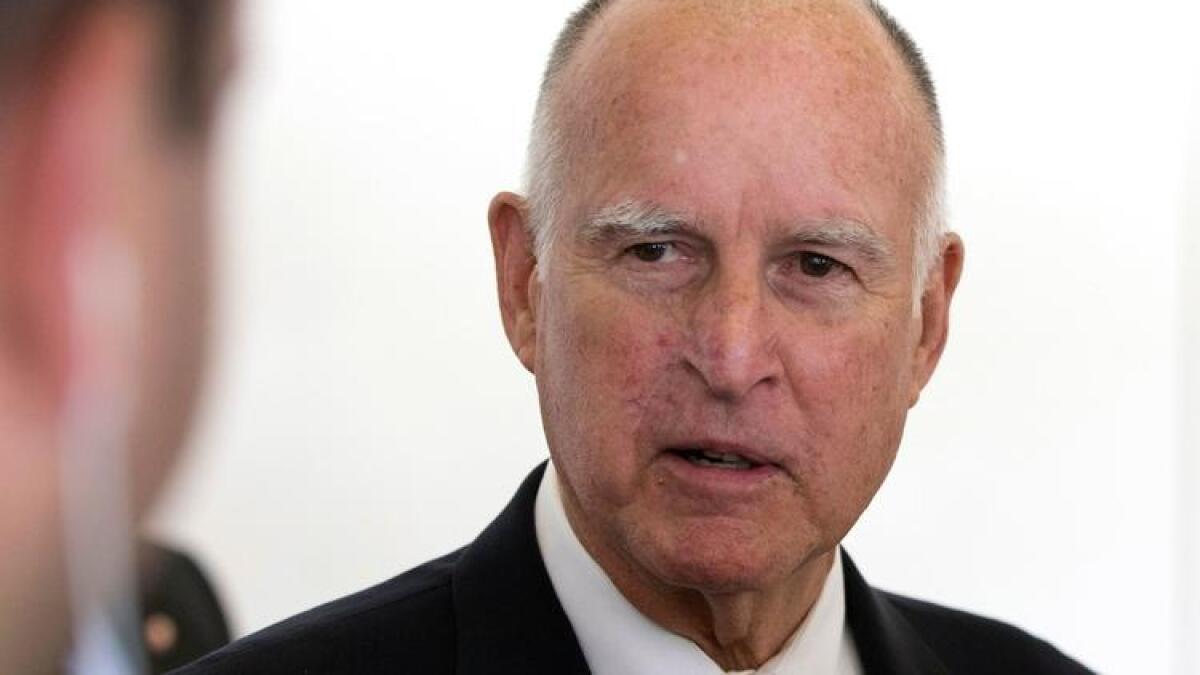
Gov. Jerry Brown joined with New York Gov. Andrew Cuomo on Tuesday to criticize President Trump’s pending announcement to roll back climate regulations and insist that their states will push forward anyway.
“Dismantling the Clean Power Plan and other critical climate programs is profoundly misguided and shockingly ignores basic science,” they said in a joint statement. “With this move, the Administration will endanger public health, our environment and our economic prosperity.”
Brown and Cuomo represent the two largest states with the most ambitious goals for fighting global warming, and they’ve already set equivalent targets for reducing greenhouse gas emissions. They’re also pushing to generate half of all their electricity from renewable sources by 2030.
“With or without Washington, we will work with our partners throughout the world to aggressively fight climate change and protect our future,” Brown and Cuomo said.
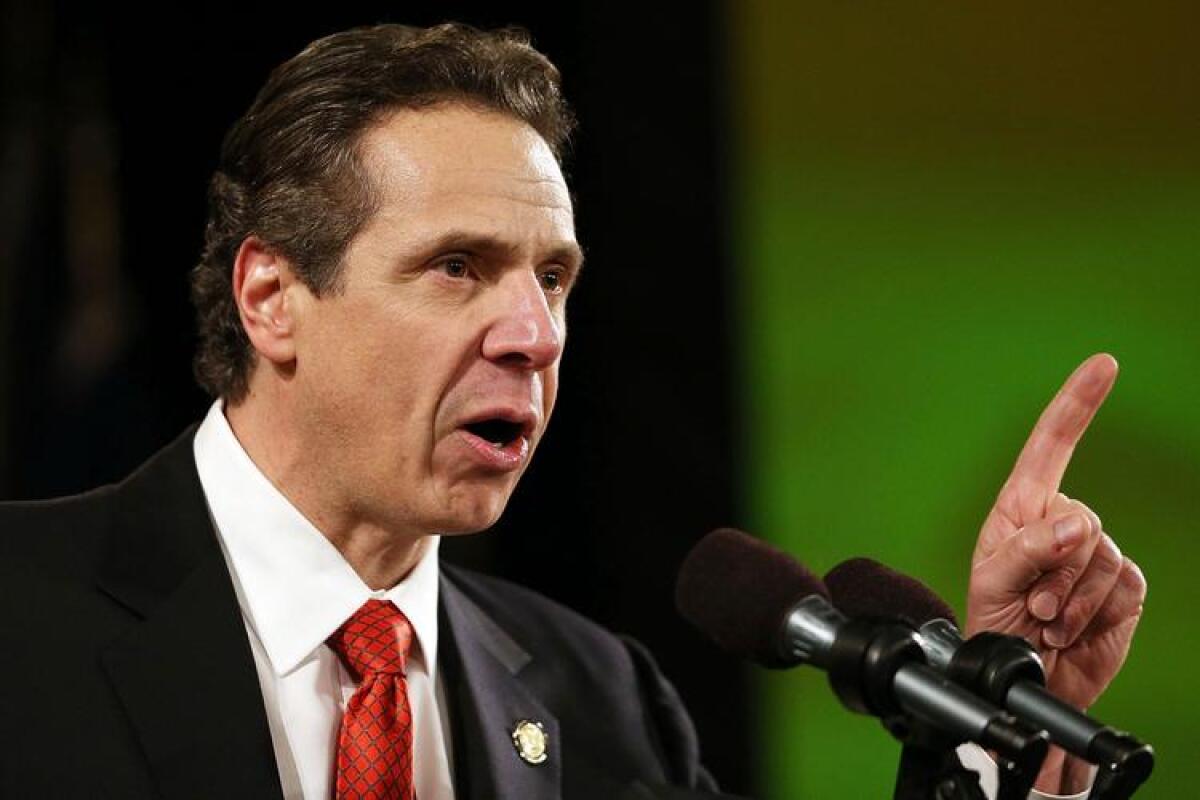
- Share via
To stem rising prices, a California lawmaker is taking on how hospital chains craft their contracts
Amid concern that sprawling hospital chains are leading to higher prices, a California state senator is trying to clamp down on how hospital networks craft their contracts to win market dominance.
Sen. Bill Monning (D-Carmel) is offering a measure that would prohibit hospitals from certain contracting practices he sees as anti-competitive, such as requiring health plans to contract with all affiliates of the hospital or mandating that health plans agree to binding arbitration for antitrust claims.
“We’ve lost a level of transparency that’s affected affordability and access and fairness,” Monning said in an interview.
Multi-hospital chains are becoming prominent throughout the country, with proponents saying such mergers make care more efficient and better coordinated.
But a recent USC study found that while hospital prices in California have grown overall, the costs are higher in the state’s largest chains.
“Once you control a market, you can artificially increase costs,” said Monning, adding those higher prices can spill over to neighboring hospitals, too.
Competitors think “if they can charge this much for a hip replacement, we’re going to as well,” Monning said.
Another study by the Bay Area Council Economic Institute found premiums in Northern California were 30% higher than those in Southern California, in part because of the dominance of a few healthcare systems in the north.
Micah Weinberg, the institute’s president, said hospital consolidation was a logical issue to look at, particularly because healthcare coverage expansion under the Affordable Care Act is now under less threat from Congress following the failure of the House Republicans’ replacement bill.
“We have to double down on the real work, which is getting people access to quality healthcare and affordable costs,” said Weinberg. “One of the biggest barriers to that is the lack of competition among healthcare providers.”
Weinberg said much of the question is a matter of federal antitrust enforcement.
“It’s really difficult to do things at the state level that are effective here,” he said.
Still, consolidation has increasingly come under scrutiny in California. The state attorney general’s office under Kamala Harris, now serving as U.S. senator, investigated consolidation of hospital and physician groups, and the effect on consumer prices.
Last year, the healthcare trust for the United Food and Commercial Workers union, sued Sutter Health, alleging antitrust violations.
The Pacific Business Group on Health, an organization that represents major companies such as Wells Fargo and Chevron, also raised alarms on Sutter’s requirement that firms use arbitration to resolve disputes--or face higher rates for Sutter’s healthcare services. The business group is a supporter of Monning’s bill, as well as the California Labor Federation.
The California Hospital Assn. has not taken a position on the bill.
------------
FOR THE RECORD
March 29, 2017, 1:52 p.m.: A previous version of this article reported that the Pacific Group on Health sued Sutter Health. The United Food and Commercial Workers healthcare trust filed the suit.
- Share via
Wendy Carrillo gets nod from Standing Rock Sioux leader in L.A.’s congressional race
- Share via
Los Angeles assemblyman returns to work in Sacramento after more than two-week absence
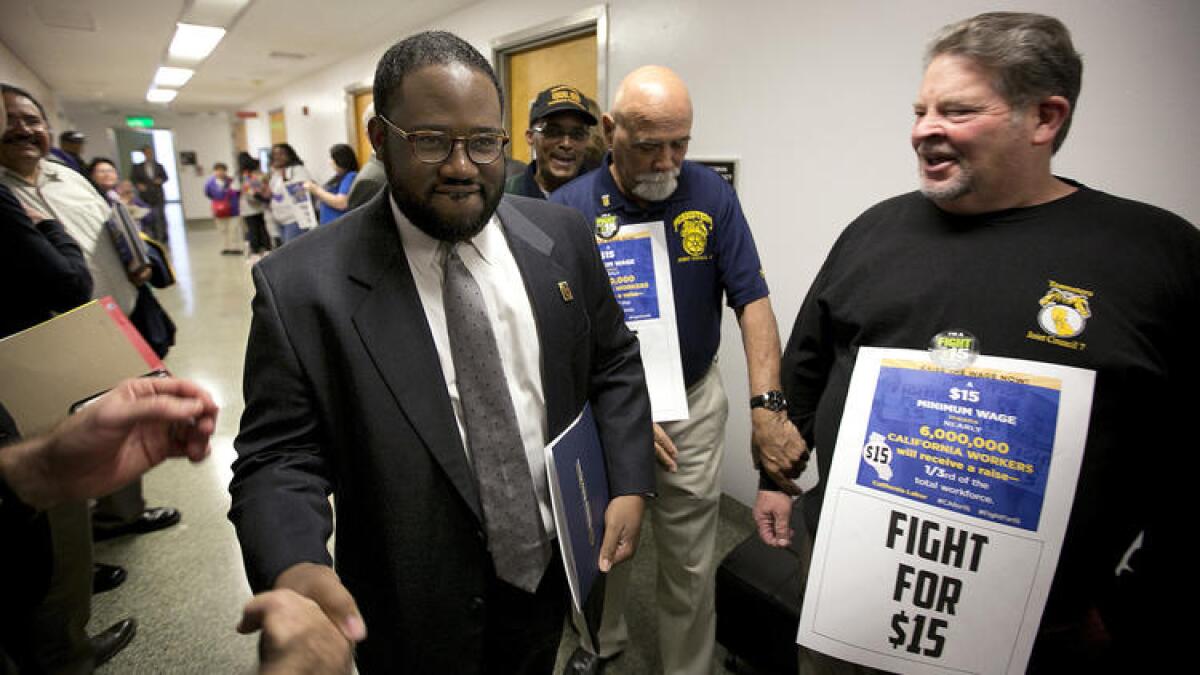
After more than two weeks away from the state Capitol, Assemblyman Sebastian Ridley-Thomas (D-Los Angeles) was back at work Monday, with his staff blaming the absence on unspecified medical reasons.
“I’m not going to comment on what the illness was,” said his chief of staff, Darryl Lucien, who added that the legislator was “feeling better” Monday.
Ridley-Thomas, 29, was not available for an interview to discuss his absence.
He originally went on leave March 7. At the time, he did not specify an illness and so Assembly Speaker Anthony Rendon’s office considered him to be on personal leave. Under legislative rules, those absences did not allow him to receive per diem payments — a subsidy intended to offset the costs of traveling and living in Sacramento.
On March 21, he informed Rendon’s office that he was on medical leave, thus becoming eligible for the $183 per diem.
Lucien said the original personal leave request was an error and that all of Ridley-Thomas’ time away from work was for health reasons.
“It’s medical leave,” Lucien said. “He has a doctor’s note that was submitted, excusing him for the time he was out.”
Ridley-Thomas was not entirely absent from legislative work during that time. While on leave, he yanked one high-profile piece of legislation — a measure that would exempt tampons and other feminine hygiene products from sales tax — from a hearing in the Assembly Revenue and Taxation committee, which he chairs.
The bill’s author, Assemblywoman Cristina Garcia (D-Bell Gardens), said she spoke directly to Ridley-Thomas about a request to amend her bill days before that committee hearing.
Lucien said Ridley-Thomas was working “on a very limited basis,” fielding calls from members “to the extent he was able to speak with them.”
A fellow Democrat, Assemblyman Bill Quirk of Hayward, stepped in to chair the Revenue and Taxation panel during a March 13 hearing. A subsequent hearing on March 20 was canceled.
- Share via
L.A. Councilwoman Nury Martinez endorses Sara Hernandez in 34th Congressional District
- Share via
Adam Schiff calls on Devin Nunes to remove himself from Russia investigation
Rep. Adam B. Schiff (D-Burbank) on Monday urged fellow Californian Rep. Devin Nunes (R-Tulare) to remove himself from their investigation into Russian meddling in the 2016 election.
Before late last week, Schiff had gone out of his way not to be critical of Nunes throughout the fledgling investigation. They have held the top positions on the House Intelligence Committee for two years, and have served in Congress together for more than a decade.
“This is not a recommendation I make lightly, as the Chairman and I have worked together well for several years; and I take this step with the knowledge of the solemn responsibility we have on the Intelligence Committee to provide oversight on all intelligence matters, not just to conduct the investigation,” Schiff said in a statement.
Nunes last week surprised many when he told reporters that conversations between Trump and his transition team may have been accidentally picked up during legal intelligence gathering. Nunes briefed the media and President Trump before informing his committee.
A spokesman for Nunes, who was a member of Trump’s transition team, said Monday he obtained the information from a source on White House grounds, which raised even more questions. Nearly a week after Nunes’ announcement, committee members still haven’t seen the evidence, Schiff said.
“There was no legitimate justification for bringing that information to the White House instead of the committee. That it was also obtained at the White House makes this departure all the more concerning,” Schiff said.
Nunes’ spokesman would not comment on calls for the chairman to recuse himself.
House Democrats have called for an entirely independent investigation, but short of that were coalescing around the call for Nunes to step aside.
Among others, Schiff’s Intelligence Committee colleagues Reps. Jackie Speier (D-Hillsborough) and Eric Swalwell (D-Dublin) have also called for Nunes to step aside from the investigation.
The House and Senate intelligence committees are both investigating allegations that Russia tried to interfere with the presidential election and what, if anything, the Trump campaign knew about it.
“So far, too many people in the White House and administration, and now the chairman of the House Intelligence Committee, have betrayed their duty to conduct an independent, bipartisan inquiry into the Trump team’s ties with Russia,” Swalwell said in a statement. “Chairman Nunes should no longer be anywhere near this investigation, let alone leading it.”
House Minority Leader Nancy Pelosi (D-San Francisco) said in a statement that Nunes had “tarnished” the chairmanship. She also said it was “long overdue” for House Speaker Paul D. Ryan (R-Wis.) to ask him to recuse himself from the investigation.
- Share via
Blasting federal action on immigration, California’s chief justice warns the rule of law is under threat
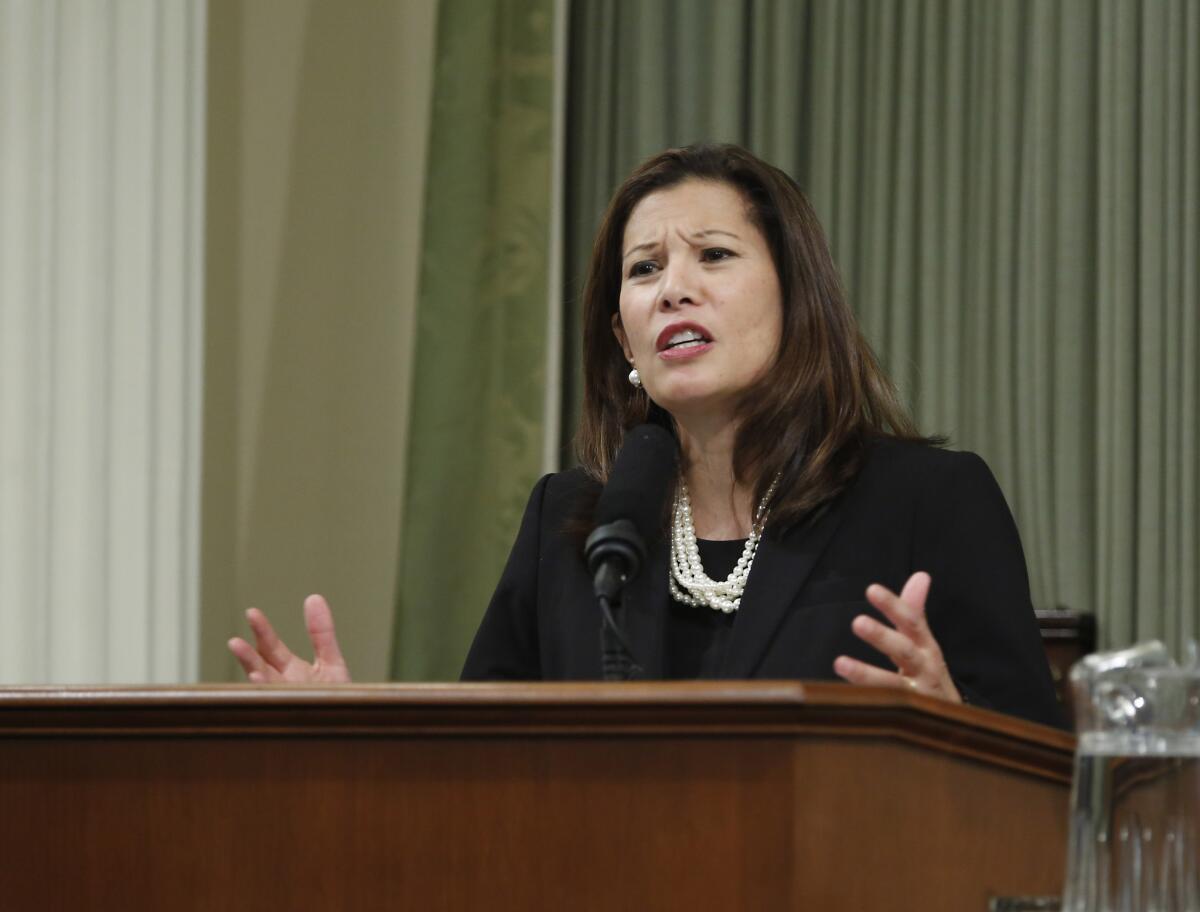
California Supreme Court Chief Justice Tani G. Cantil-Sakauye did not mention President Trump by name in her annual State of the Judiciary speech Monday, but she blasted federal actions on immigration and warned that the rule of law in the state is under threat.
In addressing the Legislature, she also called on members to end years of underfunding of the state court system.
The chief justice said the rule of law has failed repeatedly in the state, including when her husband’s parents were among 120,000 Japanese Americans put in internment camps during World War II.
“Simply put, the rule of law means that we as a people are governed by laws and rules, not by a monarch,” she said.
People take the rule of law for granted until it is under threat, she added.
“I submit to you today that the rule of law is being challenged,” she said. “We are living in a time of civil rights unrest, eroding trust in our institutions, economic anxiety and unprecedented polarization.”
Cantil-Sakauye cited a report by the Southern Poverty Law Center that California was home to 79 ethnic “hate groups” — more than any other state.
“Our values and our rules and laws are being called into question, and all three branches of government and the free press are in the crosshairs,” she said.
Without naming Trump, the chief justice criticized recent federal enforcement of immigration laws in which agents have gone into courthouses to take immigrants into custody.
She said it was concern over the rule of law that caused her to write to the U.S. attorney general and the Homeland Security secretary recently, asking them to refrain from conducting immigration raids at or near courthouses.
“When we hear of immigration arrests and the fear of immigration arrests in our state courthouses, I am concerned that that kind of information trickles down into the community, the schools, the churches. The families and people will no longer come to court to protect themselves or cooperate or bear witness,” she said. “I am afraid that will be the end of justice and communities will be less safe and victimization will continue.”
The chief justice also repeated her concerns about the lack of sufficient funding for the judiciary even as legislators are adding laws by the thousands.
“Since 2011 when I became chief justice, 6,408 bills have become law in California, while the judicial branch budget has been shrinking,” Cantil-Sakauye said. “I have said before that we are on the wrong side of justice when it comes to funding our courts.”
- Share via
It’s not just Berniecrats: Korean voters could also swing L.A.’s congressional race in a big way

The crowded race to replace Xavier Becerra in the 34th Congressional District, which includes most of Los Angeles’ Koreatown, appears to be bringing Korean American voters out in large numbers.
That’s in part because in a field dominated by Latinos, Robert Lee Ahn has a shot at becoming the only Korean American in Congress and the first Korean American Democrat to be elected to the body.
Ahn, a businessman and former L.A. city planning commissioner, has raised a formidable amount of money in a short period of time, much of it from donors in the Korean American community. His campaign spent weeks helping register voters at Koreatown malls and restaurants, and says they registered more than 600 new voters so far.
“Part of our campaign is to build awareness and get the community more civically engaged,” Ahn said on a recent Friday morning as his campaign embarked on a 34-hour voter registration drive outside the BCD Tofu House restaurant. “As a Korean American, obviously that’s a natural base of mine.”
Inside, Ahn shook hands with supporters and navigated the lunchtime rush to ask for voters’ support table side.
Some of it may be paying off. More than a quarter of the 10,841 mail-in ballots turned in for the race so far were cast by Korean American voters, according to an analysis of surnames, birthplace and translated ballot materials by Political Data. Koreans make up just 6% of registered voters in the district. Nearly half of Korean American voters who have already cast a ballot in the race did not vote in the March 7 city elections.
Ahn, who has said he’ll bring a “business sensibility and common sense” to the office, says he has been running a campaign that reaches out to all kinds of voters. But the fact that there hasn’t been a Korean American in Congress for more than 20 years means his candidacy has gotten plenty of attention from the Korean American press.
“I think people recognize the importance and historic nature of this election,” Ahn said. “I think there’s a hunger for a voice ... and there’s a palpable frustration of not being heard, not being properly represented, and I think that’s what we’re seeing in the early returns.”
But the result of those early votes so far is unclear, particularly after elections officials disclosed that a number of Korean-language sample ballots had been misprinted with the candidates listed in the wrong order. Those who used the faulty sample ballots to cast their vote could have inadvertently voted for a candidate they didn’t intend to support, and officials still don’t know how widespread the problem is.
Ahn isn’t the only Korean American candidate to energize the community in recent years. David Ryu, the first Korean American elected to the L.A. City Council, rode to victory in 2015 with the help of a wave of support from Koreatown leaders.
“I believe a political awakening is occurring in the Korean American community all over the nation, but especially here in L.A.,” said Joon Bang, executive director of the Korean American Coalition. “Our community is evolving and it’s beginning with understanding the power of their vote.”
- Share via
‘Nothing short of blackmail’: California Senate leader denounces plan to cut funding from ‘sanctuary cities’
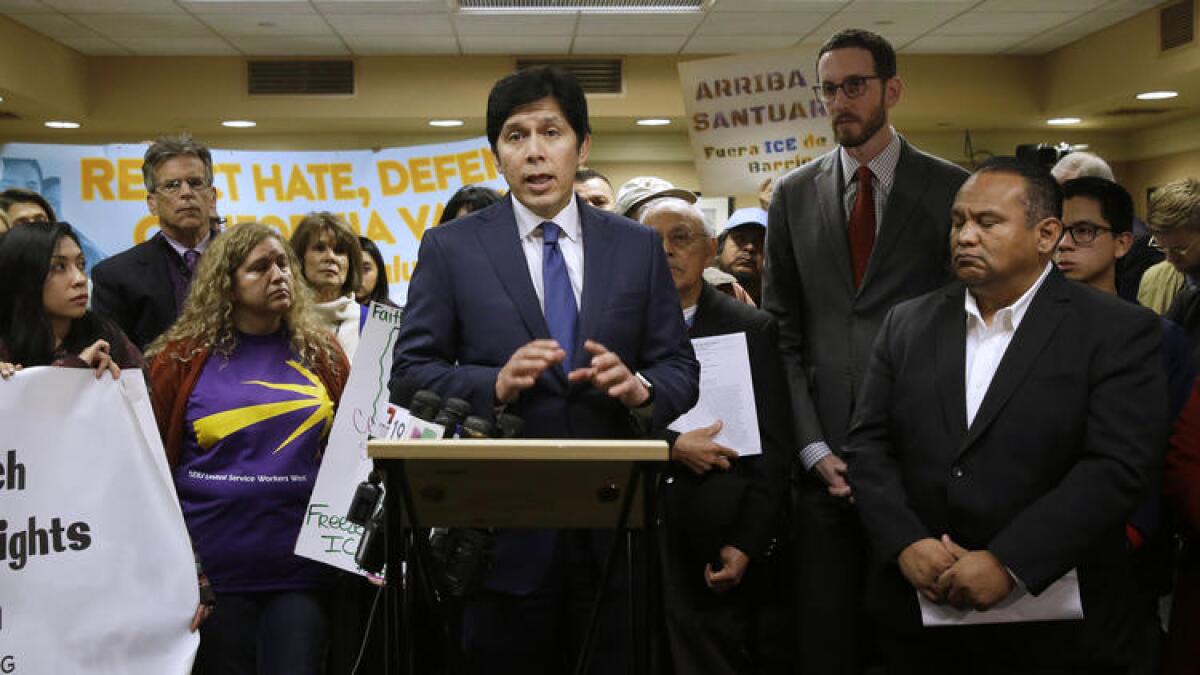
California Senate leader Kevin de León on Monday called U.S. Atty. Gen. Jeff Sessions’ move to cut federal funding from so-called sanctuary cities “nothing short of blackmail.”
In a statement, De León (D-Los Angeles) said Sessions and the Trump administration “stuck to alternative facts” when describing immigrants and sanctuary counties and cities, where local policies limit the cooperation of law enforcement agencies with federal authorities on immigration laws.
“Instead of making us safer, the Trump administration is spreading fear and promoting race-based scapegoating,” he said. “Their gun-to-the-head method to force resistant cities and counties to participate in Trump’s inhumane and counterproductive mass-deportation is unconstitutional and will fail.”
De León was responding to an earlier announcement made by Sessions at a White House press briefing. Sessions urged all states and local jurisdictions to comply with federal immigration laws and said it would be a condition for receiving federal grants.
State leaders are still calculating the fiscal impact of the move in California, where the Senate leader has filed a bill that would prevent state and local law enforcement agencies from using resources to enforce federal immigration laws.
- Share via
California National Guard official tells legislators forced bonus repayments will be resolved by mid-summer
A top official for the California National Guard told state legislators Monday that he hopes lingering issues from the soldiers being forced to repay enlistment bonuses will be resolved by mid-summer.
A Times investigation last year found that the Pentagon demanded thousands of soldiers repay enlistment bonuses up to a decade after going to war in Iraq or Afghanistan.
The claw-back came after audits revealed vast overpayments of bonuses, due in part to mismanagement and pressure to hit enlistment targets. The Times story prompted outcry that soldiers, who were not at fault for accepting the bonuses, were now facing financial hardship.
Matthew Beevers, the deputy adjutant for the California National Guard, told a joint hearing of the Senate and Assembly Veterans Affairs committees that just over 1,000 soldiers currently hold debt due to the bonus recoupment.
Soldiers who are affected by the repayment demand must go through a federal waiver adjudication process, which Beevers described as “unnecessarily long, complex and resource-intensive.”
He said the state-run Soldier Incentives Assistance Center was working with those who need to navigate the complex process to get those debts waived.
“[If] you got a bonus and you completed your obligation and for some reason, you weren’t entitled to it, we’ve done everything we can do ensure that those soldiers get to keep those bonuses and we continue to do that today,” Beevers said.
Beevers said the state is trying to locate all soldiers who may be carrying debts due to the enlistment bonus. For those who complete the federal adjudication process, around 50% get their debts waived, he said.
“At the end of the day, there might be 600 or so soldiers out of 16,000 who might have to pay money, which is a very very small number,” he said.
- Share via
Former California legislator Henry Perea will lobby for the oil industry in Sacramento
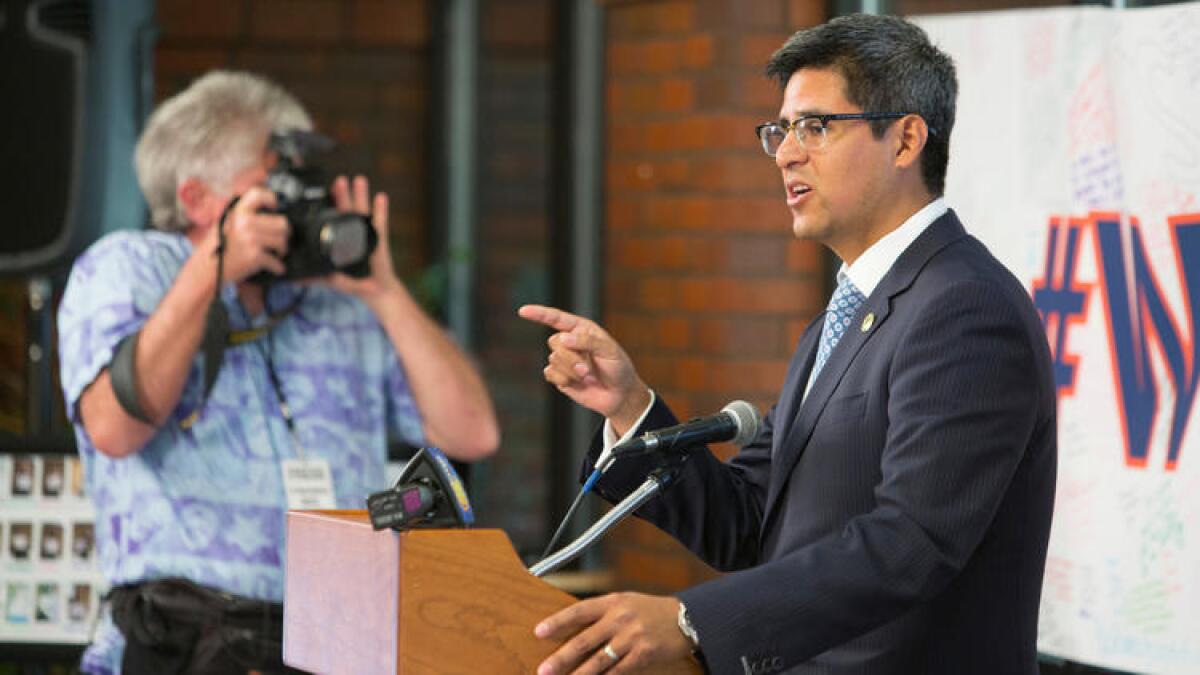
As lawmakers debate the future of California’s climate policies, the oil industry is boosting its lobbying firepower with a former Democratic assemblyman from Fresno who has bedeviled environmentalists in the past.
Henry Perea resigned his Assembly seat to work for a pharmaceutical group. Now he’s jumping to the Western States Petroleum Assn. as a senior vice president, a role he’s scheduled to start on May 1.
“Henry brings us unique expertise,” said a statement from Catherine Reheis-Boyd, the association’s president. “He understands our state, our industry and how smart public policy can ensure California’s continued leadership in environmental protections while maintaining a diverse, vibrant economy.”
While serving in the Assembly, Perea led the so-called moderate caucus of business-friendly Democrats. He played a key role in stalling 2015 legislation that would have created tough new targets for reducing oil consumption.
Environmentalists have made progress since then, successfully pushing through legislation to lower greenhouse gas emissions by 2030. Now these issues are being debated again as lawmakers consider whether to extend the state’s cap-and-trade program, which is intended to provide a financial incentive to reduce emissions.
The oil industry supports extending the program, but it’s working to ensure favorable terms and to loosen the state’s other regulatory plans.
- Share via
Democrats out with ads targeting Rep. Mimi Walters for supporting GOP healthcare bill
Republicans didn’t vote on their plan to replace the Affordable Care Act on Friday, but Democrats already have ads out criticizing vulnerable GOP House members like Rep. Mimi Walters of Irvine for backing the bill.
The Internet ads, paid for by the Democratic Congressional Campaign Committee, will target 14 Republicans who voted for the bill in the House Budget, Ways and Means, and Energy and Commerce committees. The ads will run for at least a week on social media sites, including Facebook and Instagram.
“Walters knowingly voted for a bill to raise premiums and deductibles, slap an age tax on older folks, and rip insurance away from 24 million hardworking Americans. It’s critical that voters in California’s 45th District know where Walters stood on this harmful legislation,” DCCC Chairman Ben Ray Luján said in a statement.
Walters, who serves on the Energy and Commerce Committee, was one of the earliest supporters of the bill among the California Republican delegation.
“Rep. Walters is committed to improving and expanding healthcare choices, lowering costs and protecting taxpayers. Her votes in the House reflect those principles and she will not be deterred by campaign ads created in Washington, D.C., by Nancy Pelosi’s political committees,” said her campaign consultant, Dave Gilliard.
The DCCC has already announced plans to target Republican representatives of the seven California congressional districts that backed Hillary Clinton for president.
Clinton won Walters’ Orange County district by 5 percentage points. Walters was elected for a second term with 58.6% of the vote.
- Share via
Gov. Jerry Brown says California won’t ‘be running to the courthouse every day’ to fight President Trump
With many of his fellow Democrats demanding multiple challenges to President Trump’s proposals, Gov. Jerry Brown said this week he will continue to support a more measured approach.
“We’re going to fight very hard. But we’re not going to bring stupid lawsuits or be running to the courthouse every day,” Brown said during an appearance Sunday on NBC’s “Meet the Press.”
“We’re going to be careful. We’ll be strategic.”
The governor’s interview, taped on Thursday in Washington, came at the end of a four-day visit where he sought common ground on issues ranging from transportation to disaster relief. Brown also took aim in a visit to Capitol Hill at the now-failed Republican healthcare proposal.
In the interview, Brown acknowledged that he is seeking a different path forward than California’s legislative leaders and other Democrats who are aggressively pushing back on a variety of Trump proposals.
“Well, if everything’s a lawsuit, yeah, we’re in trouble here. I do curb the exuberance on either side,” he said.
“People like to escalate. Republicans do that, and Democrats also do that. So I’m there somewhat as the senior statesman now, and I’m going to keep everything on an even keel.”
The governor used the national television interview to repeat recent suggestions that California has a number of projects that are ready to go should Trump make good on his promises to fund a major infrastructure effort. But Brown staunchly defended California’s acceptance of immigrants, including those who are in the U.S. illegally. He argued that immigration has been a major boon to the state’s economy and invoked the teachings of Christianity to criticize Trump and his fellow Republicans.
“Trump’s supposed to be Mr. Religious Fellow, and I thought we’ve got to treat ‘the least of these’ as we would treat the Lord,” said Brown, who trained to become a Jesuit priest in his youth. “So I hope he would reconnect with some of these conservative evangelicals, and they’ll tell him that these are human beings, they’re children of God. They should be treated that way.”
The program’s host, Chuck Todd, asked Brown whether he could offer national leadership for Democrats in the Trump era. The governor, who ran unsuccessfully for president three times, said he was willing to speak out in any way he could be helpful.
Following last week’s historic defeat of a bill to replace the Affordable Care Act, Brown also offered Trump advice on how to help the economically struggling states whose voters put him in the White House.
“It’s going to take some income support from the federal government,” the governor said. “It’s going to take healthcare. It’s going to take the kind of programs that the Republican Party traditionally doesn’t like. So here’s the dilemma. Yes, Obama was not able to help those people in the way they felt they had a right to. But Mr. Trump, now the burden is on you. And you better figure it out, or you’re not going to be there again.”
- Share via
California Politics Podcast: Gov. Jerry Brown strikes a careful tone in Washington
As leader of a state where criticism of President Trump is a daily, if not hourly, occurrence, Gov. Jerry Brown carefully navigated the rough political waters of Washington during last week’s visit.
On this week’s California Politics Podcast, we discuss Brown’s effort to seek compromise where possible with Republicans in the nation’s capital while holding fast on issues like immigration and healthcare.
We also take a look at the potential high-stakes fight this spring over planned tuition hikes on Cal State and University of California campuses. And we discuss new statewide voter registration data showing a new low for the California Republican Party.
I’m joined by Times staff writer Melanie Mason and Marisa Lagos of KQED News.
- Share via
‘Presidential credibility, once squandered, may never be fully regained’: Rep. Adam Schiff, in Democrats’ weekly speech
Rep. Adam Schiff (D-Burbank) on Saturday implored President Trump to be truthful, saying “presidential credibility, once squandered, may never be fully regained.”
Schiff, who had a busy week as ranking Democrat on the House Select Committee on Intelligence, used the weekly Democratic address to lay out details of the committee’s investigation into Russian interference in the 2016 election, but ended with a plea directly to Trump.
Americans and U.S. allies need to be able to believe Trump if he says there is an international crisis, such as North Korea placing a nuclear weapon on a ballistic missile, Schiff warned. He added that Trump has chosen “two superb people” in Defense Secretary James N. Mattis and National Security Advisor H.R. McMaster.
“Seek their counsel. Listen to what they have to say,” Schiff said. “And cherish the trust and hope that was placed in you by virtue of your office, by never again advancing claims that you know — or should know – are simply not true.”
The weekly address is delivered by a different member of the minority party each week and is meant as a response to the president’s weekly speech.
- Share via
Small donations play big role in the 34th Congressional District

More than 17% of individual contributions to all candidates in the 34th Congressional District came in small donations of less than $200, according to the latest campaign finance reports.
The reports, which cover fundraising and spending between Jan. 1 and March 15, show that more than $250,000 of the $1.4 million raised by the candidates in the race came from un-itemized small donors, or those who gave less than $200 and are not named in campaign finance reports.
Three candidates who raised a significant chunk of money from small donations were Arturo Carmona, Wendy Carrillo and Kenneth Mejia, all of whom are vying for votes from supporters of former presidential candidate Sen. Bernie Sanders, who has preached the need to rid politics of special interest money.
Many of the candidates have sent email pitches to supporters asking for donations of $10, $20 or $27, the amount made famous by Sanders, who often cited the number as the average donation given to his presidential campaign.
Carmona, a former Sanders campaign advisor, raised the most in small donations, with $57,125, or 52% of his total. Small donors gave Carrillo $25,948, about 32% of her fundraising total and Mejia, an accountant and Green Party candidate, received nearly 90% of his total funds, or $31,957, in amounts of $200 or less.
Federal law does not require candidates to itemize, or report the names of, donors who give below that amount.
Alejandra Campoverdi raised $44,210 from small donors, who made up 28% of her haul, while Raymond Meza raised 48%, or $14,764 of his money from small-dollar contributions.
UPDATE:
7:45 p.m. This post was updated to clarify that the numbers reported are based on un-itemized donations of $200 or less to candidates.
- Share via
Robert Lee Ahn raised the most money by far in latest campaign finance reports for L.A.’s congressional race
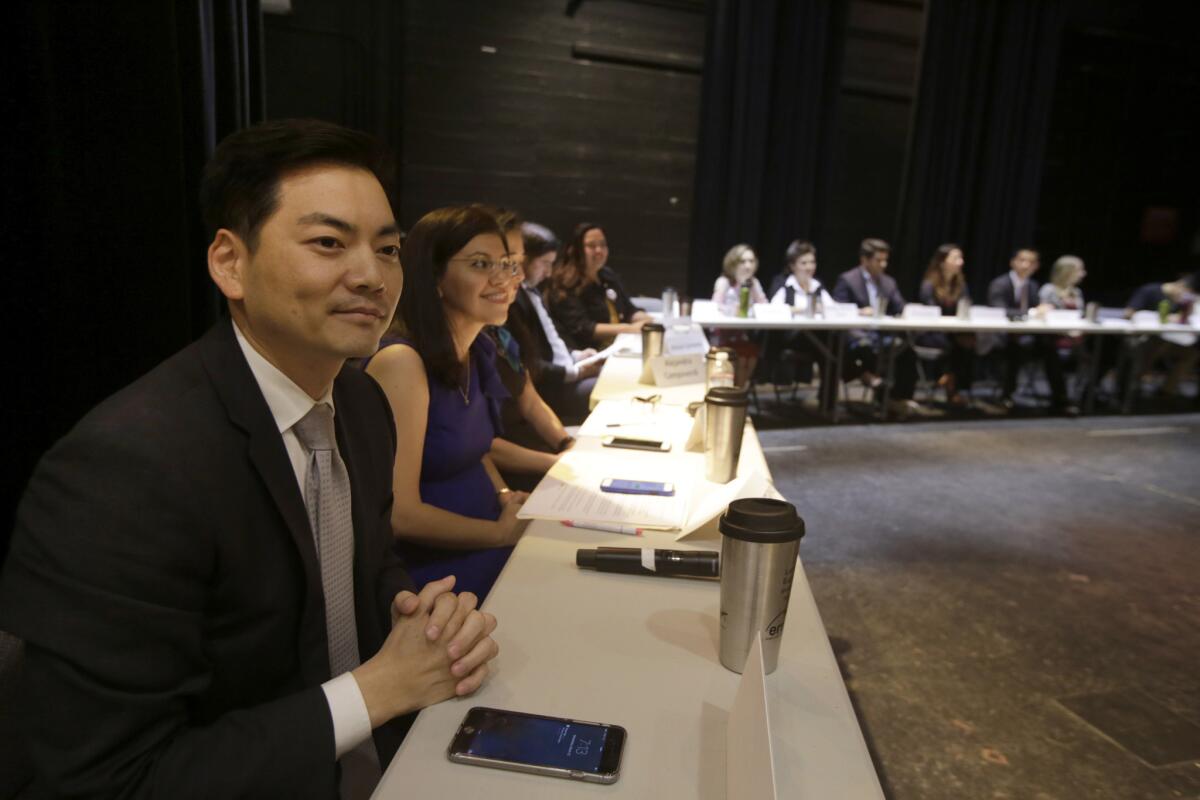
Congressional candidate Robert Lee Ahn far outstripped some of the top fundraisers in the 34th Congressional District, taking a surprise lead in campaign finance reports filed Thursday.
The reports cover fundraising and spending between Jan. 1 and March 15 and will be the last numbers we’ll have before the April 4 primary election, in which 24 candidates are running.
Ahn, a former L.A. city planning commissioner, raised a whopping $338,702 in contributions and loaned himself an additional $295,000, bringing his total to more than $630,000 raised since January. Ahn, an attorney and the only Korean American candidate in the race for a district that includes Koreatown, got more than $100,000 in contributions from donors with Korean surnames.
The closest behind Ahn was Assemblyman Jimmy Gomez, who raised $244,766 over the same period, the majority of it from political action committees, including many donations from fellow legislators in Sacramento. Sara Hernandez, a former teacher and L.A. City Hall aide, was close behind Gomez with $224,783 raised. Alejandra Campoverdi, a former White House staffer and former Los Angeles Times employee, raised $156,432.
Ahn has also spent the most money so far this year, at $352,538, and has $271,271 in the bank, more than any other candidate. Gomez ended the period with $274,830 cash on hand, while Hernandez and Campoverdi have $149,990 and $122,961 left to spend, respectively.
- Share via
Dispute in California Senate leads to ethics complaint against leader Kevin de León
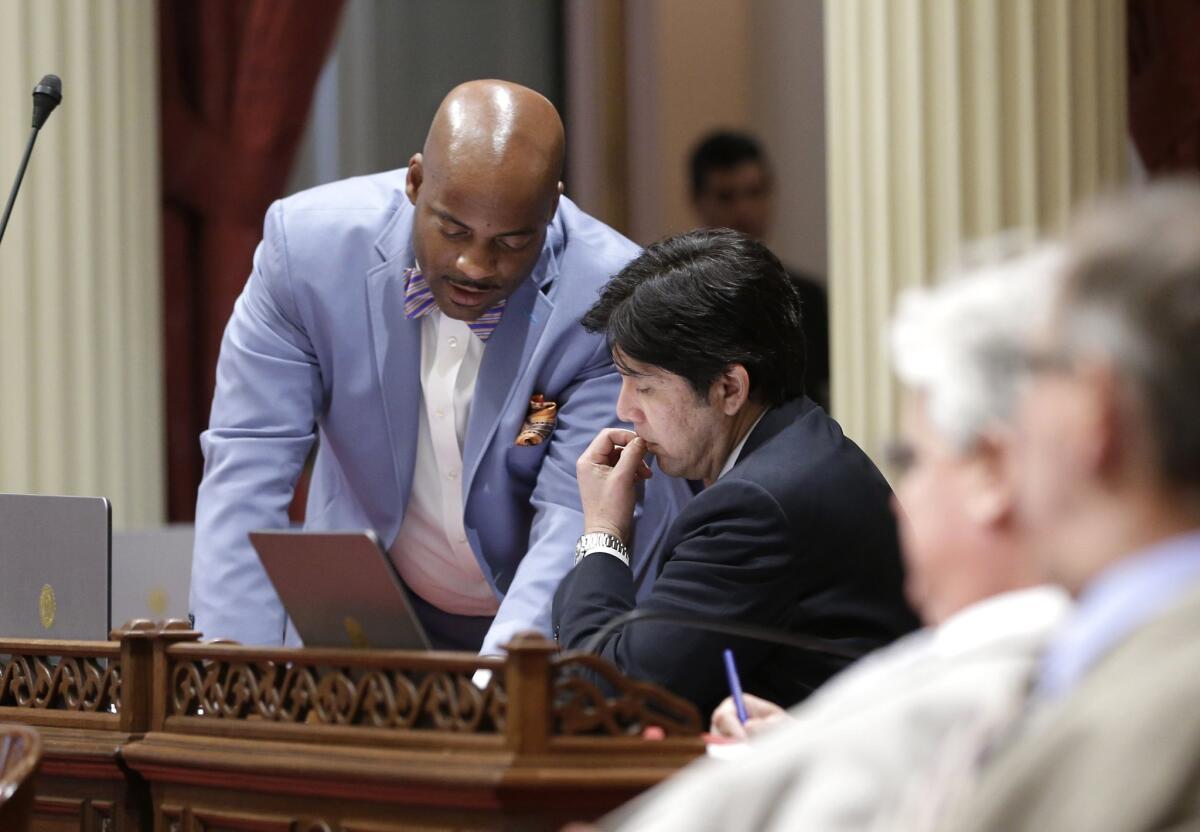
Republican state Sen. Andy Vidak on Friday filed an ethics complaint asking for an investigation into whether Democratic Senate leader Kevin de León engaged in an improper “cover-up” of threats allegedly made by former state Sen. Isadore Hall III against a group of farmers.
Anthony Reyes, a spokesman for De León, defended the decision not to investigate allegations against Hall.
“With due respect, the state Senate doesn’t waste taxpayer resources investigating dubious hearsay accounts of private conversations held in hotel lobbies — and that’s what Senator De León clearly and politely communicated to Senator Vidak,” Reyes said. “Any suggestion otherwise is patently ridiculous.”
Hall, a Democrat from Compton, was appointed in January to the state Agricultural Labor Relations Board by Gov. Jerry Brown. The appointment was opposed by farm industry groups, including the Western Growers Assn., which complained he received contributions from the United Farm Workers for his unsuccessful campaign for Congress last year.
Vidak said that he had heard from multiple people that on Feb. 28, the evening before Hall’s confirmation hearing in the Rules Committee, Hall allegedly made threats in an “obscenity-laced tirade” in the lobby of the Sacramento Hyatt Hotel that he would “get” the farmers opposing his appointment, the senator wrote in a letter to the Senate Legislative Ethics Committee.
The board is a quasi-judicial agency that rules on disputes between farm worker organizations and growers.
The alleged threats were made to four farmers who are members of the California Fresh Fruit Assn., Vidak said.
Vidak said he had formally asked De León, as chairman of the Senate Rules Committee, to have the panel investigate the allegations and report the findings to the Senate.
On Thursday, Vidak said, De León allegedly informed him that there would be no investigation.
“Senator De León told me yesterday that he and the leadership of the CFFA ‘have worked things out so Hall won’t be investigated,‘” Vidak said in a statement Friday. “Is this really how the Senate handles reports of threats and intimidation by someone pending a Senate confirmation vote?”
The association called the allegation that it worked out an agreement with De León “baseless and false.” The group said in a statement that Vidak did not talk to its members before he filed the complaint. “If he did, he would’ve learned there is no agreement and that CFFA remains opposed to the confirmation of Senator Hall,” the group said.
Hall declined to comment on Vidak’s complaint, said J. Antonio Barbosa, the board’s executive secretary, responding on his behalf.
“Further, his testimony at his Senate Rules Committee confirmation hearing makes clear that he will be fair and impartial, make sound decisions, and speak to growers and farmworkers,” Barbosa said.
Reyes disputed Vidak’s allegations.
“Chasing goofy conspiracy theories might fly on President Trump’s Twitter feed, but it has no place in the California Legislature,” Reyes said.
In his letter to the ethics panel, Vidak says his complaint is “that the Senate’s confirmation process of gubernatorial appointees may have been compromised in this situation.”
He asked for an investigation into whether “credible information about potential criminal activity by an unconfirmed gubernatorial appointee” has been “intentionally ignored/withheld,” and whether “a member of the Senate Rules Committee is making arrangements with representatives of private organizations to bury investigations of gubernatorial appointees.”
Updated at 4:40 p.m. to include a comment from the California Fresh Fruit Assn.
- Share via
L.A.’s GOP congressman: ‘It is hard to find a consensus on something that impacts more than 1/6th of our economy’
A handful of California Republicans had declined to take a position on the House GOP’s healthcare bill, and now they won’t have to.
Rep. Steve Knight (R-Palmdale), the only Republican who represents L.A. County, said he was conflicted up until the vote on the bill was canceled Friday afternoon.
“In the past two weeks my colleagues worked to build a consensus on how best to repair our flawed healthcare system and build a patient-centered system that works for the American people,” Knight said in a statement after the vote. “We learned that it is hard to find a consensus on something that impacts more than 1/6th of our economy and the lives of almost every American.”
Saying they didn’t have enough votes to pass it, House Republican leaders canceled a vote on their healthcare bill minutes before vulnerable Republican members like Knight would have had to vote on the effort to repeal and replace the Affordable Care Act.
Knight’s district is among seven Republican districts being targeted by Democrats in 2018, and several of the members who represent those districts never took a stance on the bill, saying they were worried about the effects on their districts and were still hearing from constituents.
Experts estimated millions of Californians would have lost insurance under the bill.
Just two of the targeted members, Rep. Dana Rohrabacher (R-Costa Mesa) and Rep. Mimi Walters (R-Irvine), said they would vote for the bill.
Walters had no comment after the bill was pulled, but the Democratic Congressional Campaign Committee came out swinging, with committee spokesperson Evan Lukaske saying, “Walters now owns this until election day.”
Other targeted members seemed to brush off President Trump’s plan to “let Obamacare go its way for a little while.”
Rep. David Valadao (R-Hanford), who didn’t take a stance on the bill, said afterward Congress needs to keep working on healthcare.
“Congress must come together to enact legislation to stabilize our healthcare market, reduce federal spending, and ensure we are able to maintain access to healthcare for America’s most vulnerable populations. Any potential solution must be thoughtfully considered,” he said in a statement.
Rep. Darrell Issa (R-Vista) flirted with voting against the bill, saying he was “not yet prepared” to support it, but never committed either way.
“The [GOP bill] was an imperfect approach and I believe that we can do better,” he said in a statement. “We will go back to the drawing board and get this right for each and every American concerned with high costs in their healthcare and ever-dwindling choices and access to care.”
- Share via
Despite threat of legal battle with Trump, California stays the course on vehicle emission rules
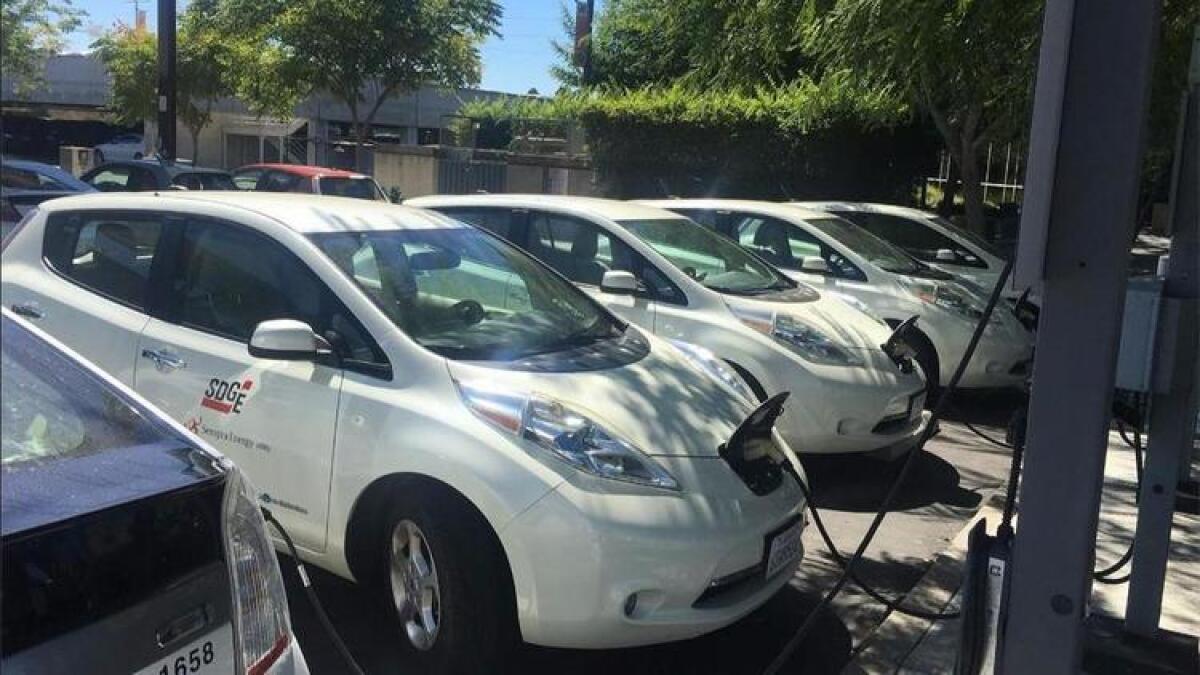
California will keep pushing to reduce greenhouse gas emissions from vehicles, state regulators decided Friday, even though President Trump is preparing to roll back rules in Washington.
The restrictions represent a key part of California’s battle against climate change, and they’re intended to force automakers to build cleaner cars and sell more electric vehicles.
Environmentalists cheered Friday’s decision from the Air Resources Board.
“We’re very disappointed by what we’re seeing at the federal level, so today feels warm and welcoming,” said the Sierra Club’s Kathryn Phillips.
California has the unique ability to set tougher standards than the federal government, but Friday’s decision could put the state on a collision course with Trump. Under the president’s direction, federal officials are examining whether to loosen vehicle rules that were finalized in the waning days of the Obama administration.
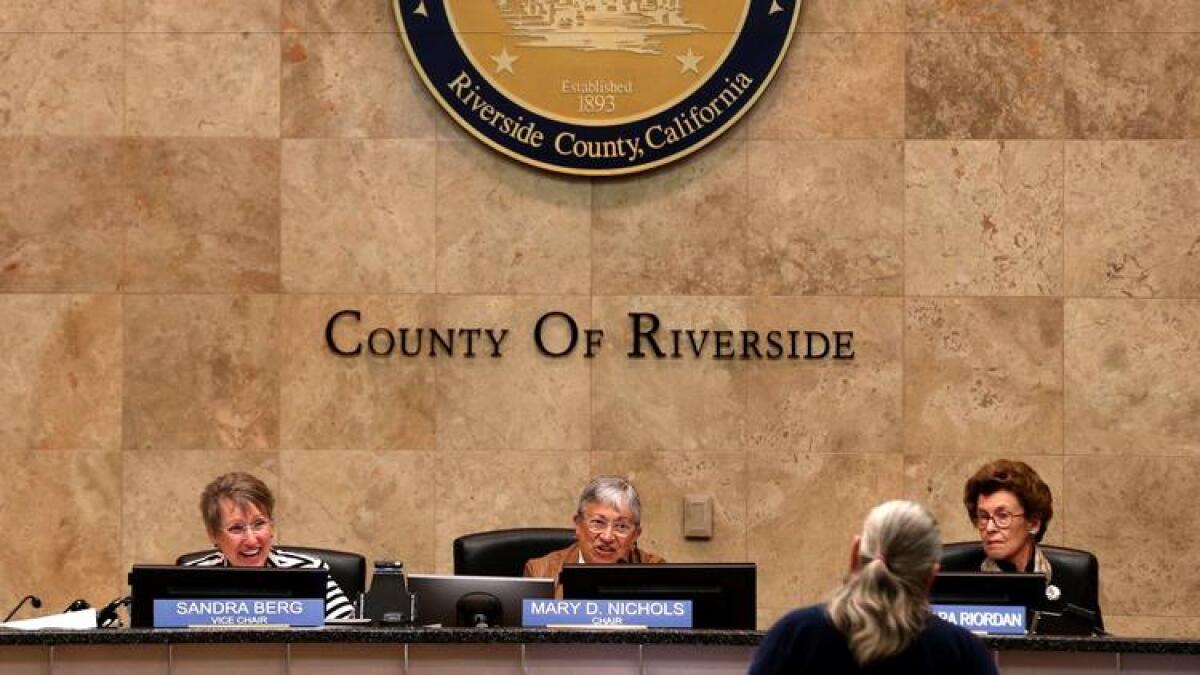
At risk is the existence of a national standard on vehicle emissions, something the auto industry has prioritized to reduce the complexity of its manufacturing operations.
“We should all be getting back to work on this,” said John Bozzella, who advocates for international car companies as head of the Assn. of Global Automakers.
Mary Nichols, chair of the Air Resources Board, questioned the industry’s commitment to higher standards given their request for Trump to review the rules.
“What were you thinking when you threw yourself upon the mercy of the Trump administration?” she said.
A dozen other states have adopted California’s standards as their own, and environmentalists hope Friday’s decision will foster a broader market for electric cars.
“This agency has seen federal administrations come and go,” said Simon Mui of the Natural Resources Defense Council. “But each time, it’s stayed true to its principles” of protecting the environment “when others lag.”
- Share via
House Minority Leader Nancy Pelosi declares failure of GOP healthcare law ‘a victory for all Americans’
And then she actually jumped for joy.
- Share via
California representatives answering their own flooded phone lines ahead of healthcare vote
Tension is high on Capitol Hill as Republican leaders and the White House try to twist a few last arms to get the votes they need ahead of this afternoon’s scheduled vote on the GOP healthcare overhaul bill.
The official debate is going on right now on the House floor (and you can watch it live) but there are no committee hearings scheduled and few public events on the schedule. So members on both sides of the aisle are pitching in to help answer the hundreds of phone calls flooding into their offices to talk about the bill.
All but five of the 14 Republicans in California’s 53-member House delegation say they’ve decided how they will vote. None of the undecided members are posting much on social media right now.
- Share via
California Uber drivers would need only one business license under new legislation

California Uber and Lyft drivers would have to register for only one business license no matter where they drive in the state under a bill unveiled this week by a Los Angeles lawmaker.
Senate Bill 182 from state Sen. Steven Bradford (D-Los Angeles) attempts to make it easier for drivers to comply with local rules governing taxation and registration for independent contractors — an employee classification the companies have long argued fits their drivers.
“This bill would add clarity to the process of obtaining a business license for drivers while protecting working-class Californians from fees and costs that can dramatically impact their ability to do business,” Bradford said in a statement.
California cities and counties have been trying to implement the fees as a way to regulate the fast-growing ride-hailing industry. Last year, San Francisco began pushing drivers to pay the $91 annual fee to register. Drivers have worried that cities will require them to register wherever they drive, creating a web of licenses needed to work legally across different jurisdictions. Bradford’s bill would allow drivers to register with one city and use that license to drive across the entire state.
- Share via
Rep. Duncan Hunter is likely under criminal investigation for alleged campaign finance violations
Rep. Duncan Hunter is likely under criminal investigation by the Department of Justice for allegedly misspending tens of thousands in campaign funds.
The House Ethics Committee disclosed the allegations Thursday in a news release explaining why it is not pursuing its own investigation of the Alpine Republican.
A report by the independent Office of Congressional Ethics released Thursday detailed allegations that Hunter used his campaign money for personal benefit. The office’s board voted unanimously to send the matter to the House Ethics Committee in August for further investigation.
The Justice Department has not confirmed the existence of an investigation, nor detailed what crimes it suspects Hunter or members of his campaign may have committed.
Read More8:38 p.m. This post was corrected to reflect the scope of the potentially misspent funds was in the tens of thousands, not hundreds of thousands. It was originally published at 11:17 a.m.
- Share via
20 candidates in L.A.’s congressional race spoke at a forum Wednesday. Here’s how they described themselves in one word
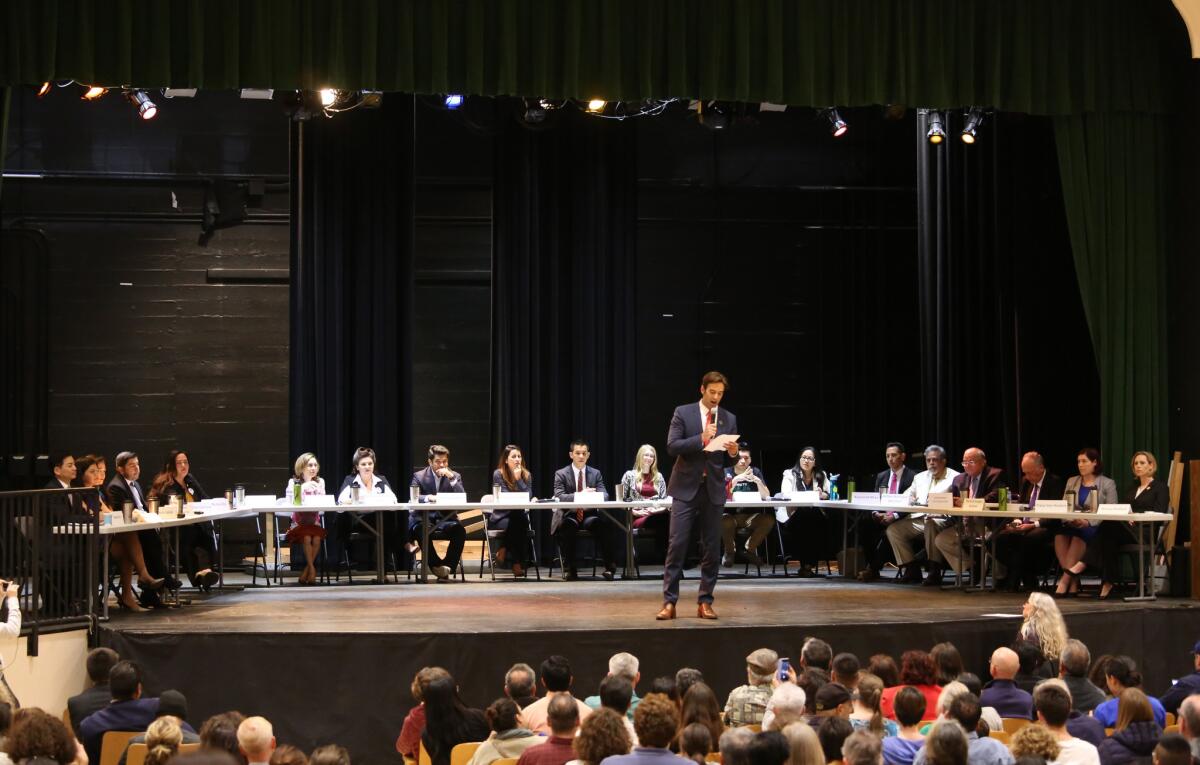
All but four of the 24 candidates running for Congress in L.A.’s 34th Congressional District showed up at a forum in Eagle Rock on Wednesday night.
With a nearly full roster on stage, moderator Elex Michaelson got through an impressive three full policy questions with the candidates.
But the final question injected a bit of fun and called for some creativity from the candidates, many of whom struggled to keep to the one-minute time limit all night.
Here’s how each candidate described themselves in one word:
- Robert Ahn: Independent
- Vanessa Aramayo: Effective
- Maria Cabildo: Relentless
- Alejandra Campoverdi: Empathy
- Arturo Carmona: Bold
- Wendy Carrillo: Unapologetic
- Yolie Flores: Integrity
- Melissa “Sharkie” Garza: Mysterious
- Jimmy Gomez: Accessible
- Sara Hernandez: Solutions-oriented
- Steven Mac: Selfless service
- Angela McArdle: Strong
- Kenneth Mejia: Revolution
- Sandra Mendoza: Relentless
- Raymond Meza: Neighbor
- William “Rodriguez” Morrison: Transparency
- Armando Sotomayor: Compassion
- Richard Sullivan: Congressman
- Tracy Van Houten: Badass
- Tenaya Wallace: Engage
For more coverage from the forum, follow this thread. You can watch the forum in its entirety here.
FOR THE RECORD:
7:12 p.m. A previous version of this post incorrectly stated there were 21 candidates at the forum.
- Share via
Candidates for California governor touch on role of charter schools at a cordial forum
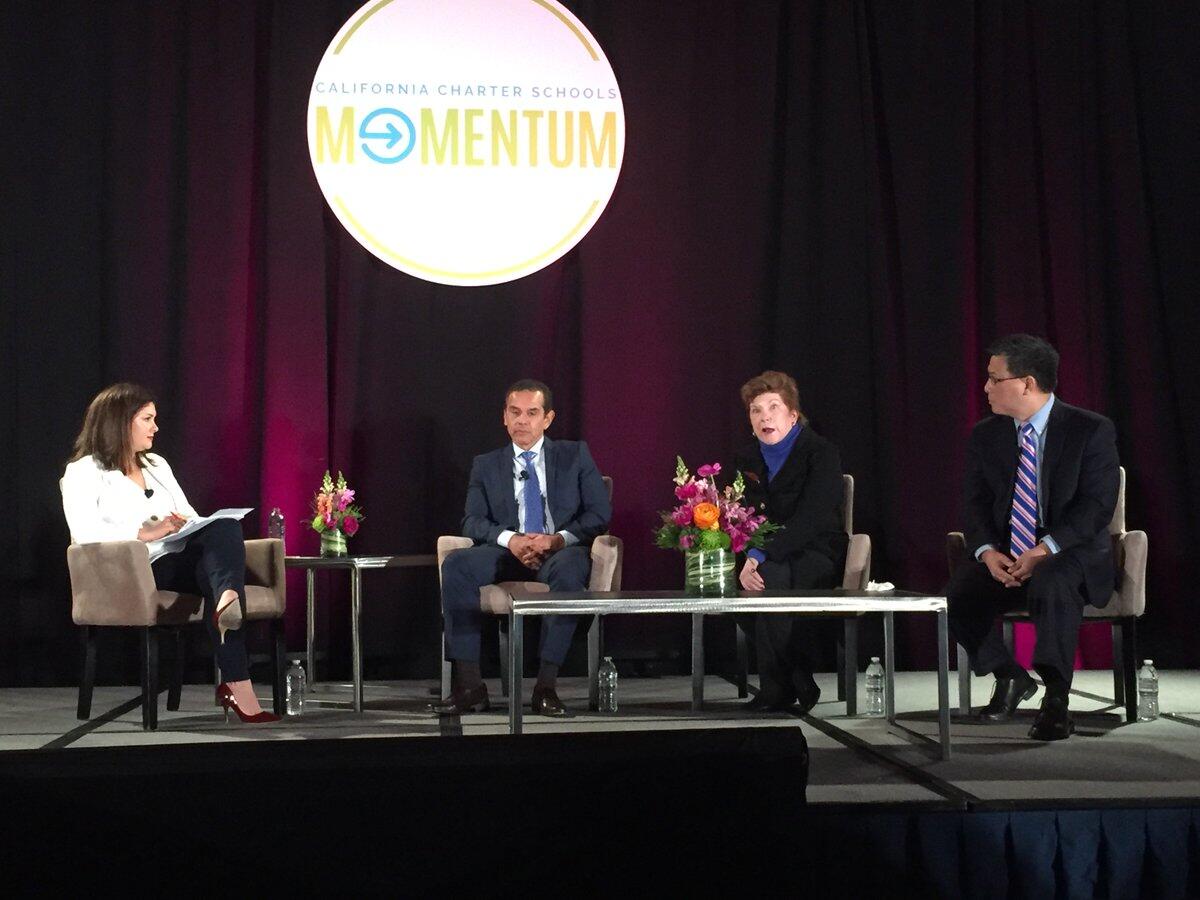
Former Los Angeles Mayor Antonio Villaraigosa, state Treasurer John Chiang and former state Supt. of Public Instruction Delaine Eastin all called for more education funding and were pressed on their charter school views in a 2018 gubernatorial forum Thursday.
The three Democrats hewed much more toward cordial than confrontational at the California Charter School Assn. forum in Sacramento.
Eastin, who serves on the board of the SIATech California Charter Schools, was clearly in her element, winning applause when she criticized state leaders for allowing California’s per pupil funding to slip to the bottom of the national average and for spending more on building prisons than on building colleges over the last 50 years.
Eastin also received the biggest laughs inside the Sacramento Convention Center ballroom, including for her comments in favor of more reasonable, and accurate, ways to assess student performance.
“As my dad used to remind us kids, you don’t fatten a hog by weighing it more often,” Eastin said.
Villaraigosa emphasized the successes of the Partnership for Los Angeles Schools during his eight years as mayor. The partnership manages 16 traditional public schools under a contract with L.A. Unified and dramatically increased graduation rates.
He also praised the work of successful charter schools, saying they are proof that public schools can be run more effectively and efficiently. And he took a not-too-subtle shot at teachers unions for “blocking and tackling” efforts to expand and preserve charter schools.
“Look, the deck is stacked against us. Let’s be clear,” Villaraigosa said. “There are folks who systematically try to stop the expansion of charters.”
Chiang focused on the need for transparency on funding and educational achievements at all schools, including charters, saying California taxpayers will remain wary about spending more money unless they are assured it will be well-spent.
“We have to make sure people trust how we’re going to spend money,” he said.
Lt. Gov. Gavin Newsom, who was the first major candidate to jump into the governor’s race, did not attend the event. His spokesman said he was in Colorado attending the wedding of his wife’s sister.
Republican candidates John Cox of Rancho Santa Fe and former Assemblyman David Hadley of Manhattan Beach weren’t there because the group sent invitations before those candidates entered the race, a spokeswoman for the schools association said.
- Share via
California’s doctors in Congress both laid out their objections to the healthcare bill in videos today
While House Republicans spent the day Thursday trying to reach agreement among themselves on their healthcare bill and ended up delaying the vote that was scheduled to take place, Democrats have been using one of the few tools available to them to stop the bill: public perception.
That meant press conferences, social media pleas for people to call Republican members and a lot of television appearances.
That included the two Democratic medical doctors in Congress, both Californians, who laid out their objections to the bill on Thurday.
Rep. Raul Ruiz (D-Palm Desert) donned a white lab coat reminiscent of his days as an emergency room physician and broke down what he thinks is wrong with Republicans’ plan in a Facebook video.
Rep. Ami Bera (D-Elk Grove), who taught at the UC Davis medical school and was Sacramento County’s chief medical officer before being elected to Congress, also gave his take on the bill.
- Share via
If you want a friend in Washington, they say you should get a dog, and these California lawmakers did
Tension is high on Capitol Hill as Republicans try to reach an agreement on their healthcare bill. It also happens to be National Puppy Day, and a few members got into the spirit and highlighted either their own dogs or staffers’ dogs, some of whom greet visitors to their offices during the workweek.
- Share via
Quite a few Californians are at the center of Intelligence Committee furor sparked by Rep. Devin Nunes
California Democrats hold an outsize role on the House Select Intelligence Committee, and they’re now front and center in the furor over whether its investigation into Russian attempts to influence the 2016 election will continue.
Committee Chairman Devin Nunes (R-Tulare) made a surprise announcement Wednesday, telling reporters that U.S. intelligence agencies inadvertently intercepted communications involving the Trump transition team late last year. He informed President Trump first, which has caused Democrats on the committee, including three Californians, to question his commitment to the investigation.
The ranking Democrat on the committee, Rep. Adam Schiff (D-Burbank), responded with a news conference of his own Wednesday evening.
“The chairman will either need to decide if he’s leading an investigation into conduct which includes allegations of potential coordination between the Trump campaign and the Russians, or he is going to act as a surrogate of the White House. Because he cannot do both,” Schiff told reporters.
The two committee leaders have served in the same congressional delegation for more than a decade. The Intelligence Committee’s work is normally largely nonpartisan and classified, and Nunes and Schiff are known for working together. Just a few days ago, their relationship seemed to be going well even amidst the rancorous debate over Russia’s election involvement and intelligence leaks about it.
All House Democrats have signed onto a bill asking for an independent commission to do a nonpartisan investigation into Russia’s attempts to affect the outcome of the 2016 presidential race, and they reiterated that push Thursday after Nunes’ White House visit.
Rep. Jackie Speier (D-Hillsborough) told CNN that Nunes has apologized for not coming to the committee first.
Other Californians on the committee immediately expressed their frustration as well, saying the move hurt the investigation’s credibility.
“The chairman’s actions and closeness to a president whose campaign is under federal investigation have gravely damaged the investigation’s credibility,” said Rep. Eric Swalwell (D-Dublin).
House Minority Leader Nancy Pelosi (D-San Francisco) said Nunes bypassing the committee was an act of “diversion and desperation” and called him a “stooge.”
- Share via
Gov. Jerry Brown laments ‘poisoned’ nature of talks to avoid nuclear war
Gov. Jerry Brown said the politics over nuclear warfare have become “poisoned” as he searches for ways to take a larger role in the debate.
Brown wrapped up his four-day visit to Washington, D.C., with a meeting of the Nuclear Threat Initiative, a nonprofit whose board of directors he joined this year.
“It’s very important to open channels of communication,” Brown said in an interview after the meeting. “Because there’s no way for the future to be safe unless there’s far more dialogue, and ultimately understanding and mutual agreements together.”
The governor scheduled meetings with federal and congressional representatives to coincide with the nuclear group’s gathering. He did not, however, make a visit to the White House.
Brown said “there is a role” he can play in advocating for nuclear disarmament, an issue he’s been passionate about for decades.
The governor is scheduled to tape an appearance on NBC’s “Meet the Press” before flying back to Sacramento on Thursday night.
- Share via
California Legislature urged to play oversight role on Olympics proposal to prevent cost overruns
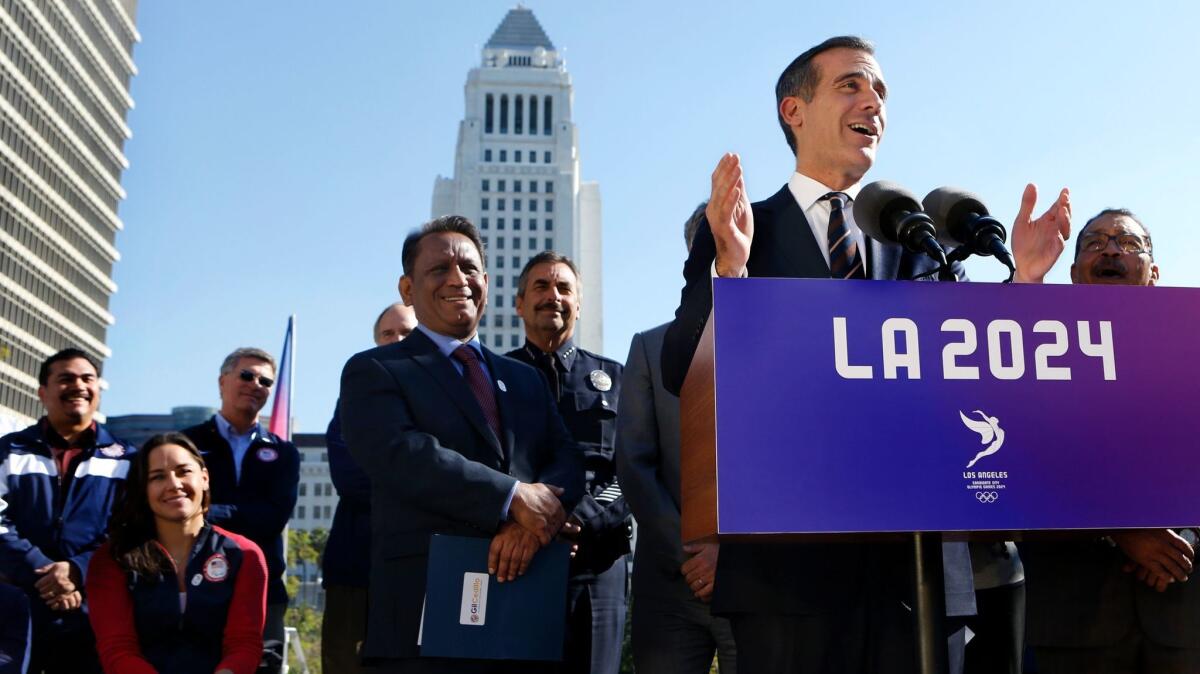
Los Angeles’ bid to host the 2024 Olympics requires state agencies to begin planning for their significant role and for state officials to guard against changes that might put the venture at financial risk, the state Legislative Analyst’s Office warned Thursday.
A report from the LAO noted that the state approved a $250-million guarantee last year to cover any cost overruns should Los Angeles be chosen over Paris to host the games.
“If Los Angeles is chosen to host the Olympics, the Legislature, with its ability to provide oversight to state departments, can play a constructive role in making the Games a success and keeping its financial risks low,” the report said. “In so doing, the Legislature can reduce the chance that any of the $250 million guarantee will ever need to be paid from the state treasury.”
State agencies that would be required to assist in the Olympics include the California Highway Patrol, Caltrans, the military department, the Office of Emergency Services, the university systems, the state parks system, the California Science Center, which is adjacent to the Coliseum, and gambling regulators, who would monitor potential illegal betting.
“State departments need to help LA 2024 prepare, as well as make sure the Governor is prepared as he enters into negotiations with LA 2024 [over the terms of the state guarantee],” the report says.
- Share via
Former Gov. Pete Wilson looks back on Proposition 187 and says, heck yeah, he’d support it all over again
For a time, no California politician was more formidable than Republican Pete Wilson.
Over two decades, the popular former San Diego mayor enjoyed a record of nearly unbroken success, besting Gov. Jerry Brown in 1982 to seize a U.S. Senate seat and toppling San Francisco Mayor Dianne Feinstein eight years later to win the governorship.
He served in Sacramento during a time of epic upheaval, staring down a massive budget deficit and a series of biblical natural disasters: drought, earthquakes, fire, floods.
If Wilson is renowned for one thing, however, it is Proposition 187, the controversial ballot measure that sought to stem illegal immigration and address its costs by cutting off state services, including healthcare and public education, to those in the country illegally.
While Wilson’s support of the initiative helped rescue his flailing campaign for reelection as governor, the victory badly damaged Republicans by alienating Latinos in the state and nationwide.
Now, at 83, Wilson is waging what amounts to his final — and certainly his most personal — campaign, an effort to shape how he’ll best be recollected, and he says there was nothing racist about his pushing the controversial measure.
- Share via
Justice Department investigating California Rep. Duncan Hunter’s campaign spending
- Share via
Vehicle rules, ‘super pollutants’ on the agenda for California regulators

California’s powerful Air Resources Board began a marathon two-day meeting here on Thursday as regulators prepared new steps to curb climate change and vehicle emissions.
The board is expected on Thursday to approve a new strategy for reducing short-lived climate pollutants, which include methane from cow manure at dairies and exhaust from diesel engines. The pollutants are considered particularly harmful to the atmosphere, and the state hopes to set a standard that other governments can follow around the world.
“We’re the first in the world to do this,” said state Sen. Ricardo Lara (D-Bell Gardens), who authored the legislation requiring regulators to create the new strategy. “I’m very proud of this.”
On Friday, the board is scheduled to consider rules for vehicle emissions. While California plans to push forward with the regulations, President Trump has begun the process of rolling them back in Washington.
The state has the unique authority to set tougher rules than federal standards, and its decision could preface legal battles between California and the Trump administration.
- Share via
California files brief supporting challenge to Trump’s threat against ‘sanctuary’ cities and counties
State Atty. Gen. Xavier Becerra on Wednesday filed a brief in support of a Santa Clara County lawsuit challenging President Trump’s executive order targeting “sanctuary” cities that refuse to help federal authorities enforce immigration laws.
The amicus brief cites Trump’s threat to withhold federal funds from sanctuary cities and counties as well as the state’s interest in protecting state laws and policies that promote public safety and protect the constitutional rights of residents, Becerra said.
“Any attempt by Donald Trump to hijack state and local resources to do the Trump administration’s bidding raises serious constitutional questions and threatens the safety of our communities,” Becerra said. “California has a sovereign right and responsibility to protect the safety and the constitutional rights of its residents, and that is what we will continue to do.”
The filing is the fifth amicus brief filed by Becerra in lawsuits challenging Trump orders.
- Share via
Write-in candidate qualifies for 34th Congressional District race, but says she’s supporting candidate Robert Lee Ahn
Michelle “Hope” Walker, a 45-year-old comedian and activist, has qualified as a write-in candidate in the 34th Congressional District, making her the 24th hopeful to enter the race.
Though Walker qualified as a write-in candidate after submitting 61 nominating signatures, she says she tried to withdraw her name but county elections officials told her it was too late.
She is now supporting fellow candidate Robert Lee Ahn, an attorney and former planning commissioner. “I think I might be better off speaking, evangelizing in the community,” Walker said. If she wins, she adds, she would serve “because the people chose me.”
Walker, a Democrat, formed a federal campaign committee to run for president as an independent last year, but did not appear on the California ballot. She also ran for state Assembly in 2014 against Miguel Santiago and received 12% of the vote in the primary.
- Share via
There’s a problem with sample ballots in L.A.’s congressional race, and it could have affected thousands of voters
An unknown number of voters who received Korean-language voting materials in the 34th Congressional District race may have received incorrectly printed sample ballots.
The incorrect pamphlets list the 23 candidates on the ballot in the wrong order. If Korean-language voters used the erroneous sample ballots to cast their vote, they may have inadvertently voted for the wrong candidate.
The sample ballots, booklets that list each candidate’s name and the corresponding number to fill in on the actual ballot, were mailed to some 8,200 Korean-language speakers ahead of the April 4 election. It’s not clear how many of them were affected.
According to the L.A. County Registrar’s office, an error made by its printing and mailing vendor caused some Korean-language voters to receive sample ballots that shift the order of candidates.
Campaign staffers for Korean American Robert Lee Ahn said that in some cases the Korean ballot materials differed from English-language ballots mailed to other voters in the same home or apartment building.
A supporter told Ahn about the error, said campaign consultant Darby Levin.
“We’re reaching out to the people who may have been affected,” said L.A. County registrar spokeswoman Brenda Duran.
All voters in the 34th district have received English-language sample ballots. Voters who request Korean-language election materials were also sent sample ballots in Korean. And those who vote by mail receive yet another sample ballot, in their language of choice, with their actual ballot.
Voting officials have stressed that the Korean-language sample ballots included with the actual ballots were not affected. No other translated ballot materials were affected either, Duran said.
Ballot order is supposed to rotate but by state law should only vary from one Assembly District to another. The 34th Congressional District, for example, contains Assembly Districts 51 and 53, and voters in one district should receive a ballot with names listed in a different order from voters in the other.
At some point, officials say, voters in the 53rd Assembly District, which includes Koreatown, received Korean-language sample ballots printed for Assembly District 51.

Ahn’s campaign is crying foul. “This is voter suppression,” Levin said. “They are trying to confuse Korean voters.”
Ahn, who has been gaining momentum as Korean Americans have appeared to mobilize for him, would be the only Korean American in Congress if elected. He has received attention from the Korean American press and his campaign says it has registered more than 600 new voters in the Korean community.
Nearly 9,000 votes have already been mailed in and an estimated 1,000 of those are Korean-language voters. For voters concerned they may have already submitted incorrect ballots, it’s unclear whether anything can be done for them. “We have to still look into that. We’re not sure yet what can be done,” Duran said.
Officials know of at least two voters who received the incorrect materials, but they still don’t know the magnitude of the problem.
“The vendor can’t tell us exactly where the problem happened,” said Debbie Martin, chief deputy of the L.A. County registrar-recorder.
They are sending notices to all Korean-language voters informing them of the anomaly. The letter, which will be mailed out Wednesday in English and Korean, asks voters to check their sample ballot and includes a corrected sample to help them compare. It also tells voters that a corrected sample ballot will be sent out “within a few days,” Duran said.
Until then, officials say Korean-language voters who have not yet mailed their ballots should hold on to them until they receive the corrected materials.
Anyone who encounters voting problems or has questions can call the registrar at 800-815-2666; Korean speakers can call 800-481-8683.
- Share via
California Gov. Jerry Brown on paying for universal healthcare: ‘How do you do that?’
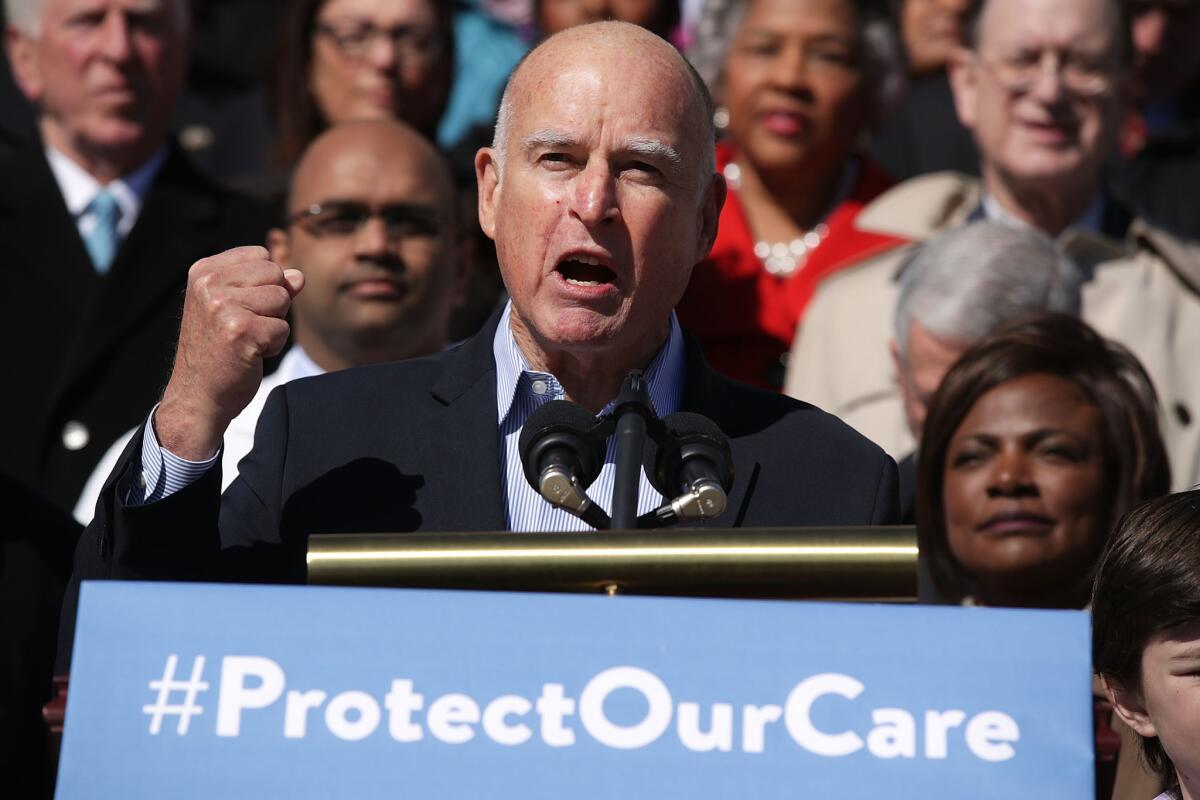
Gov. Jerry Brown stuck to his skeptical view on matters of broad healthcare reform on Wednesday, dismissing the idea of a universal healthcare system as something akin to a financial impossibility.
“Where do you get the extra money? This is the whole question,” Brown said in an interview after wrapping up a day’s worth of events and meetings in Washington.
The governor won applause at an earlier Capitol event in the day, criticizing Republican efforts to replace the Affordable Care Act with a smaller, cheaper program.
But in the wide-ranging discussion with reporters later, he dismissed any notion that it might soon be time to look for a different way to fund healthcare in California — including the idea of a single-payer, universal system.
“I don’t even get it,” said the governor. “How do you do that?”
He pointed out that the overall cost of medical care in California is equal to 18% of the state’s gross domestic product, which would be about $450 billion.
“You take a problem and say I’m going to solve it by something that’s even a bigger problem, which makes no sense,” he said.
Brown also rejected the idea that it might soon be time to look for ways of finding the billions of dollars his administration thinks would be cut if the GOP healthcare plan is enacted.
“The first idea is to do everything to prevent it from happening,” he said of the Republican plan. “That story will be known in a few weeks; we’ll go from there.”
- Share via
Former Assemblywoman Cheryl Brown exploring possible rematch for San Bernardino seat
- Share via
California has a new voter registration record: 19.43 million are signed up to vote
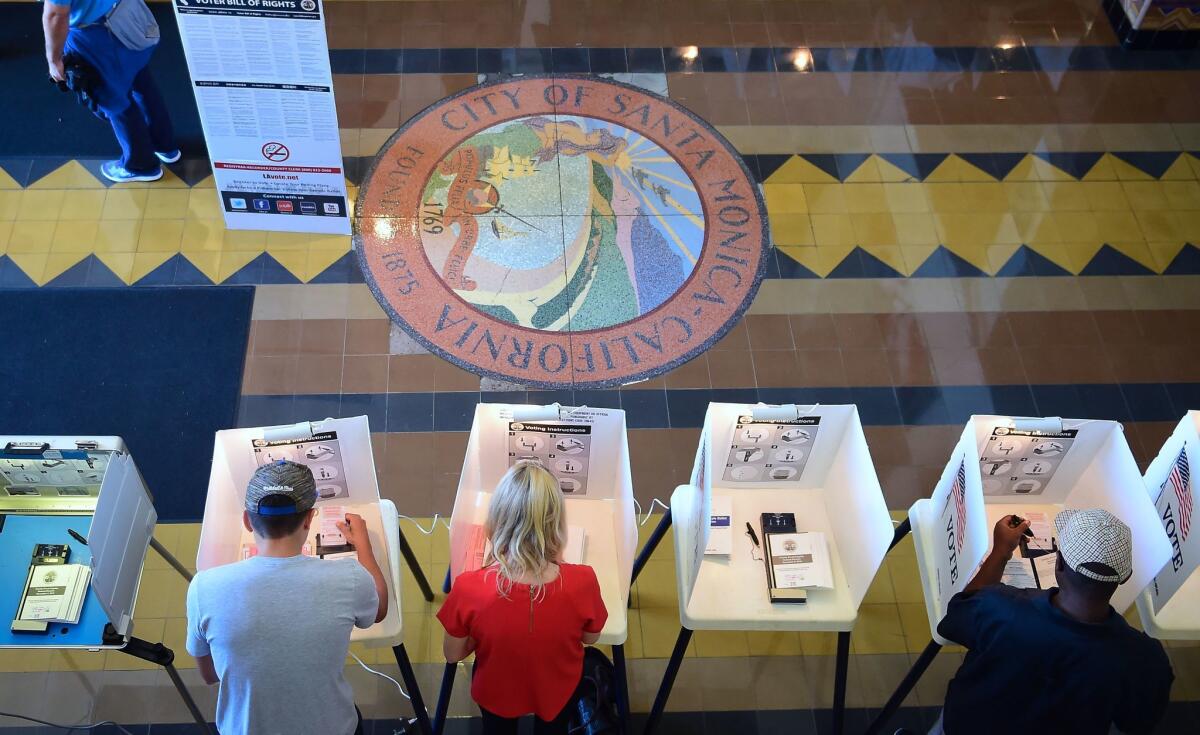
Following the hotly contested 2016 presidential election, California has set a new voter registration record, with 19.43 million residents now signed up to vote.
More than 20,000 voters have been added to the rolls since Oct. 24, an unusual increase after a presidential election, according to Secretary of State Alex Padilla, who released the new voter registration numbers Wednesday.
The state saw a net gain of more than 1.7 million new voters since the same report was released in February 2015, and a record 14.6 million California voters cast ballots in the November elections.
Party registration trends are holding steady, according to the new numbers.
Republicans trailed Democrats in registration by more than 18%, according to the California Secretary of State’s official voter registration report released Wednesday. Of Californians registered to vote, Democrats accounted for 44.8% and Republicans 25.9%.
Unaffiliated voters, known in California as those who have “no party preference,” were a close third and made up more than 24.5% of statewide registration.
Over the past decade, Democratic voter registration has remained relatively the same percentage-wise, increasing by just over 2% since February 2007. Republican registration has continued to slide, dropping by more than 8% during that time.
As of Feb. 10, an estimated 77.9% of Californians who were eligible to vote have registered, according to the report.
- Share via
Former Assemblywoman Susan Bonilla won’t run for state insurance commissioner
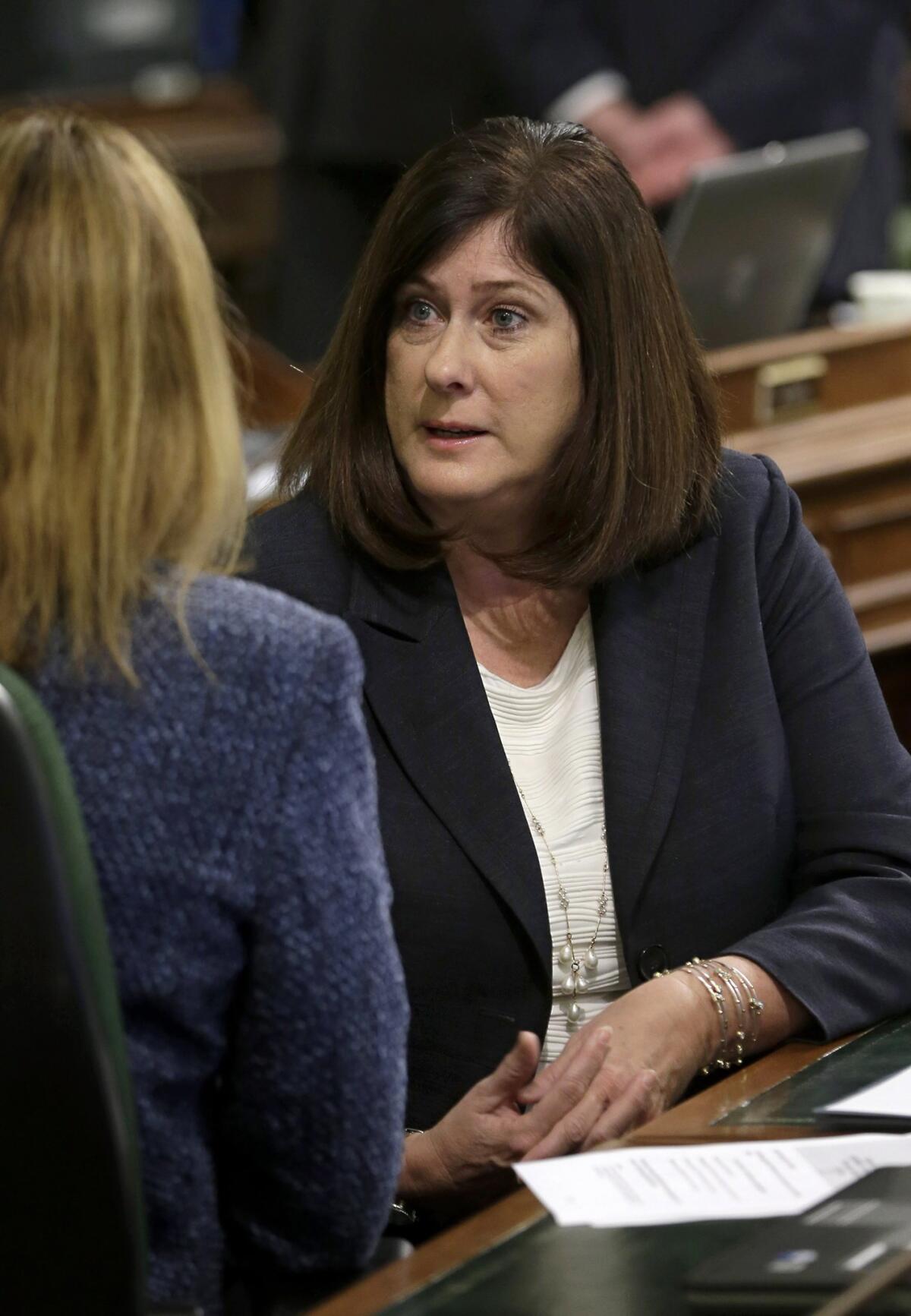
Former Democratic Assemblywoman Susan Bonilla announced Wednesday that she will not run for state insurance commissioner in 2018 and instead endorsed state Sen. Ricardo Lara (D-Bell Gardens) for the statewide post.
Bonilla’s announcement came on the same day that Lara’s campaign for insurance commissioner got a boost from endorsements by Senate President Pro Tem Kevin de León and California State Assembly Speaker Anthony Rendon.
Bonilla is one of four Democrats who had formed campaign finance committees for possible runs for insurance commissioner.
“I’m pleased to endorse my friend State Senator Ricardo Lara for Insurance Commissioner,” she said in a statement. “ He’s been a warrior for the people of California on a broad spectrum of issues, but particularly when it comes to social and economic justice causes.”
Lara started out his government career as a legislative aide to De León when the leader was in the Assembly, and has been a top lieutenant of his during their service together in the Senate.
“Ricardo Lara embodies the bold, progressive and visionary leadership that we need in our next State Insurance Commissioner,” De León said in a statement, citing Lara’s work for the environment, immigrants and low income residents.
Rendon said the race is important because of uncertainty about California programs stemming from the election of President Trump.
Lara, he said, “has built up a dynamic reputation as a change-maker, a fighter, a coalition-builder and as someone who knows how to create movements that lead to positive and meaningful reforms that improve peoples’ lives.”
- Share via
Gov. Jerry Brown warns of at least a $6-billion-a-year hit to California under GOP health plan
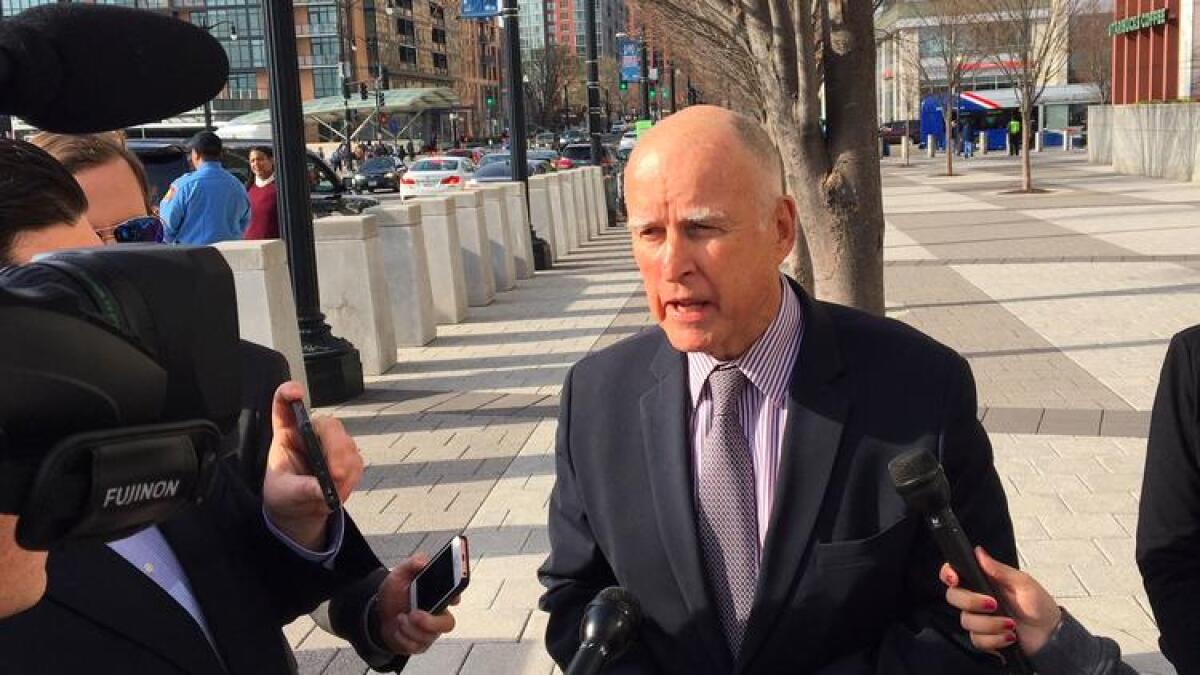
Calling the Republican congressional leadership’s healthcare proposal an “insult to democracy itself,” Gov. Jerry Brown warned Wednesday that the proposal would shift $6 billion in costs a year to California’s state government by 2020.
“It’s real when you, all of a sudden, send a $6-billion tax bill to the state of California,” Brown said in an interview after he delivered remarks alongside Democrats who were on Capitol Hill to mark the seventh anniversary of the Affordable Care Act, known as Obamacare.
“This is devastating,” he said.
On the eve of the vote on the proposed GOP replacement for the Obamacare law, Brown’s administration released an analysis concluding that the annual costs to the state would grow to $24.3 billion by 2027. California embarked on one of the most aggressive implementations of the ACA, with some 4 million residents now covered under its provisions. Most of those receive health benefits through Medi-Cal, the state’s version of the federal Medicaid program for the poor.
Brown delivered a fiery speech at the Obamacare celebration, which featured former Vice President Joe Biden.
“This a dangerous bill, written by people who don’t know what the hell they’re talking about,” said the governor to applause from the politicians and the crowd gathered on the Capitol’s east steps.
The Brown administration’s analysis highlights the Republican plan’s requirement that states repay any Medicaid spending above newly imposed federal caps. It would also limit federal dollars spent on any new enrollees in the state’s Medi-Cal program after 2019.
The governor will return home on Thursday to begin revisions to his budget plans for the fiscal year that begins in July, an already tough task given projections of a $1.6-billion deficit.
Brown has sidestepped any direct criticism of President Trump while in Washington this week but urged the Republican leader to hold true to his campaign promise of providing healthcare coverage for every American.
“This is a death, disease and suffering bill,” the governor said of the GOP plan as he made his way to a meeting with Senate Minority Leader Charles E. Schumer (D-N.Y.). “Mr. Trump should really wake up and change his mind.”
- Share via
Some of the state’s 14 Republican House members still not sure on the GOP’s health bill
A handful of California’s 14 Republican members of Congress say they are still weighing how to vote on the GOP plan to undo and replace parts of the Affordable Care Act.
More than half of California’s Republicans have said they’ll vote yes or are leaning yes. None of the 14 Republicans in the delegation have committed to voting no on the bill, which is scheduled for Thursday.
- Share via
Gov. Jerry Brown in Washington: ‘I came from California to tell the truth about this fake healthcare bill’
- Share via
Juvenile justice bills move forward after young offenders tell their stories
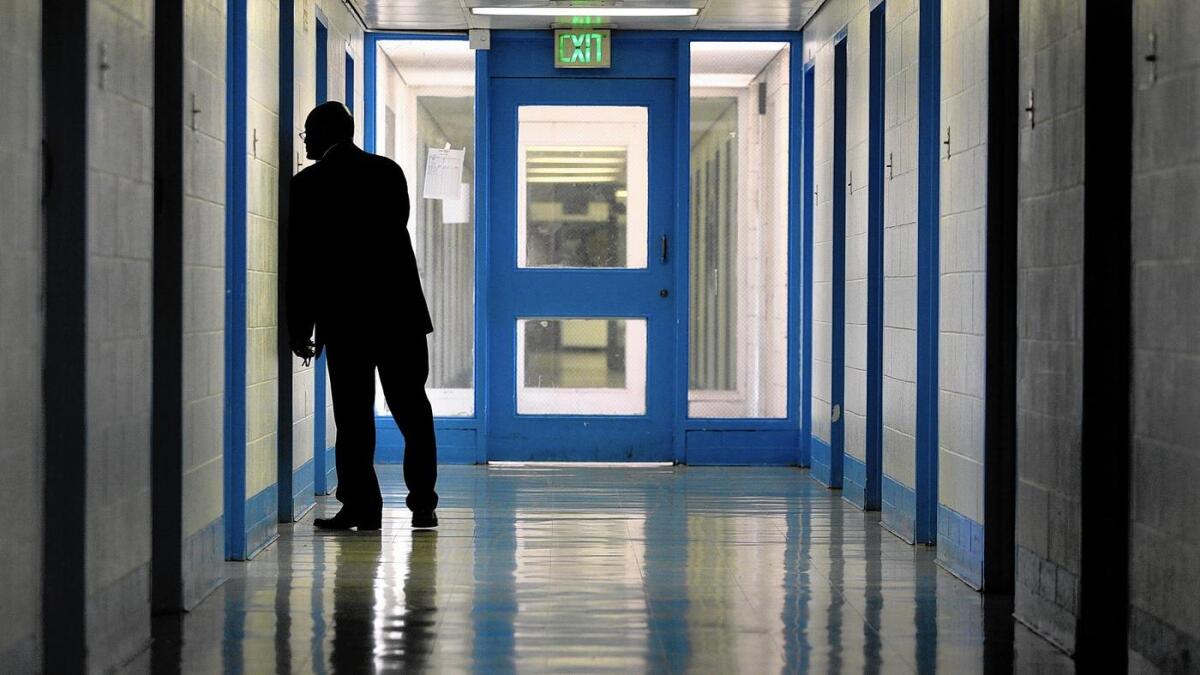
Three juvenile justice bills on Tuesday cleared the state Senate Public Safety Committee, the first in a legislative package that aims to divert children from the path to prison.
Two of the proposals co-authored by Sens. Holly Mitchell (D-Los Angeles) and Ricardo Lara (D-Bell Gardens) would ban life without parole sentences for minors and require that juveniles speak with lawyers before waiving their rights. Another would end the costly collection of administrative fees against families with children in juvenile detention.
At Tuesday’s hearing, witnesses urged lawmakers to support legislation they said would ensure the fair treatment of children under the law. But law enforcement groups and prosecutors said it could keep authorities from holding offenders accountable and hinder officers from carrying out investigations.
“We are talking about people who have committed the most egregious crimes,” Laura Tanney, a deputy district attorney in San Diego, said in opposition to the bill that would ease sentencing for the young offenders among the 300 people in California serving life sentences without parole.
Sen. Steven Bradford (D-Gardena) countered they were all either poor or minorities. There’s “not a single rich kid who is doing life without parole,” he said.
Joel Aguilar, now a college student, was one of them until law students helped him get his sentence reduced. He told the committee he was 17 when he was involved in a burglary that led to the death of an innocent man.
His bad decisions haunt him to this day, he said. But the proposed legislation “says to a young person, ‘You are more than your worst act.’” he said. ‘“You are redeemable.’”
- Share via
State bill requiring California police to disclose surveillance equipment clears its first hurdle
Despite no show of public support, the state Senate Public Safety Committee on Tuesday passed a bill that would require law enforcement agencies in California to disclose all of the surveillance equipment they use to the public.
Under the legislation by state Sen. Jerry Hill (D-San Mateo), police and sheriff’s departments would have to submit a plan to local officials — and present it at an open hearing — on what surveillance technology they employ and how, including facial recognition software, drones and social media monitors.
The bill moved out of the public safety committee with a 4-2 vote. It now heads to the state Senate Judiciary Committee for review. But with no witnesses speaking in support, its first hearing Tuesday underscored the balance lawmakers will have to strike between transparency and public safety.
“I think we are all on the same page,” Hill told the committee. “We want to be able to protect our civil liberties, defend and protect our Constitution and make sure law enforcement will have the tools available that will enable them to fight crime in our communities. We just have to find that [right] spot.”
The bill is predicated on two laws that went into effect last year. One requires agencies to draft and publicly post privacy and usage policies if they operate automated license-plate recognition software. Another ordered the same for devices often called “Stingrays” or “Dirtboxes,” which simulate cellphone towers and cast a broad dragnet over communications.
Hill drafted the legislation in an attempt to cover all future surveillance technologies in a quickly evolving field. New amendments expected will expand its provisions to other investigative units, such as those under district attorney offices and the state Department of Justice.
But law enforcement association lobbyists on Tuesday said it went too far, giving criminals a roadmap to police agencies’ crime-fighting technology. Privacy groups argued it did not go far enough to protect civil liberties and could undermine local efforts to draft their own guidelines.
- Share via
Scenes from Gov. Jerry Brown’s visit to Washington
- Share via
Schwarzenegger blasts Trump’s approval numbers: ‘The ratings are in and you got swamped’
Former Gov. Arnold Schwarzenegger continued to blast President Trump on Tuesday, this time mocking his low approval ratings and his budget proposals to cut funding for after-school programs and Meals on Wheels.
“The ratings are in and you got swamped,” Schwarzenegger says in the video, which was shot in Sydney, Australia, and posted on his social media accounts. “Wow. Now you’re in the 30s. But what do you expect, I mean, when you take away after-school programs for children and Meals on Wheels for the poor people. That is not what you call ‘Making America Great Again.’ I mean, who is advising you?”
Schwarzenegger made the remarks one day after Gallup released figures showing the president’s approval rating had dropped to 37%, the lowest since he took office.
The former governor made clear he was not a fan of his fellow Republican during the 2016 presidential race, even as he replaced Trump as the host of “Celebrity Apprentice” for one season. He and the president have an ongoing feud, which has largely played out on social media.
Trump repeatedly ripped Schwarzenegger for the reality competition show’s low ratings during the actor’s time as host, and the former governor responded by questioning the president’s leadership skills.
Schwarzenegger, whose advocacy for after-school programs predates his time tenure as governor, offered to take Trump to a middle-school enrichment effort in Washington, D.C.
“I take you there so you can see the fantastic work they’re doing for the children,” he said. “Let’s do it.”
Schwarzenegger’s remarks come as California’s current governor, Jerry Brown, is visiting lawmakers in the nation’s capital amid concerns that several of the administration’s priorities will particularly harm Californians.
- Share via
Gov. Jerry Brown hits Capitol Hill to meet with California’s congressional delegation
Gov. Jerry Brown found a receptive but unsettled audience on Capitol Hill on Tuesday, with pledges of cooperation but at least one warning that the state could pay a price for its leaders’ criticism of President Trump.
Brown, who is in Washington until Thursday afternoon, spent most of Tuesday shuttling across the Capitol complex for meetings — a day of large crowds and security, with Trump’s meeting on healthcare efforts.
The governor’s meeting with Democrats who represent the state lasted more than an hour, and lawmakers praised Brown for his pragmatic take on an era with deep partisan divides.
“I think the message was, let’s fix problems, let’s engage the administration,” Rep. Lou Correa (D-Santa Ana) said after the morning meeting.
Brown too was impressed.
“They’re very focused on doing right by California,” he said.
A later meeting with Republicans was also described as cordial, but one veteran GOP lawmaker said requests for federal aid on water and infrastructure won’t just be considered in a political vacuum.
“If the political leaders of California are using their authority and their efforts to block President Trump’s efforts to control the illegal flow of immigrants into our country, then they can’t expect to get preferential treatment when it comes to other issues of government,” Rep. Dana Rohrabacher (R-Costa Mesa) said.
The governor also met with California Sen. Kamala Harris and earlier made a brief stop in the office of Sen. Ed Markey (D-Mass.) to discuss climate change.
- Share via
California state Sen. Ricardo Lara announces he’s running for state insurance commissioner in 2018
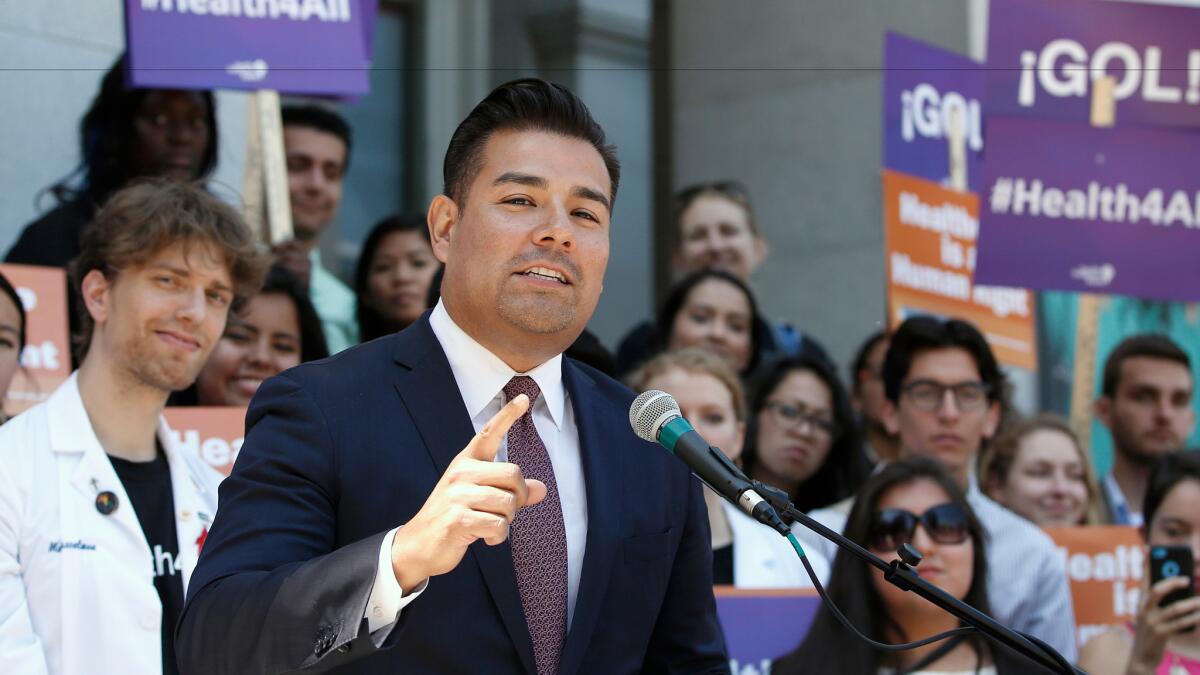
A month after proposing a single-payer healthcare system for California, State Sen. Ricardo Lara (D-Bell Gardens) announced Tuesday he’ll run for state insurance commissioner in 2018.
Lara is one of four Democrats who has filed papers to begin fundraising for a possible candidacy. In his announcement, Lara said strong leadership is needed at a time when President Trump is seeking to repeal the Affordable Care Act.
“I’m running to be California’s next state insurance commissioner because I believe at my core that California needs a strong defender, and a counterpuncher, who will stand up to fight our bullying President, Donald Trump, and his increasingly reckless federal government on issues from healthcare access to economic security and more,” Lara said in a statement.
In addition to proposing a single-payer system for the state, Lara, who is the son of immigrants, won approval for legislation that provides healthcare coverage for children who are in the state illegally. He has also pressed for coverage for adult immigrants willing to pay for their insurance.
Lara, 42, graduated from San Diego State University with a double major in journalism and Spanish. He served in the Assembly for two years before winning election to the state Senate in 2012. He has served as chairman of the California Latino Legislative Caucus and is vice chairman of the California Legislative Lesbian, Gay, Bisexual and Transgender Caucus.
Other prospective candidates who have filed fundraising papers for the insurance commissioner race include former Democratic Assembly members Susan Bonilla and Henry Perea, and Paul Song, a Santa Monica radiation oncologist and former leader of the California progressive group Courage Campaign.
- Share via
Californians leading intelligence committee try to avoid the partisan rifts that sank other investigations
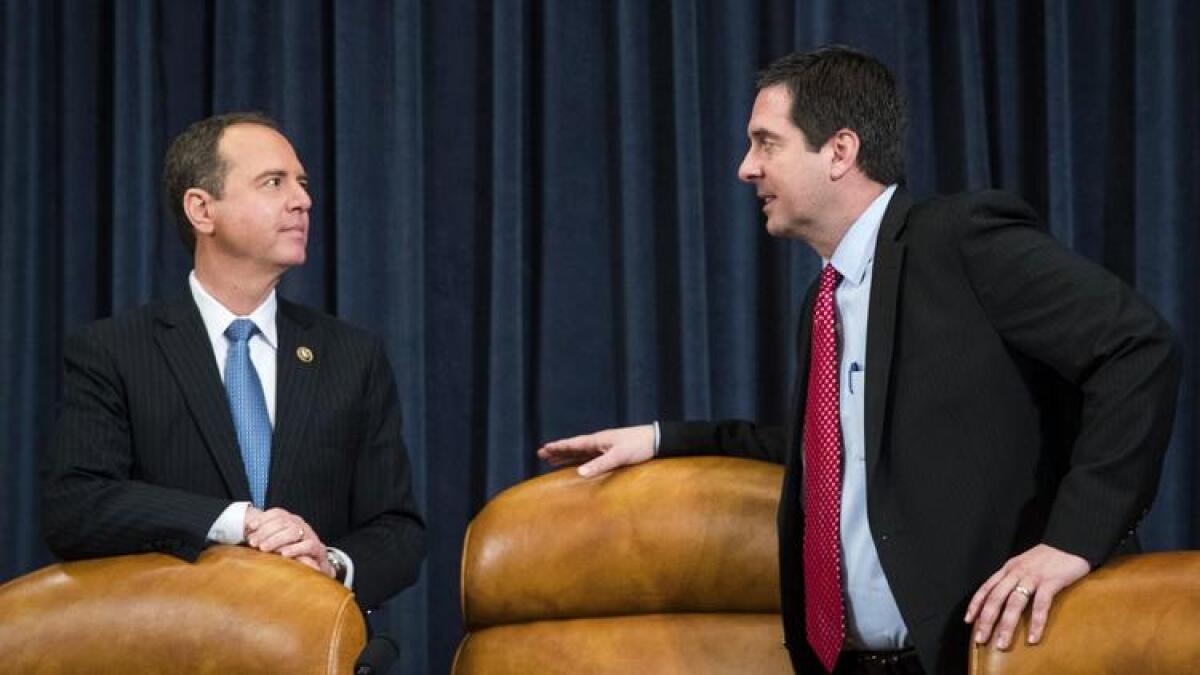
The question of whether the House can carry out an investigation into Russia’s attempts to interfere with the 2016 election has fallen to a pair of soft-spoken Californians: the chairman and ranking minority member of the House Permanent Select Committee on Intelligence, Devin Nunes, a Republican former dairy farmer from Tulare, and Adam Schiff, a Democratic former federal prosecutor from Burbank.
They seemed to pass their first test Monday with a hearing that provided significant testimony and relatively little of the high-volume theatrics that have limited the credibility of other recent congressional investigations.
Whether that will continue is yet to be seen.
- Share via
Gov. Jerry Brown in Washington: ‘Wherever we are going to find common ground, we are going to do it’
When Gov. Jerry Brown landed in Washington on Monday on his mission to raise awareness about the nuclear threat and to secure funding for disaster relief in the state, he didn’t strike the tone of defiance many are looking for from the Democrats’ most influential voice in the west.
Brown is taking a noticeably measured approach to the new White House. Even after President Trump has put himself on a path of confrontation with California on so many issues — threatening the state’s sanctuary cities, its landmark fuel mileage standards and its precarious budget — Brown says he’s not going to be pressured by the left into relentlessly attacking the White House.
“I will pursue my own rhetorical paths,” Brown said to reporters Monday after a meeting at the Federal Emergency Management Agency. “At least in the spirit of advancing the interest of California, recognizing we are a part of the Union and … we are not going a totally separate way. We are distinct. We have a sovereignty. We will pursue that. But we also have a commonality with other states and with the national government. So wherever we are going to find common ground, we are going to do it.”
Brown said he “wouldn’t rule anything out or anything in” when it comes to California’s dealings with Washington.
“Nothing is all that predictable under the current administration,” he said. “That could be a cause for alarm, but also a cause for some optimism and creative possibilities.”
Of course, Brown’s motivation for the trip was to bring attention to the threat of a nuclear apocalypse, which he said is as big a danger now as during any time during the Cold War. But even on that issue he was reluctant to lay blame on Trump, who many disarmament experts caution has elevated the potential for doomsday with his loose talk about nuclear weapons and aggressive posture toward other nations that have nuclear capability.
Asked whether the nuclear threat has increased under Trump, Brown said: “I would say it hasn’t been diminished. I don’t want to speculate. It’s a little early.”
- Share via
Congressional candidates Yolie Flores and Maria Cabildo launch first video ads and play to their strengths
Former L.A. Unified board member Yolie Flores has released her first video ad of her congressional campaign, and it’s focused on education.
The video, which is about two minutes long, features local supporters, including social workers, business owners, a seventh-grader named Esteban and a first-grader named Bella.
In it, Flores, who served on the L.A. Unified board from 2007 to 2011, calls public education “one of the most sacred of our democratic principles,” in between scenes of her surrounded by children in classrooms.
Flores, who now works as chief program officer for the Campaign for Grade-Level Reading, also has a degree in social work.
Maria Cabildo, a former L.A. city planning commissioner who also debuted an ad Monday, chose to focus on an economic message.
In a 48-second ad, Cabildo talks about an economic recovery that “never hit many of our neighborhoods.”
“We need to bring opportunity back to everybody, not just the billionaires that get to sit on Donald Trump’s cabinet,” says Cabildo, a longtime affordable housing developer who now serves as director of homeless initiatives for the L.A. County Community Development Commission.
Flores and Cabildo are two of the 23 candidates running in the April 4 primary to replace Xavier Becerra. If no single candidate receives more than 50% of the vote, a June 6 runoff will be held between the top two finishers.
- Share via
Assembly Democrats aim to put $3-billion bond for parks on 2018 ballot
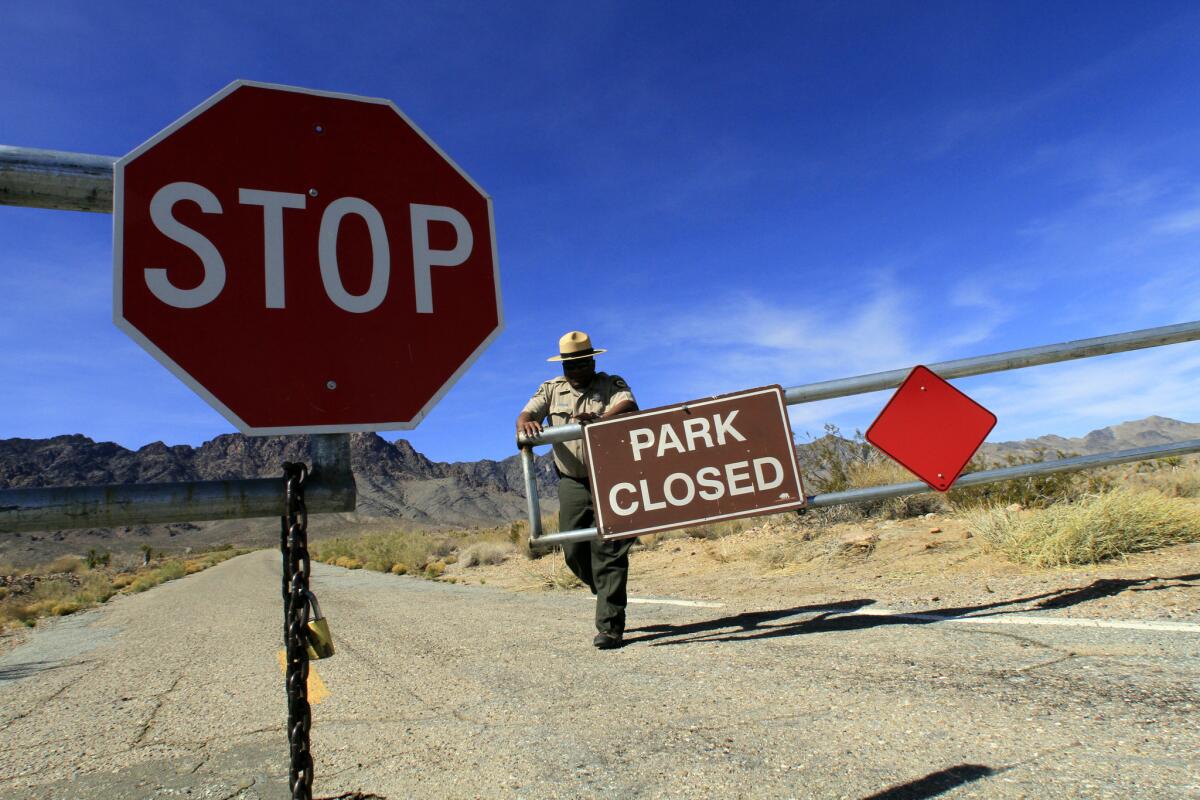
California voters could decide in 2018 whether to approve a $3-billion bond to finance a boost to parks and open space across the state.
The state Assembly approved the measure Monday afternoon, which would provide money to state and local park improvements with an emphasis on funneling dollars to disadvantaged communities.
“It’s hard for people in my communities to have access to healthy environments,” Assemblyman Joaquin Arambula (D-Fresno) said when arguing in favor of the bill.
The measure required a two-thirds supermajority for passage and did so entirely with Democratic votes.
Republican assemblymembers argued that the state should spend the money it has now on parks rather than ask voters to borrow money. They noted the $3-billion bond will require the state to repay $6 billion over three decades.
“It could be done without doubling the price tag,” Assemblyman Jim Patterson (R-Fresno) said.
Before reaching the 2018 ballot, the parks bond needs similar supermajority approval in the state Senate and the signature of Gov. Jerry Brown.
- Share via
California shouldn’t invest in companies that build President Trump’s border wall, lawmakers say

Three state lawmakers have introduced a bill that would require California’s pension funds to divest from any company involved in building President Trump’s proposed wall along the U.S.-Mexico border.
Assembly Bill 946 from Assemblymen Phil Ting (D-San Francisco) and Eduardo Garcia (D-Coachella) and Assemblywoman Lorena Gonzalez Fletcher (D-San Diego) would require the California Public Employee Retirement System and the California State Teachers Retirement System to liquidate any investments in companies that helped build the wall.
“Californians build bridges not walls,” Ting said in a release. “This is a wall of shame and we don’t want any part of it.”
CalPERS and CalSTRS are the nation’s largest and second largest pension funds with nearly $312 billion and $202 billion in investments under their control, respectively. The AB 946 announcement follows last week’s U.S. Customs and Border Protection’s request for companies to submit formal border wall prototypes.
- Share via
Today’s the deadline to register to vote in L.A.’s congressional race
- Share via
Garcetti, other L.A. leaders call on Legislature to end delays on transportation funding plan
A group of officials including Los Angeles Mayor Eric Garcetti on Monday called on state legislators to end a stalemate over approving a transportation funding plan to cover a $130-billion backlog of repairs to California’s roads, bridges and highways.
Current legislation that would raise the gas tax and vehicle fees to generate $5.5 billion annually needs a two-thirds vote of the Legislature but has been bogged down with some Democrats withholding support.
“We have a very simple message for Sacramento today: Fix our streets,” Garcetti said during the rally. “It is time before the April 6 break for the California state Senate and Assembly to do the right thing and fix the streets of our cities and of our region.”
Pressure on legislators was also ratcheted up by Brian Kelly, secretary of the California State Transportation Agency, who said he hopes new legislation will be introduced next week that “will reveal the entirety of the funding plan.”
“The time to act is now,” Kelly said during the rally. “The Legislature has not passed a gas tax increase in 23 years, but over that time things have gotten more expensive.”
County Supervisor Hilda Solis and City Councilman Joe Buscaino also called on lawmakers to reach an agreement.
“Our roads have been neglected to the point that the deterioration is accelerating at an alarming pace,” Buscaino said.
Current legislation would raise the per-gallon gas tax by 12 cents in phases over three years, set the price-based per-gallon excise tax at 17.3 cents, increase the diesel tax by 20 cents, boost the sales tax on fuel by 4% and increase the annual registration fee by $38 for all vehicles.
Some Democratic lawmakers want more money guaranteed for neglected districts and mass transit.
But Garcetti called on the legislators to show leadership and reach a compromise.
“For too long we have let our roads and bridges crumble,” the mayor said. “For too long we have delayed to another month, or another year or another Legislature. For too long we’ve known that a problem exists, we’ve known how to take action, but we haven’t been able to do it.”
- Share via
This California Democrat is proposing a tax on millionaires to make public colleges tuition-free for in-state students
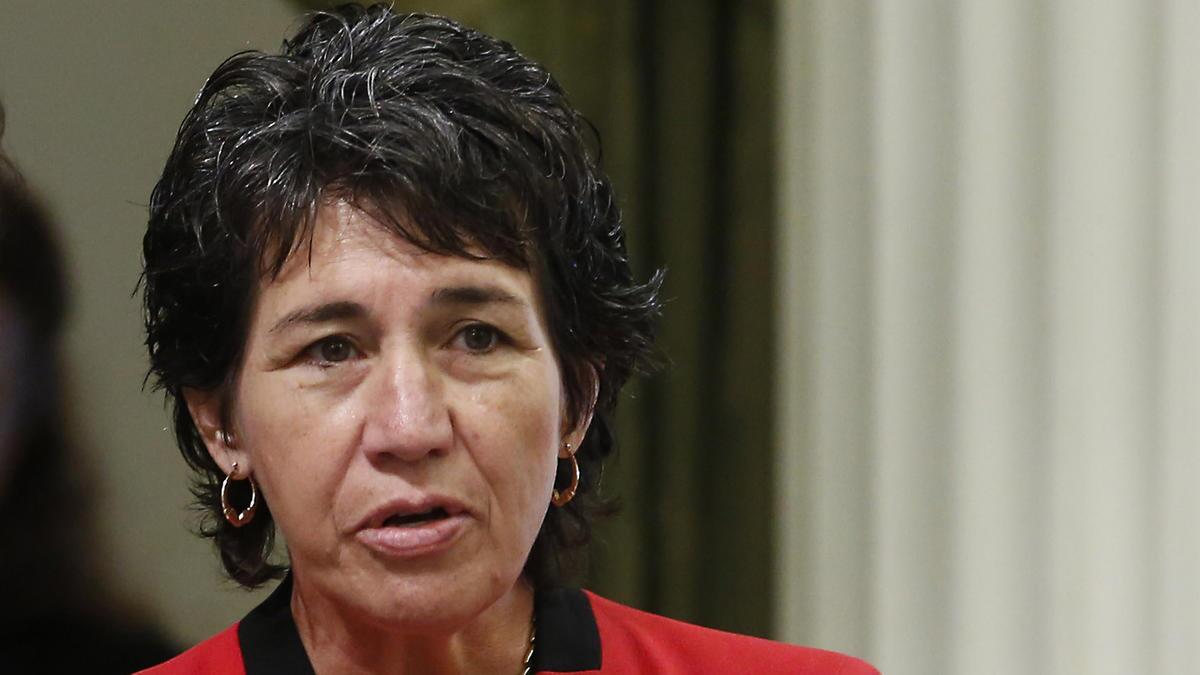
To tackle concerns about college affordability, a Democratic legislator is proposing to make public colleges and universities tuition-free for all Californians, and wants to tax millionaires to do it.
The measure, which echoes calls for tuition-free college by former presidential candidate Sen. Bernie Sanders (I-Vt.), is the latest in a flood of legislation that’s been introduced this year to address concerns about the rising cost of attending college.
The state’s 1960 Master Plan, which created a framework for higher education institutions, was meant to “make college affordable for everybody. That was going to be the California dream,” Assemblywoman Susan Talamantes Eggman (D-Stockton), the proposal’s author, said in an interview.
“Now we find ourselves in the position where that dream isn’t being fulfilled,” she said.
Eggman’s proposal would impose a 1% tax on incomes over $1 million to help pay for the approximate $2.2-billion price tag to cover tuition and fees for all in-state students in conjunction with existing aid.
“We know the very wealthy continue to control a huge amount of the state’s wealth, this country’s wealth, while the middle-class continues to get squeezed more and more,” Eggman said.
New taxes generally face a steep climb in the Legislature, where a two-thirds vote is required for passage. But Eggman said her bill, AB 1356, would also be coupled with a constitutional amendment that would put the tax before voters for ultimate approval.
Doing so, she said, ensures “a greater buy-in from the general public.”
A recent survey by the Public Policy Institute of California found that 68% of Democrats, 20% of Republicans and 42% of independents support increased taxes to pay for higher education.
Eggman’s tuition-free proposal takes a different approach from her colleagues, who unveiled a sweeping plan last week to make public colleges debt-free for nearly 400,000 students from families that make up to $150,000 per year. That measure aims to chip away at some of the associated costs of going to college, such as living expenses and textbooks.
Eggman said she envisions the two proposals complementing each other.
She also said she anticipates critiques her “clean sweep” plan to wipe tuition away for all Californians would benefit wealthy residents who don’t need such assistance.
People may say “‘millionaire’s kids might use it,’” Eggman said. “Well, they’re paying for it, too.”
- Share via
More than 130 bills take aim at California’s housing crisis
This year, California lawmakers are tackling more than 130 bills that aim to ease the state’s housing affordability crisis. One longtime Sacramento observer said this is the most attention legislators have paid to housing issues in three decades.
Highlights include a measure that would strip the state’s mortgage interest deduction from vacation-home owners and redirect the roughly $300 million a year saved to finance low-income housing. Other bills would increase spending on low-income housing development by billions of dollars and streamline some local permitting reviews.
- Share via
With Spanish still missing from the White House website, Rep. Lou Correa pushes for Spanish-language government websites
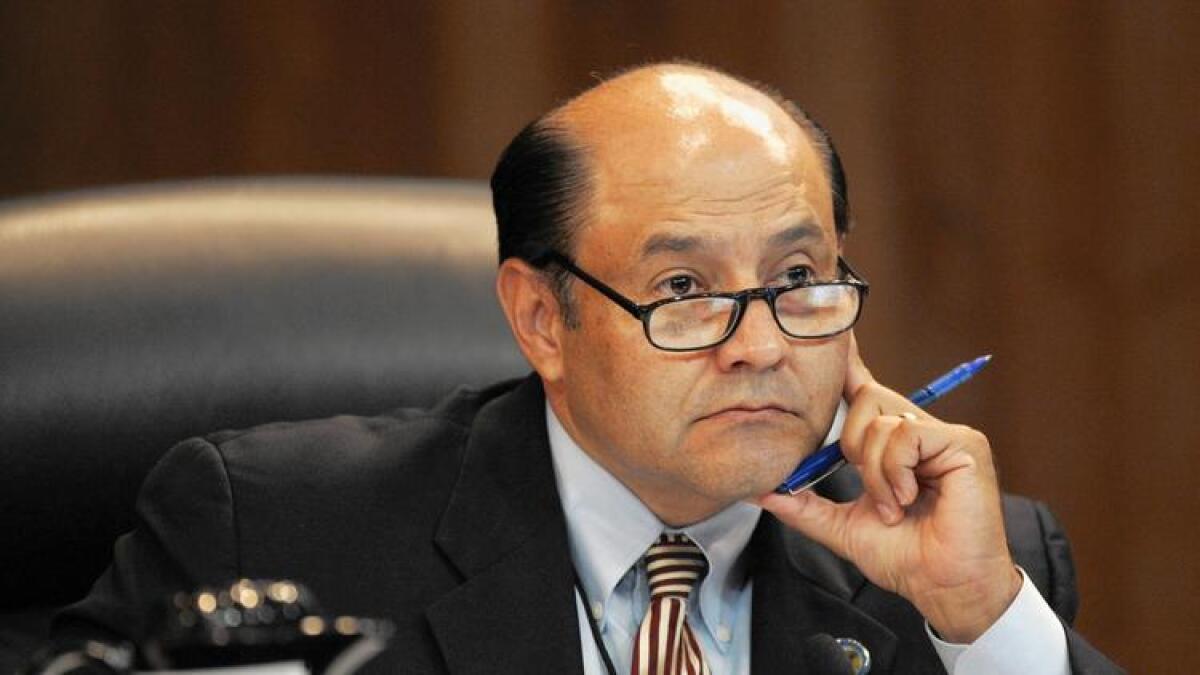
The day Donald Trump became president, the Spanish language translation of the White House’s website went down. An aide quickly said that Spanish version would return once the site was fully updated.
Nearly two months later, there is still no Spanish version of WhiteHouse.gov, and Rep. Lou Correa (D-Santa Ana) is turning to his colleagues in Congress for a fix.
Correa has filed legislation to require the White House and all federal agencies to provide a Spanish language version of their sites.
“It’s really just a matter of making government more transparent, more accountable, more effective for more people,” Correa told The Times. “At the end of the day it doesn’t matter what language you speak, you’re ultimately still a taxpayer.”
Correa represents California’s 46th Congressional District, where more than half of residents speak Spanish at home, according to the U.S. Census Bureau’s 2015 American Community Survey.
He said the bill could be expanded to include other languages.
Correa began asking the White House to restore the Spanish version of the White House site shortly after it went down and has received no response, he said.
“I look at it as a public policy decision that the White House has made,” he said. “You don’t need to take the darn thing down, you just leave it up, it was a public policy decision to take it down. Based on why, I’m not going to speculate.”
The day after the page came down in January, White House Director of Media Affairs Helen Aguirre Ferre said it would be rebuilt and removing the Spanish translation was not deliberate.
On Friday she said they are still still rebuilding the English language version of the site and “will also build a Spanish language one as well.” She said there was no promise to restore it quickly.
In the meantime, she directed people to a Twitter account, @LaCasaBlanca, which publishes tweets in Spanish and English.
Spanish language versions of department and agency websites popped up after President Clinton signed an executive order in 2000 that required federal agencies to provide for people with limited English proficiency. A Department of Justice guideline issued with the order states that federally funded agencies have to make information available either in text or audio to people who don’t speak or read English well.
The order led to the creation of GobiernoUSA.gov, the Spanish language portal to government websites, but most of the major federal departments still provide spotty language access to their sites.
The websites for Housing and Urban Development, the Justice Department, the Transportation Department and the Labor Department all have links prominently displayed on their homepage directing people to a Spanish translation.
The Education and Health and Human Services departments direct those who want a translation to call a phone number for assistance. Others have translations, but they are hard to find. Seven departments have no translation and no indications of whether a translator is available to help.